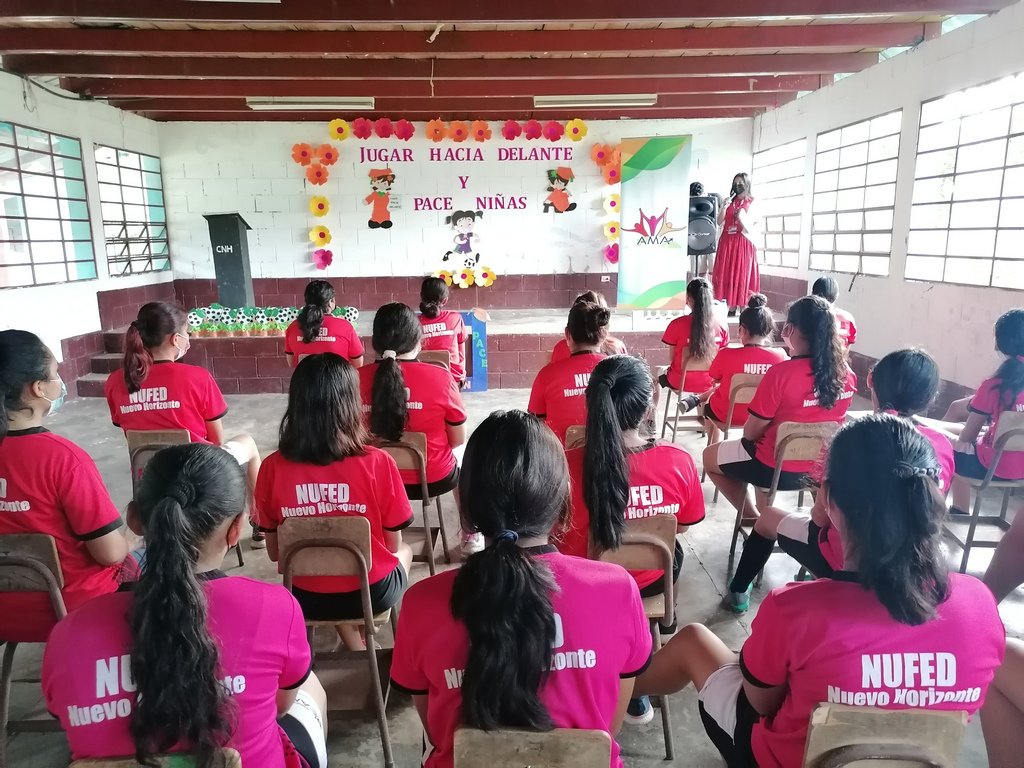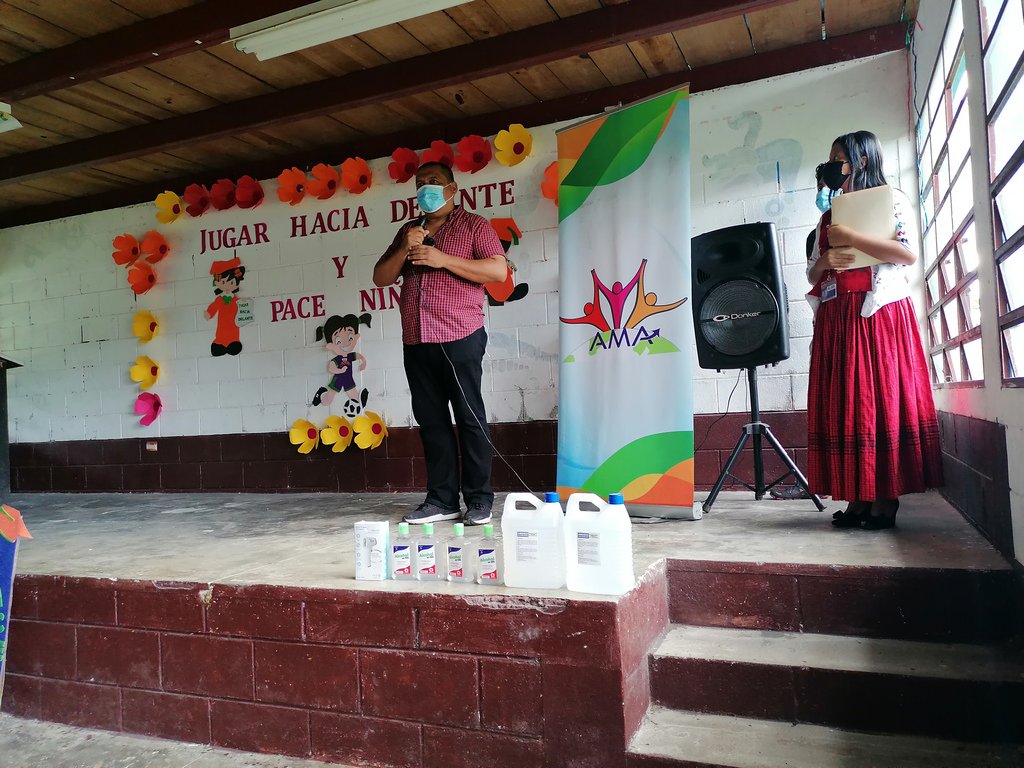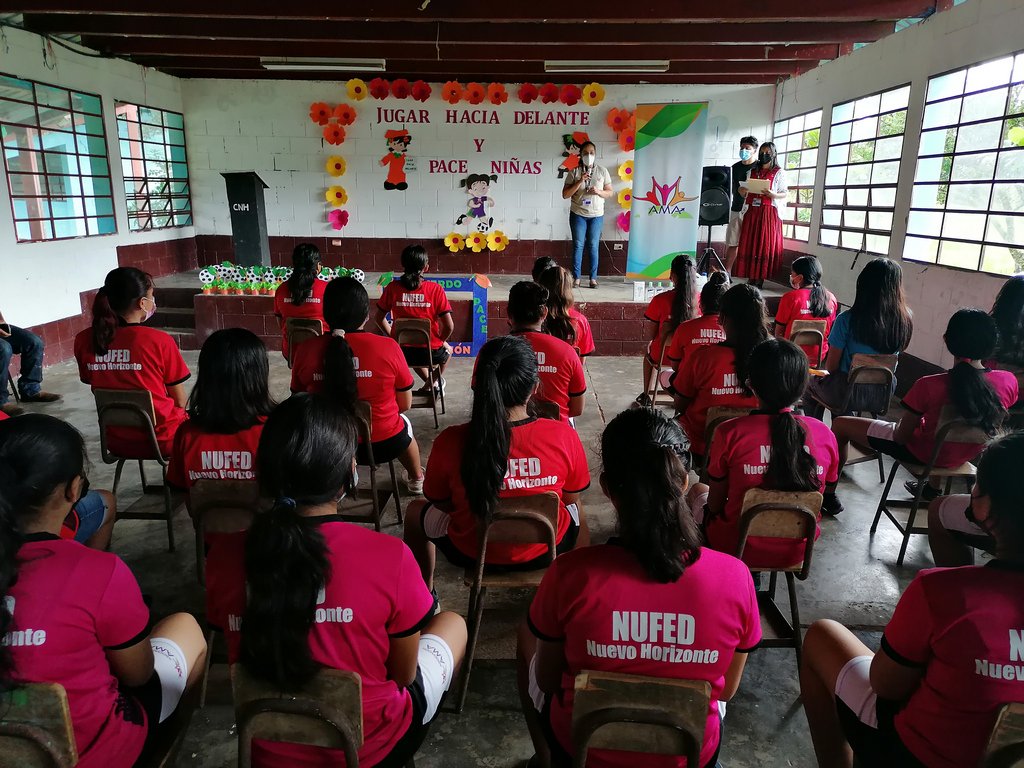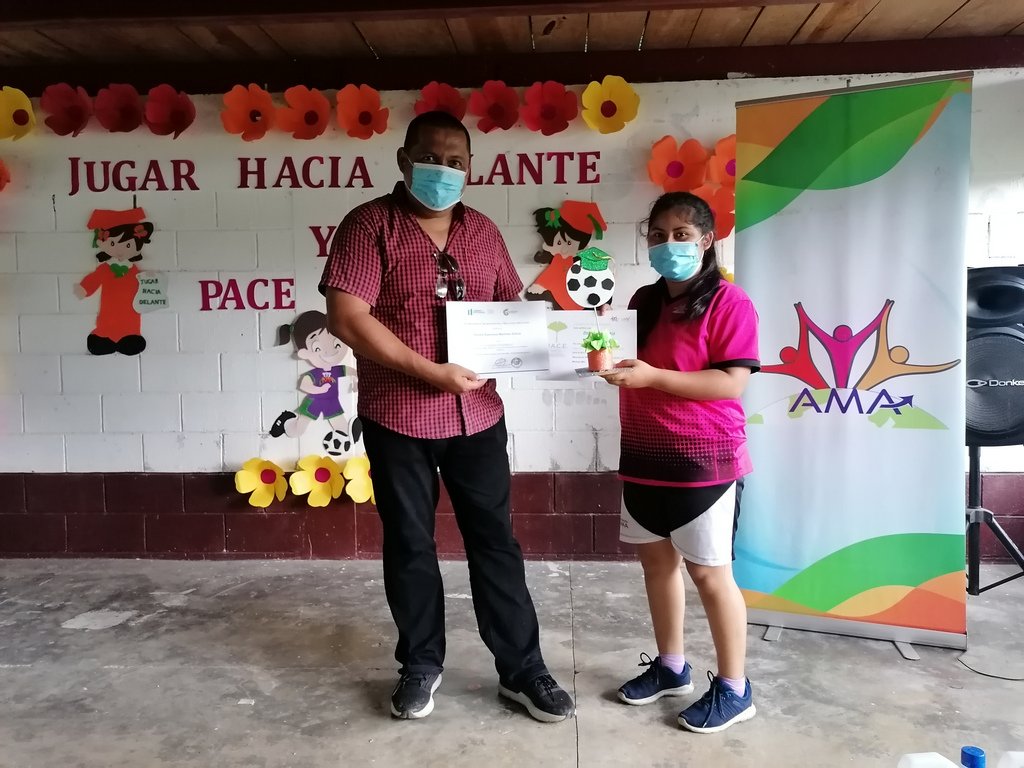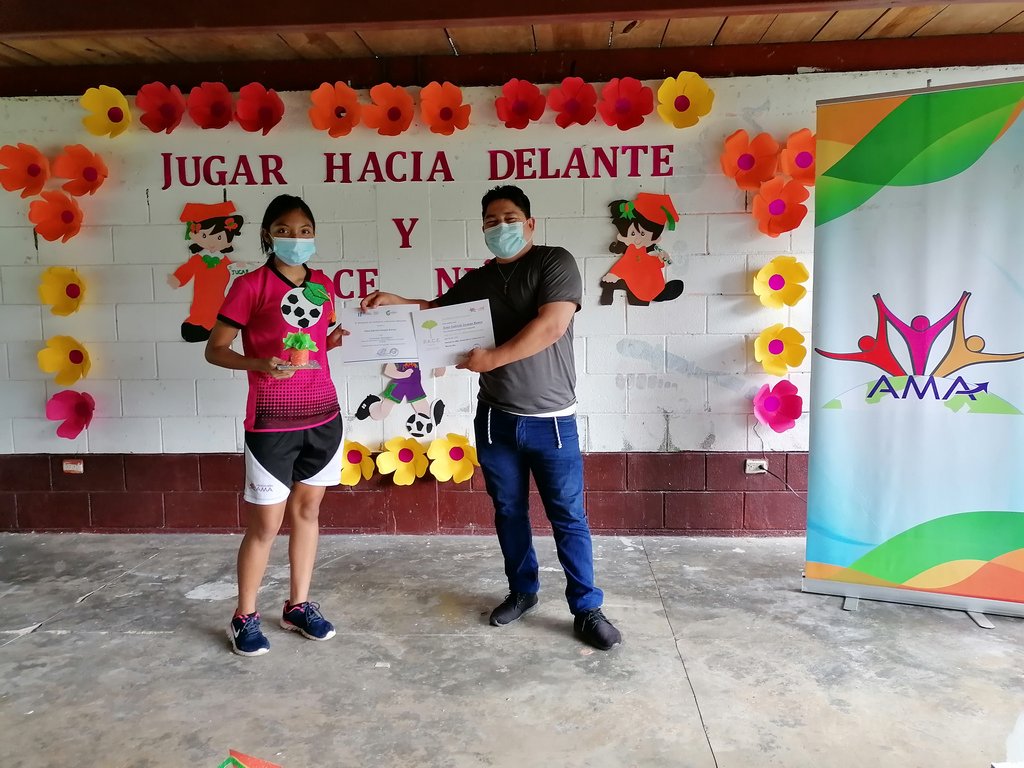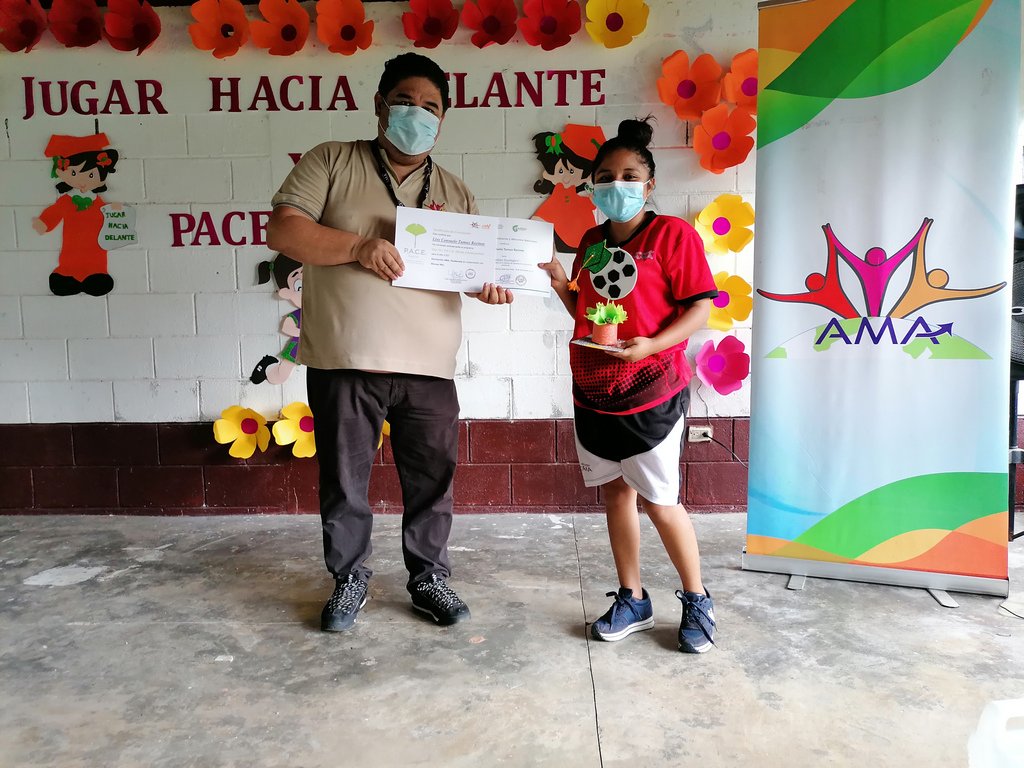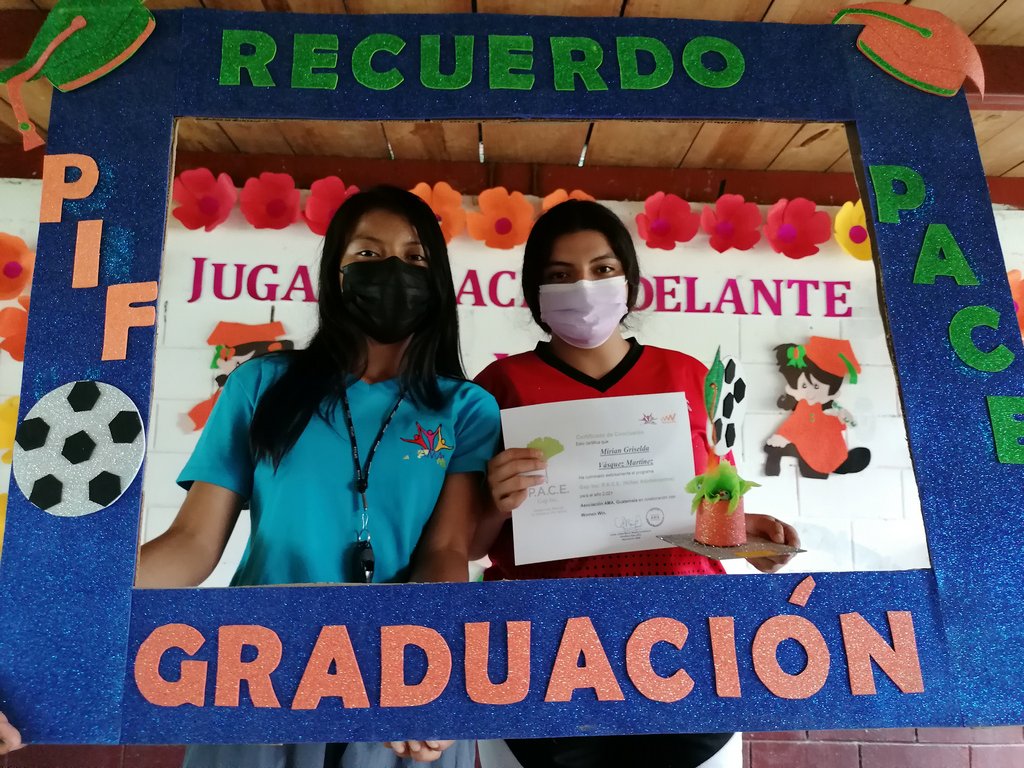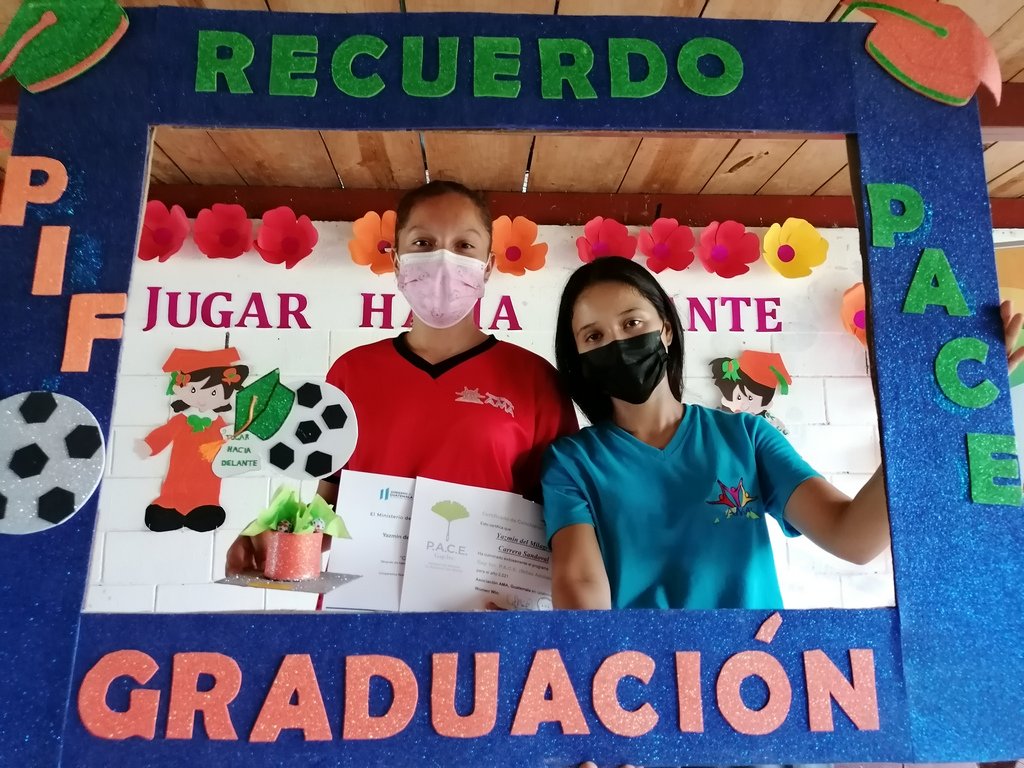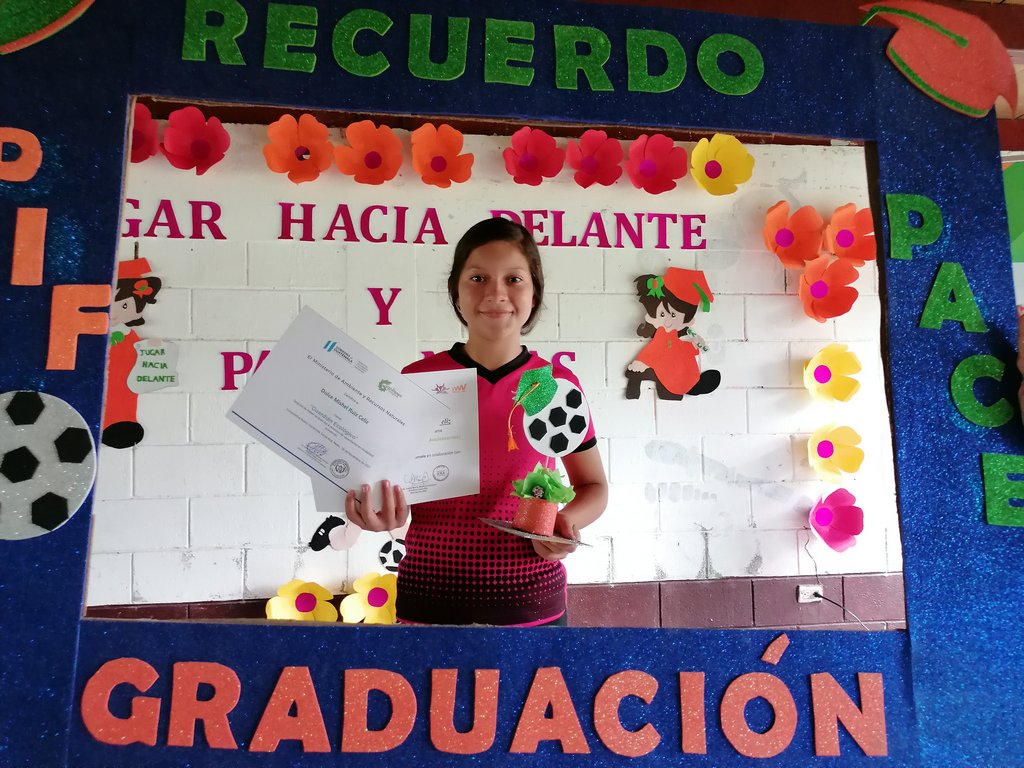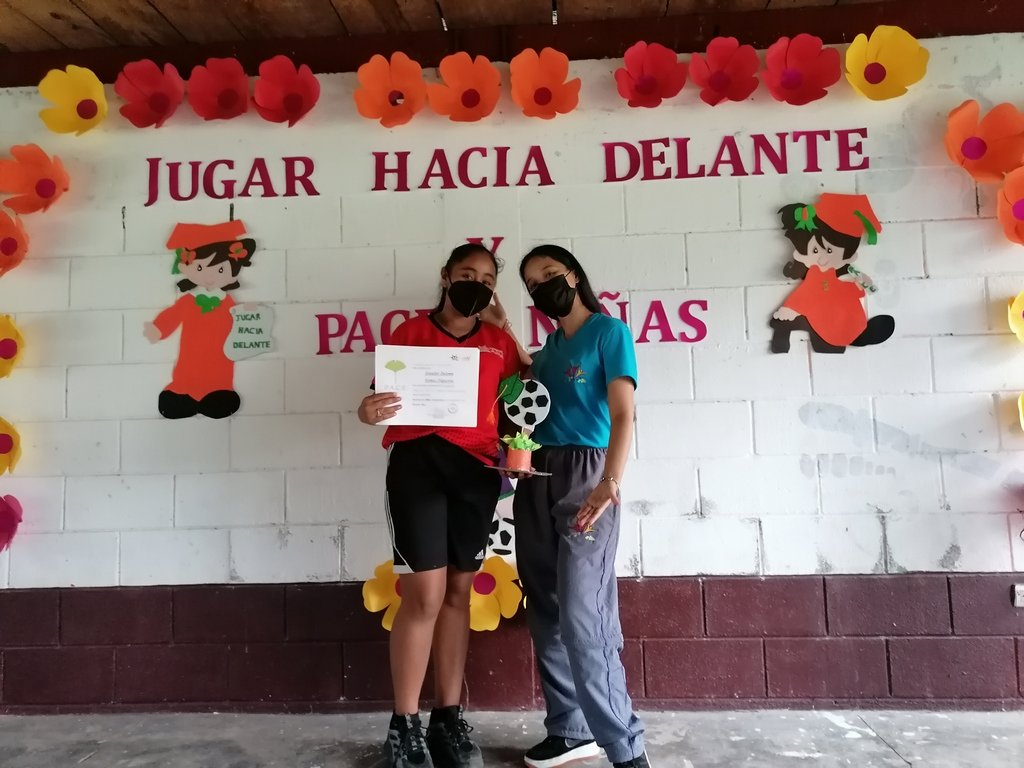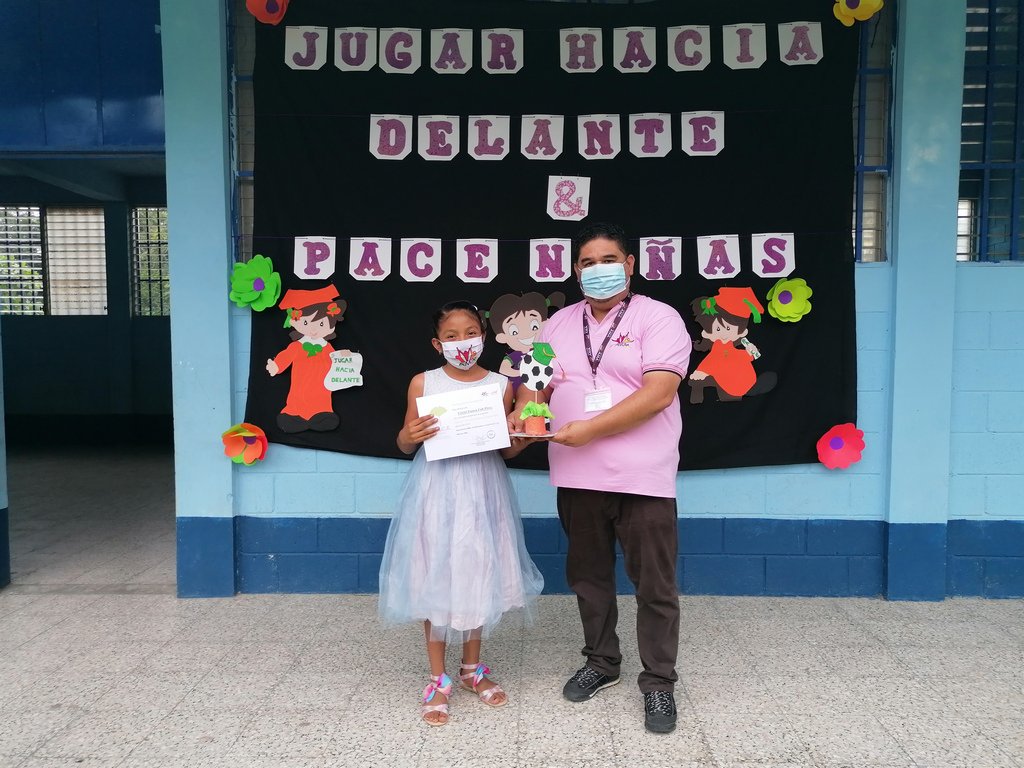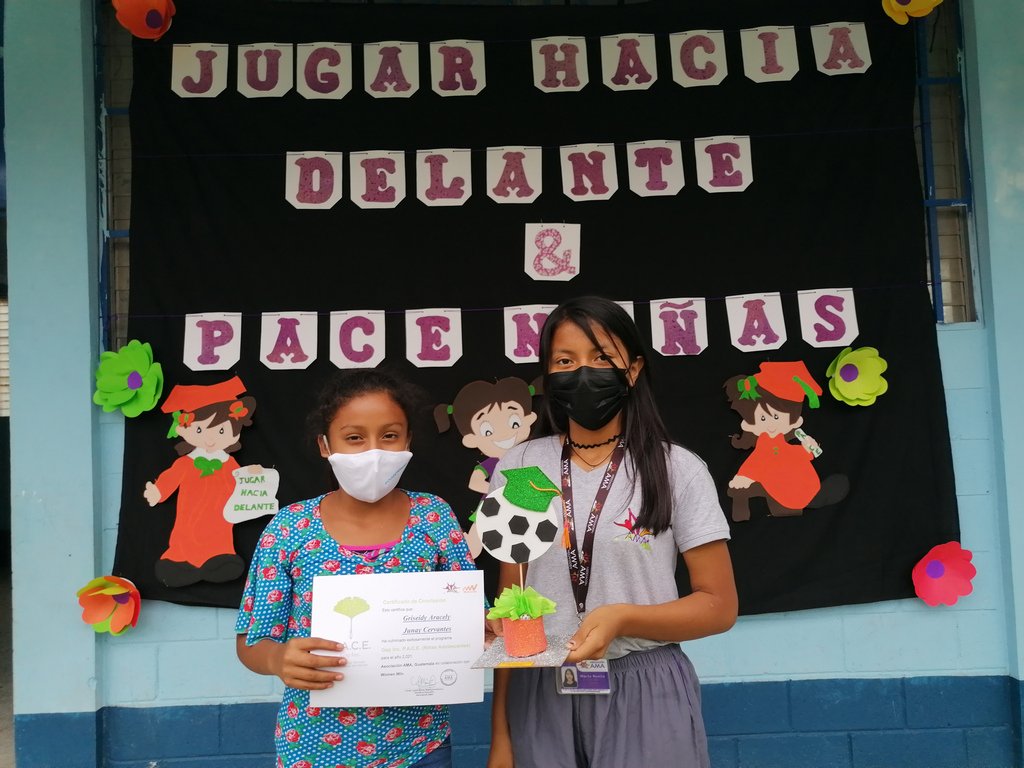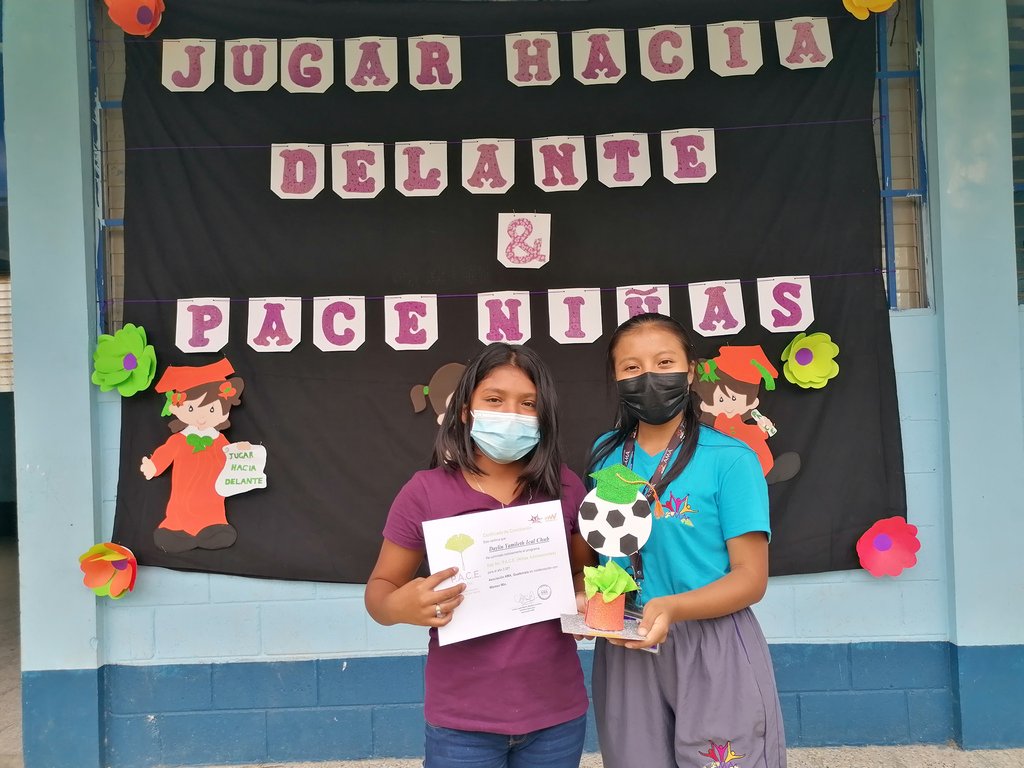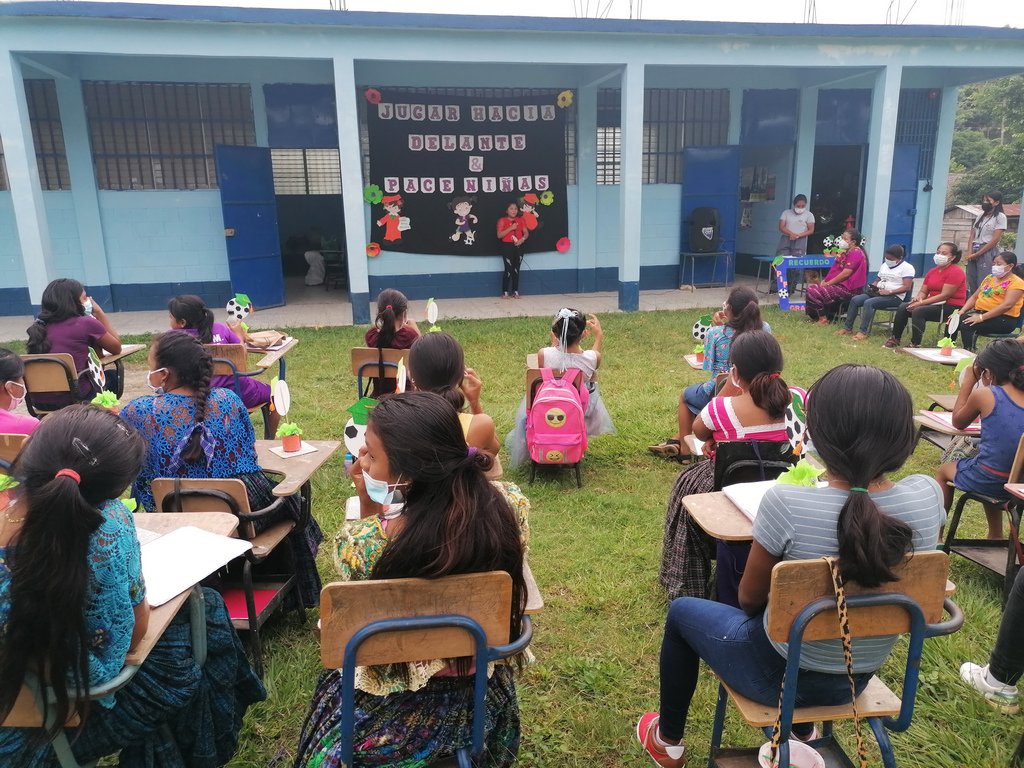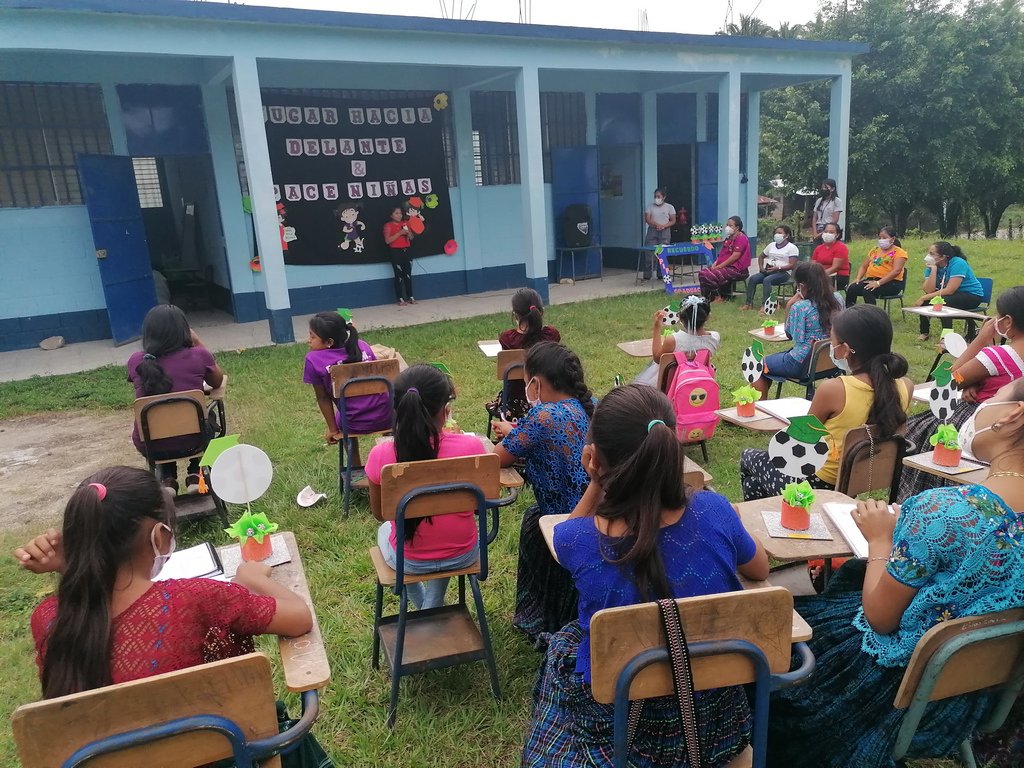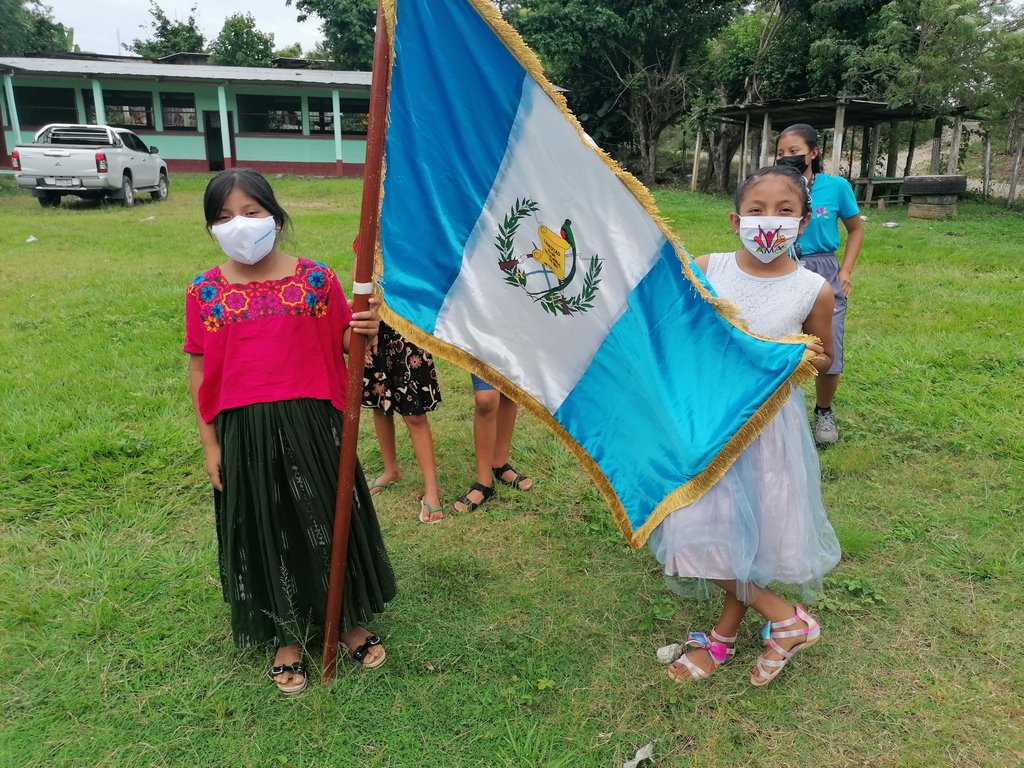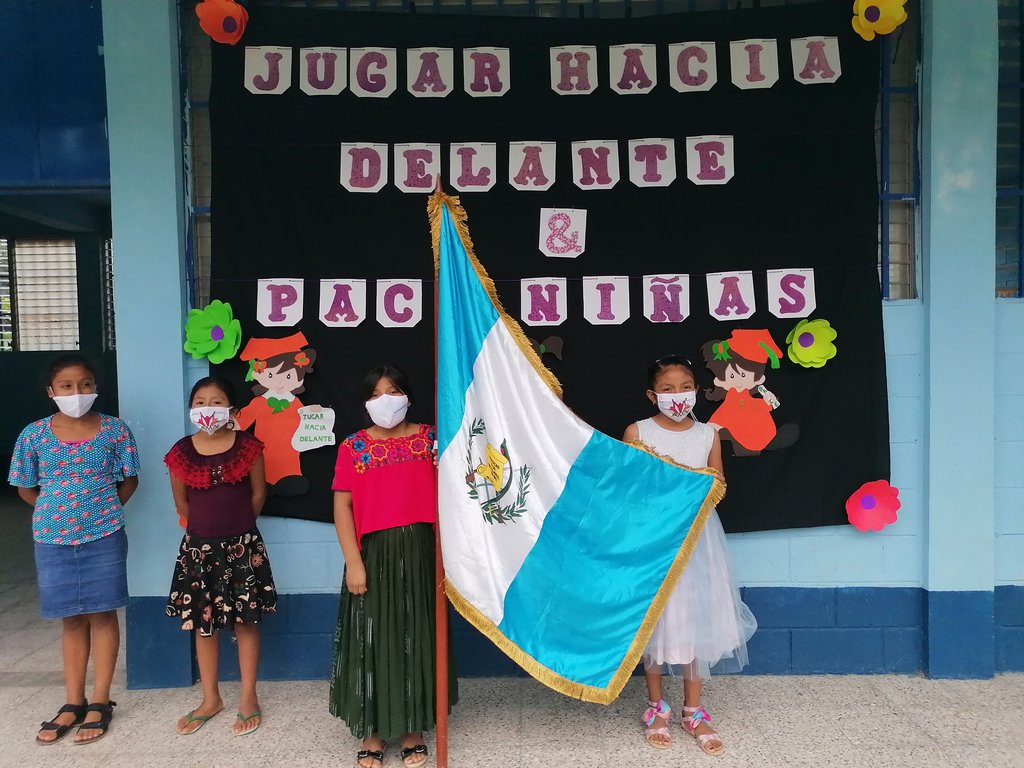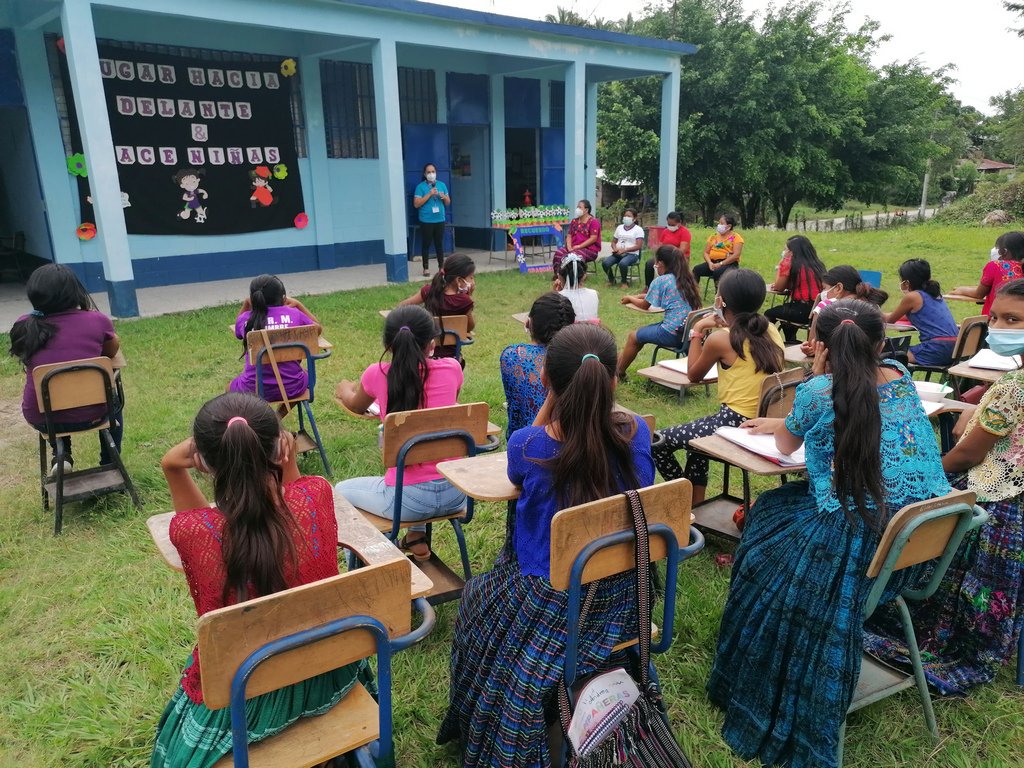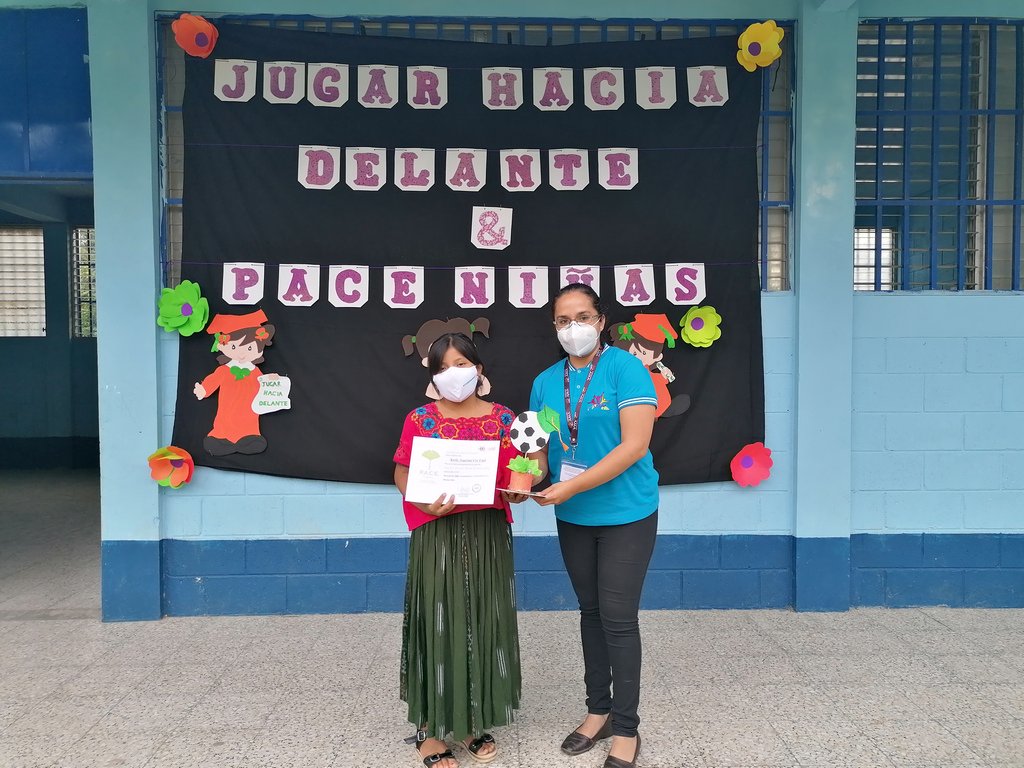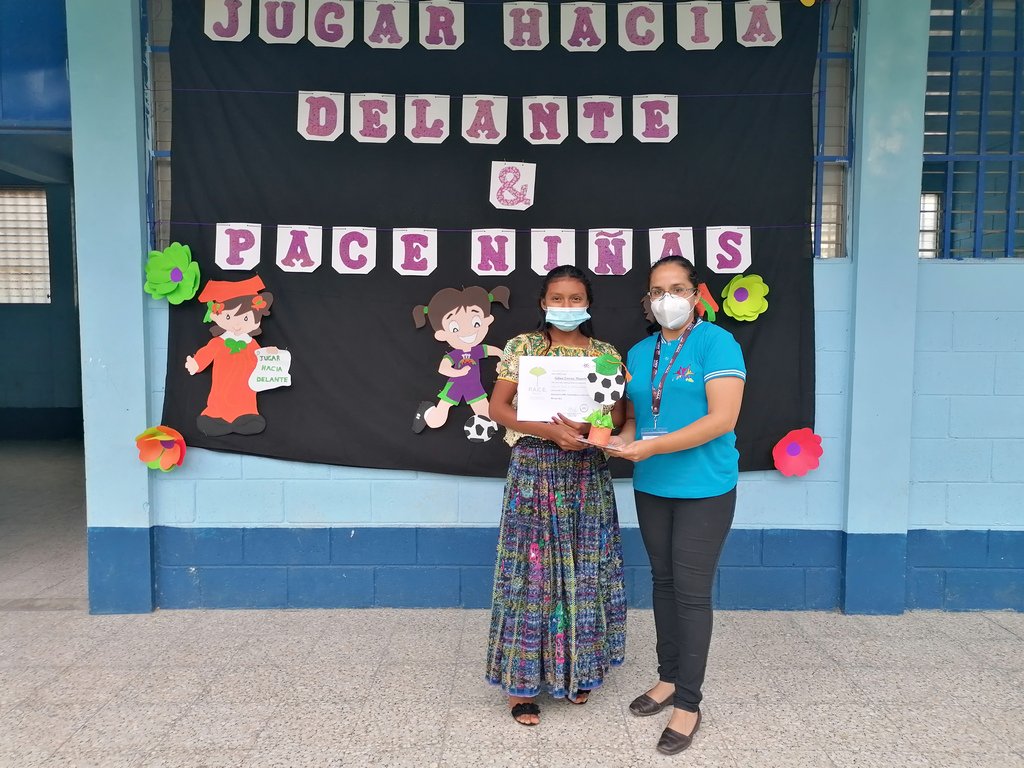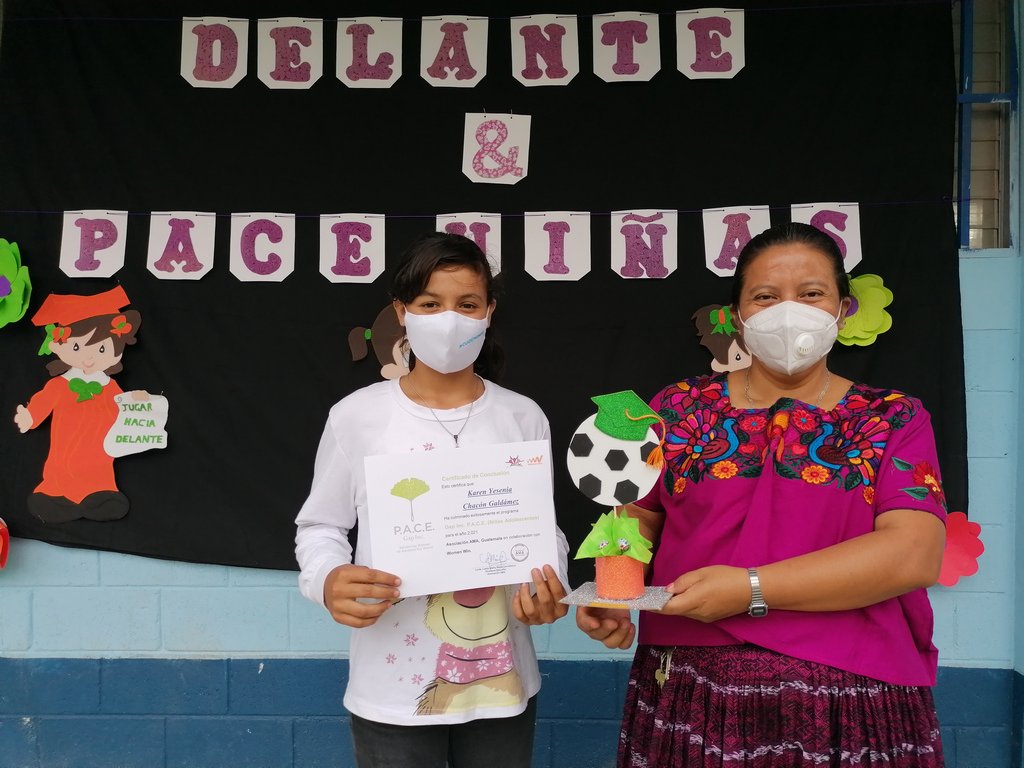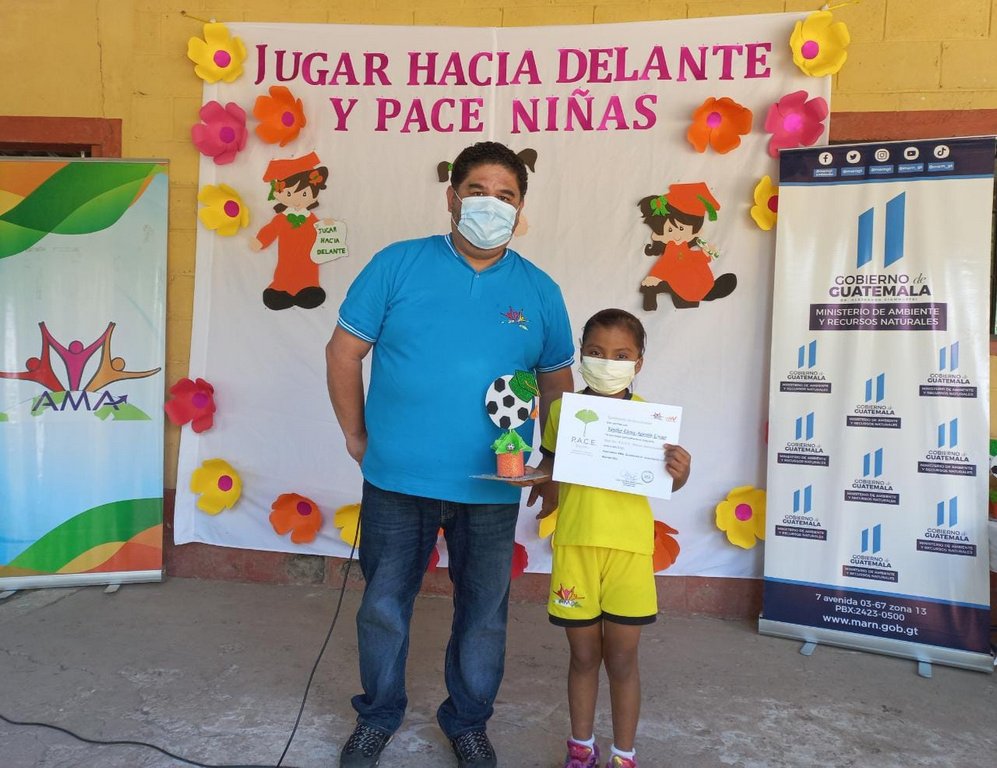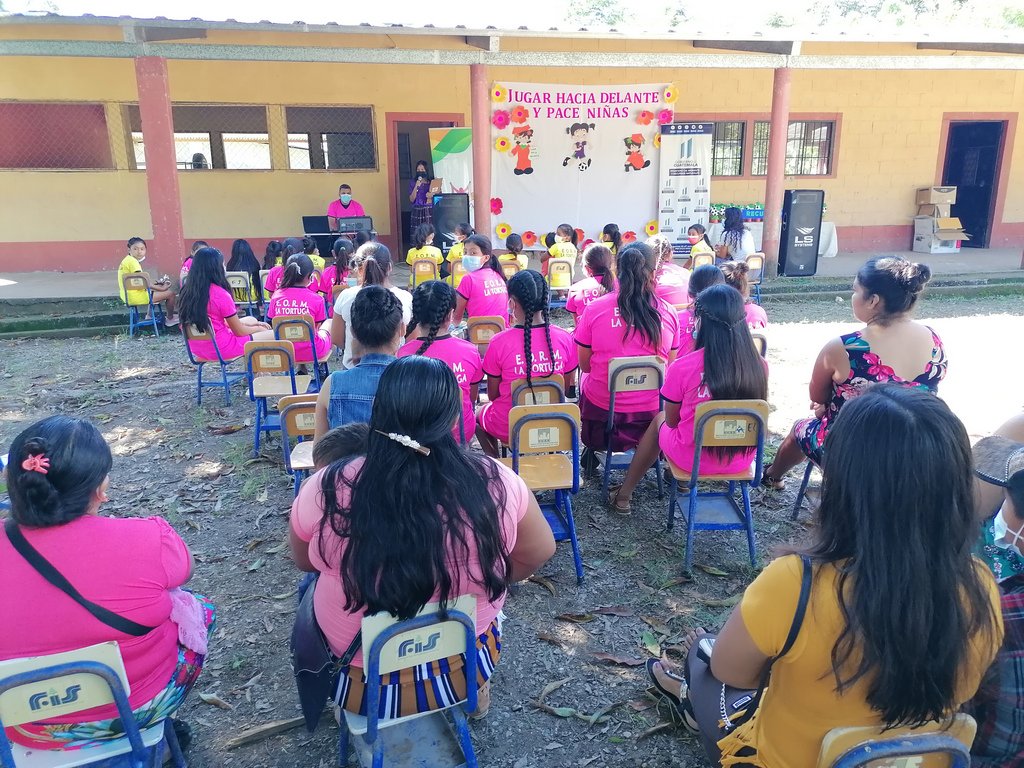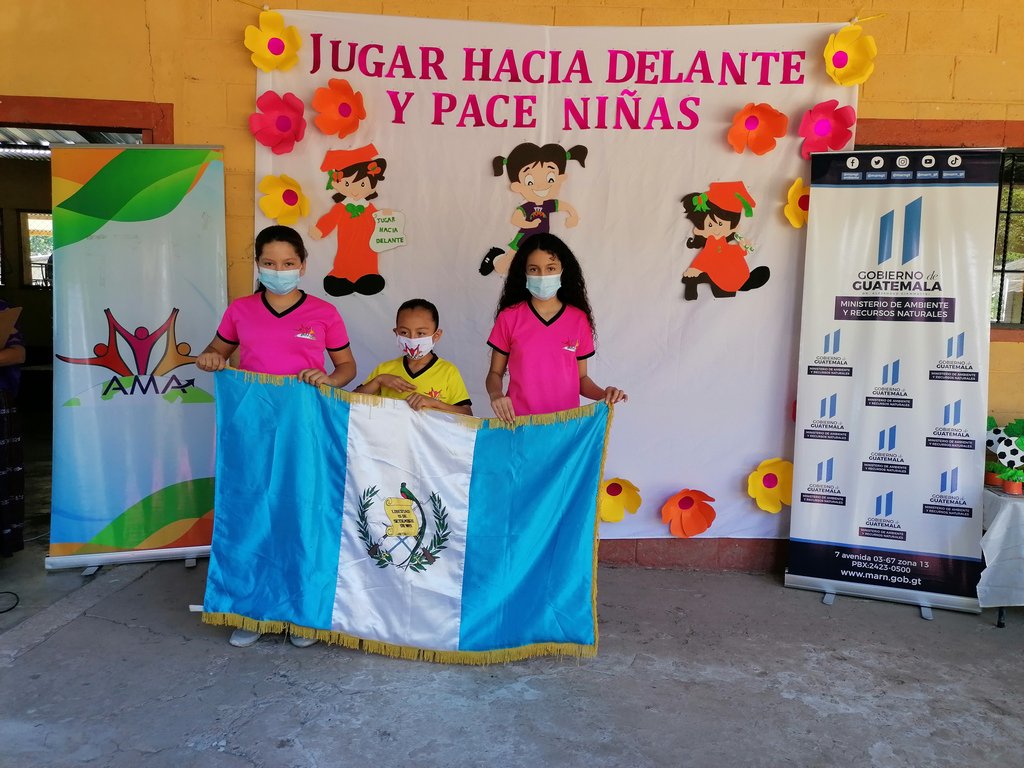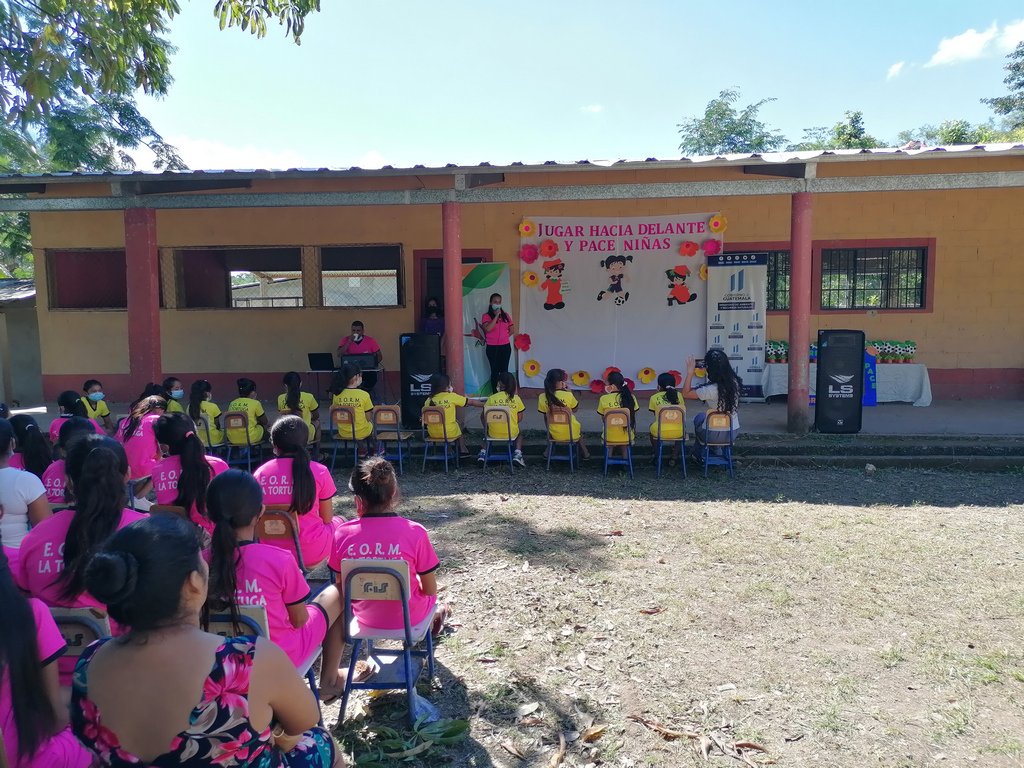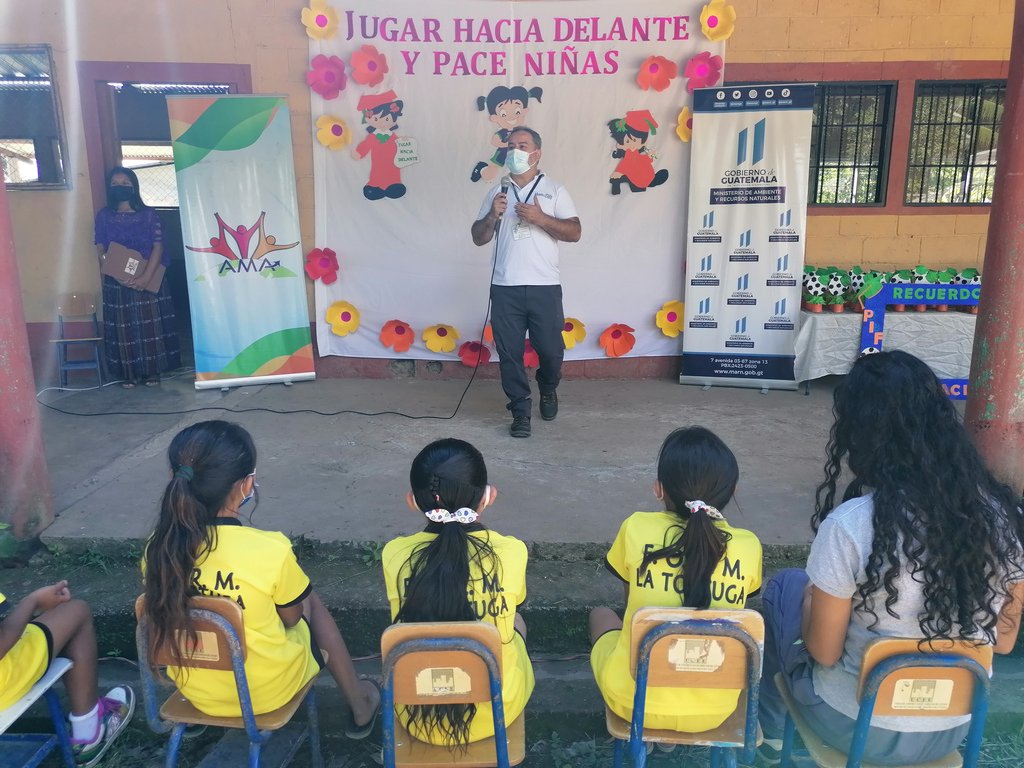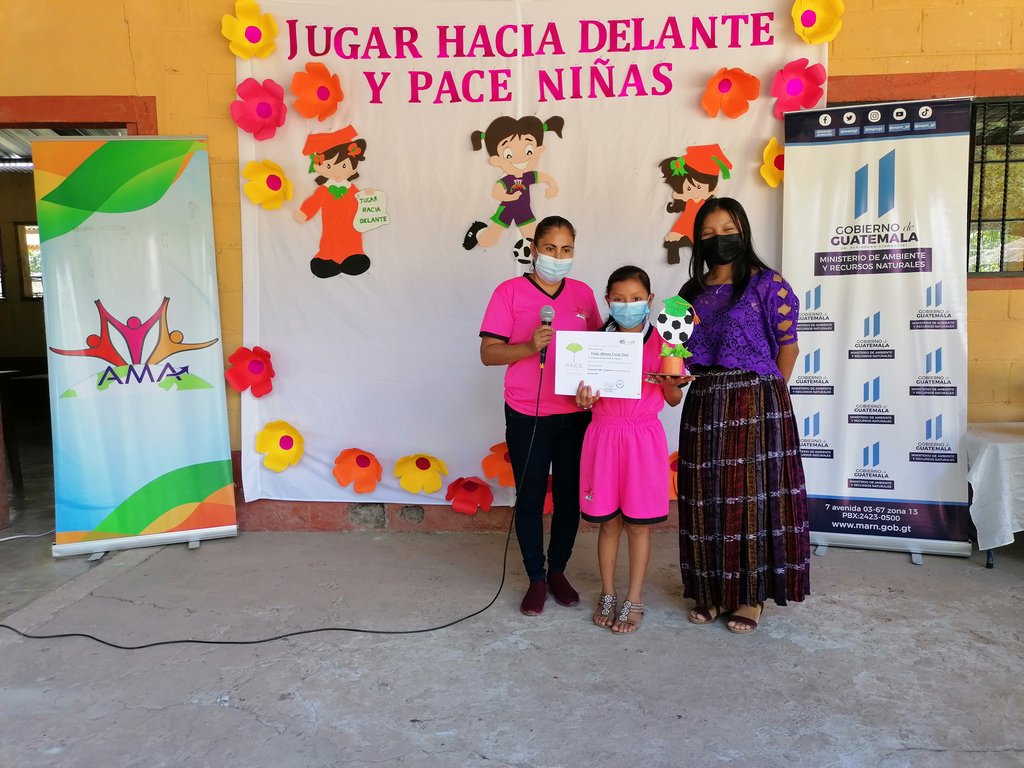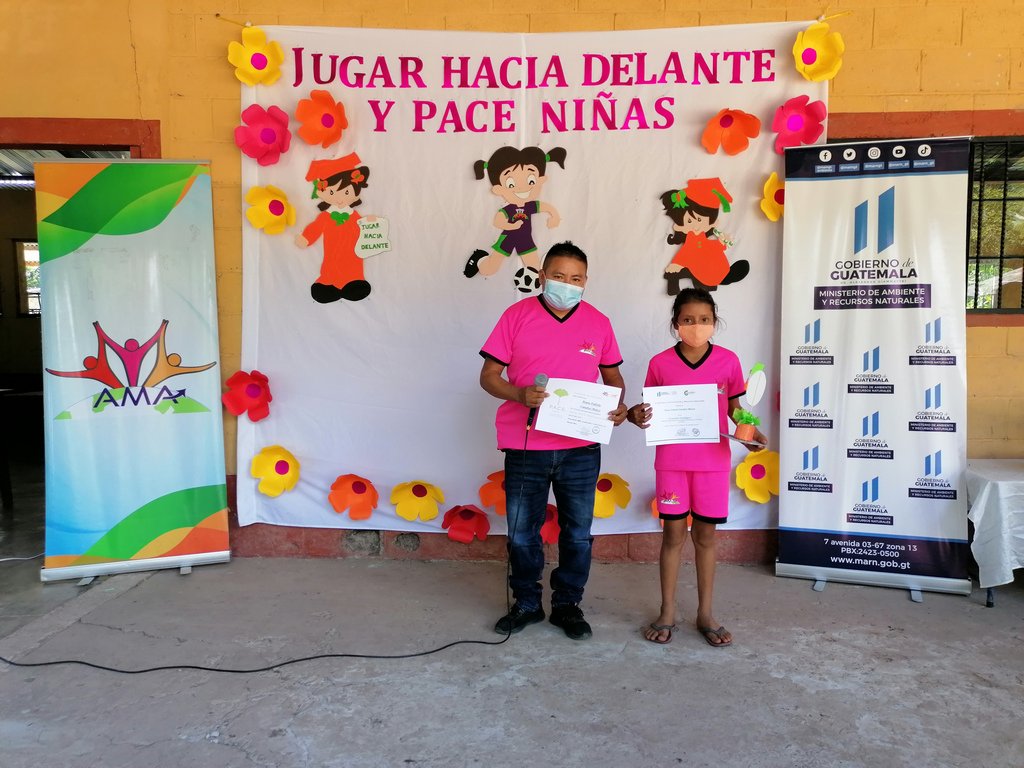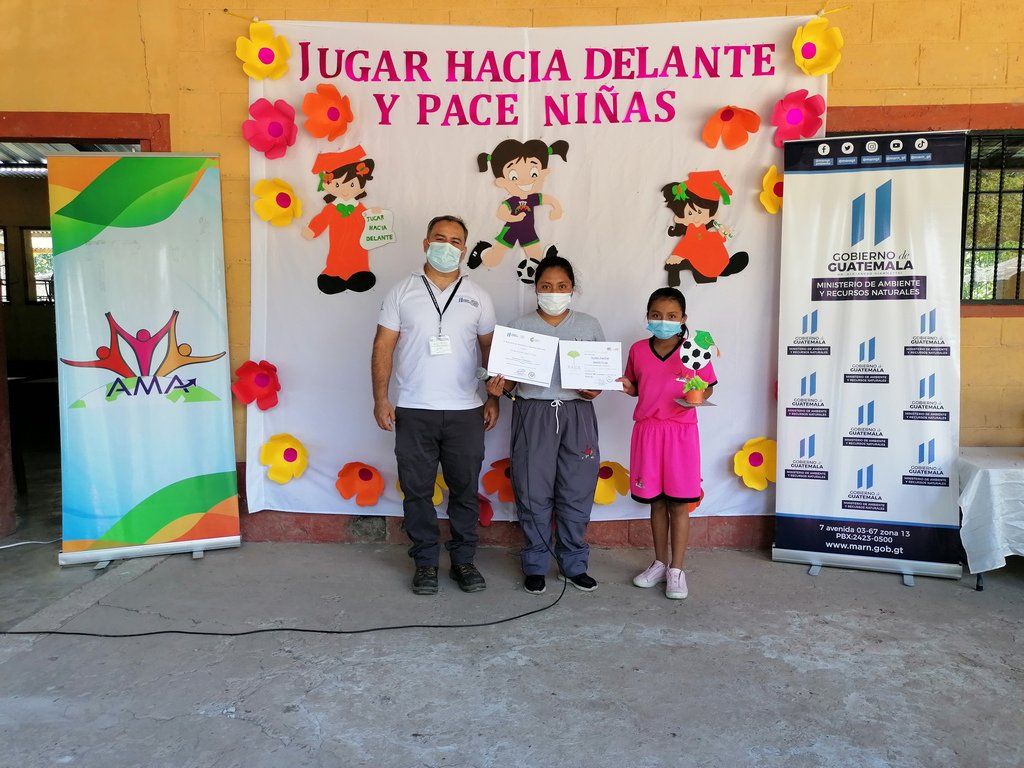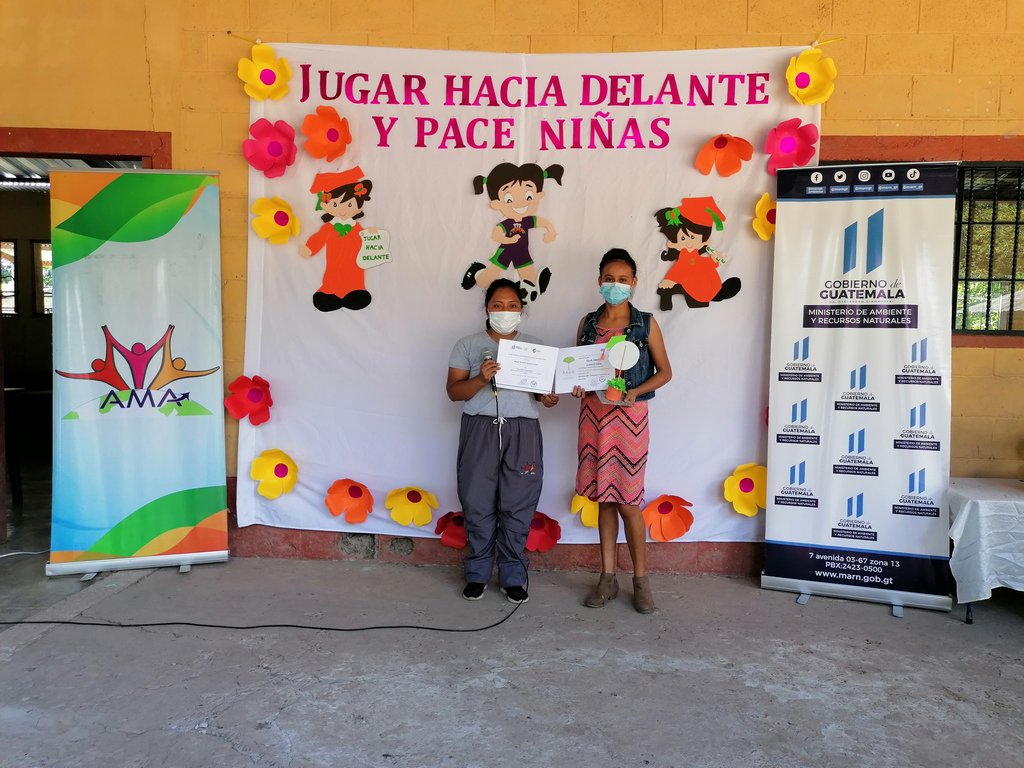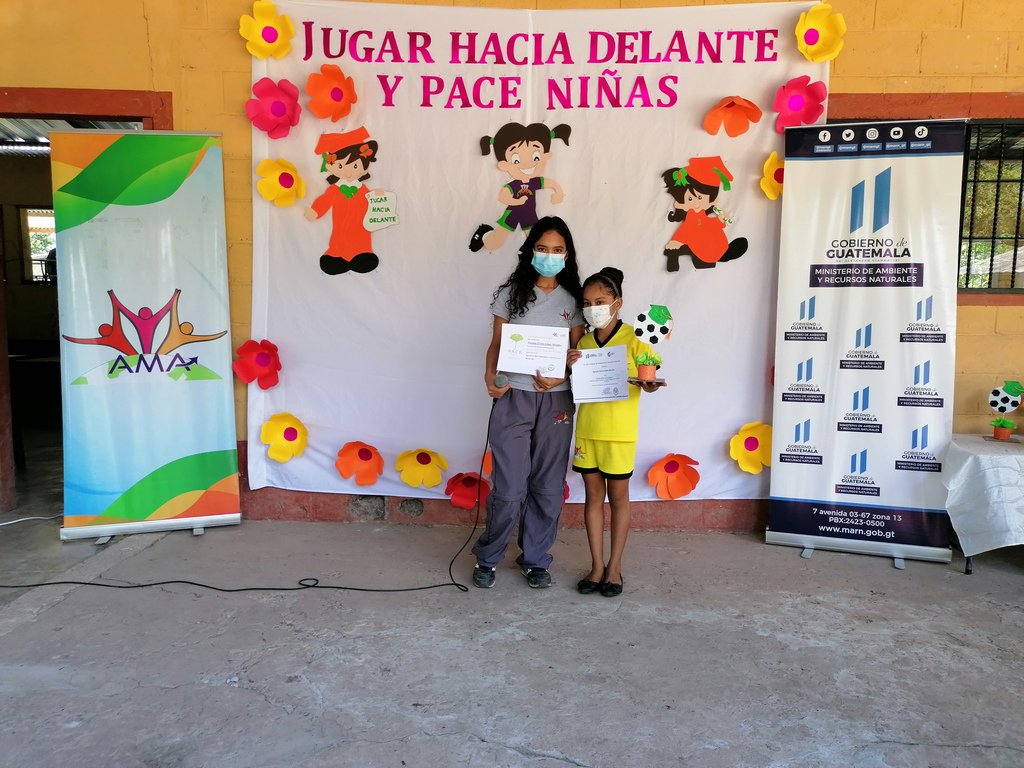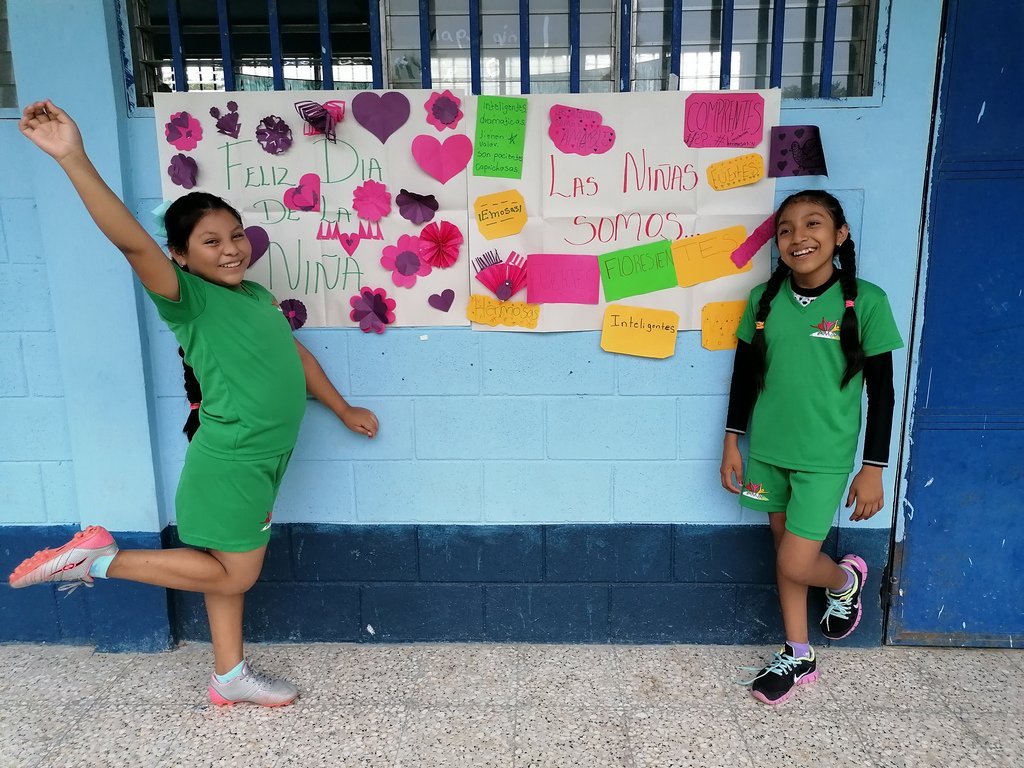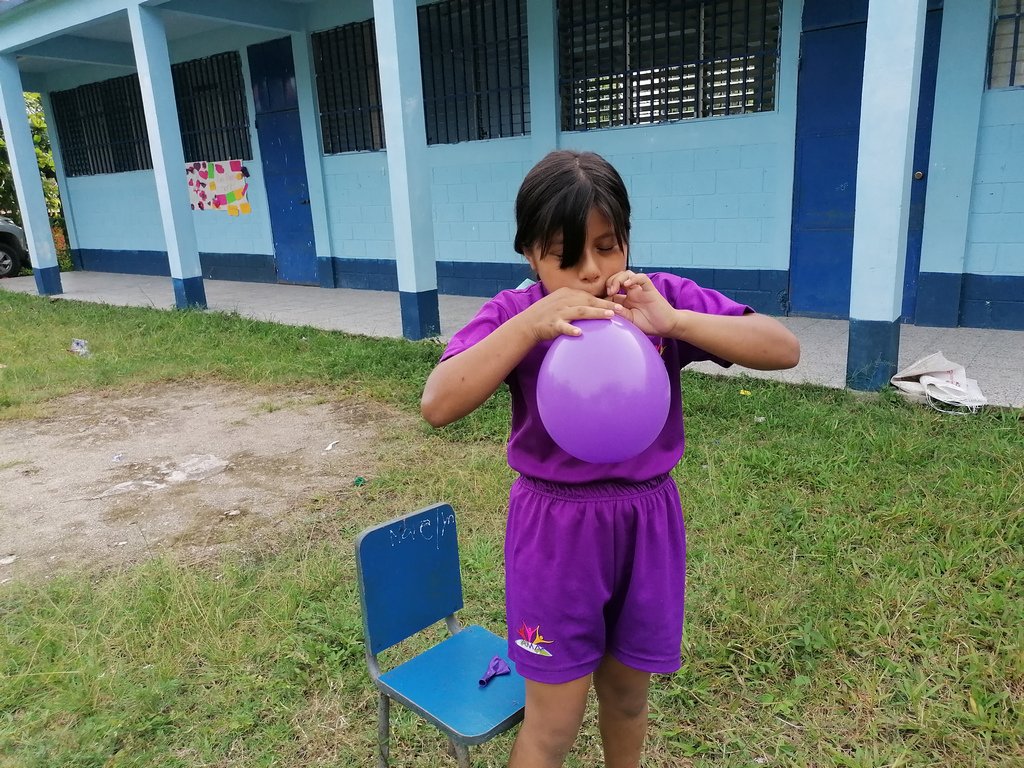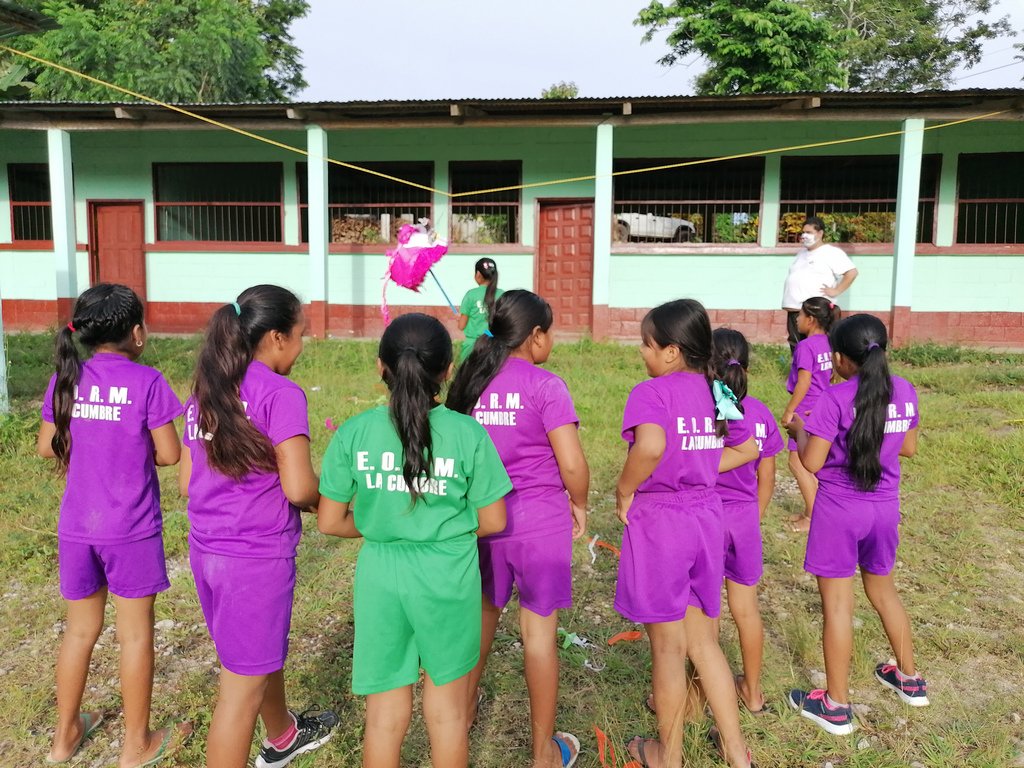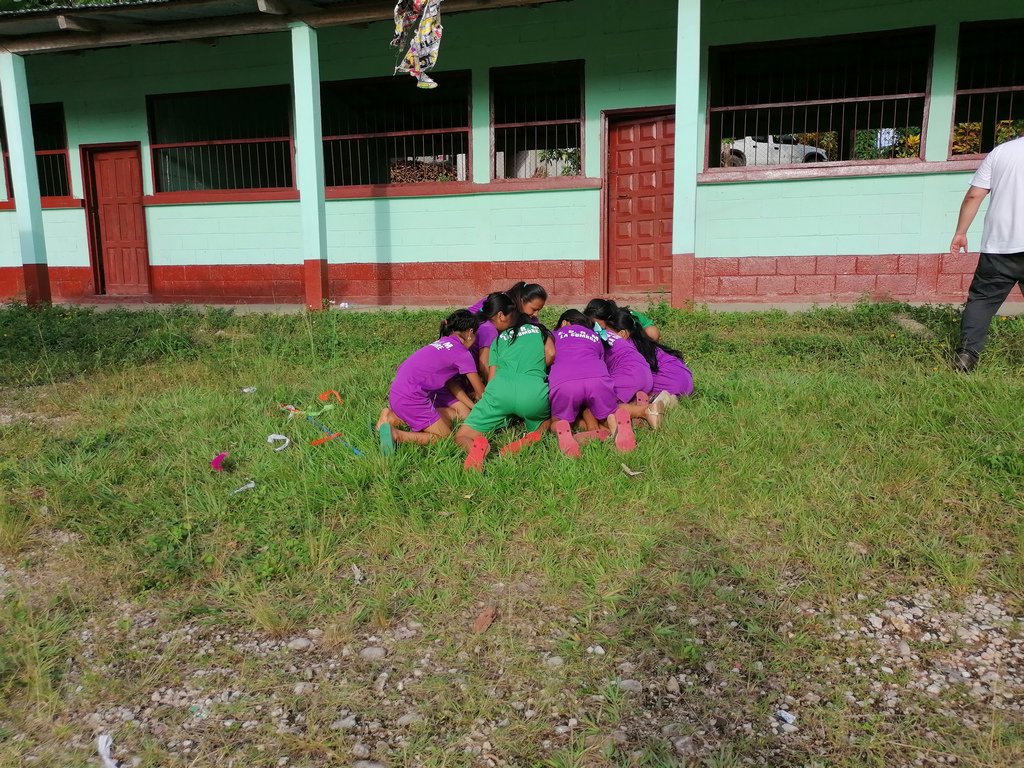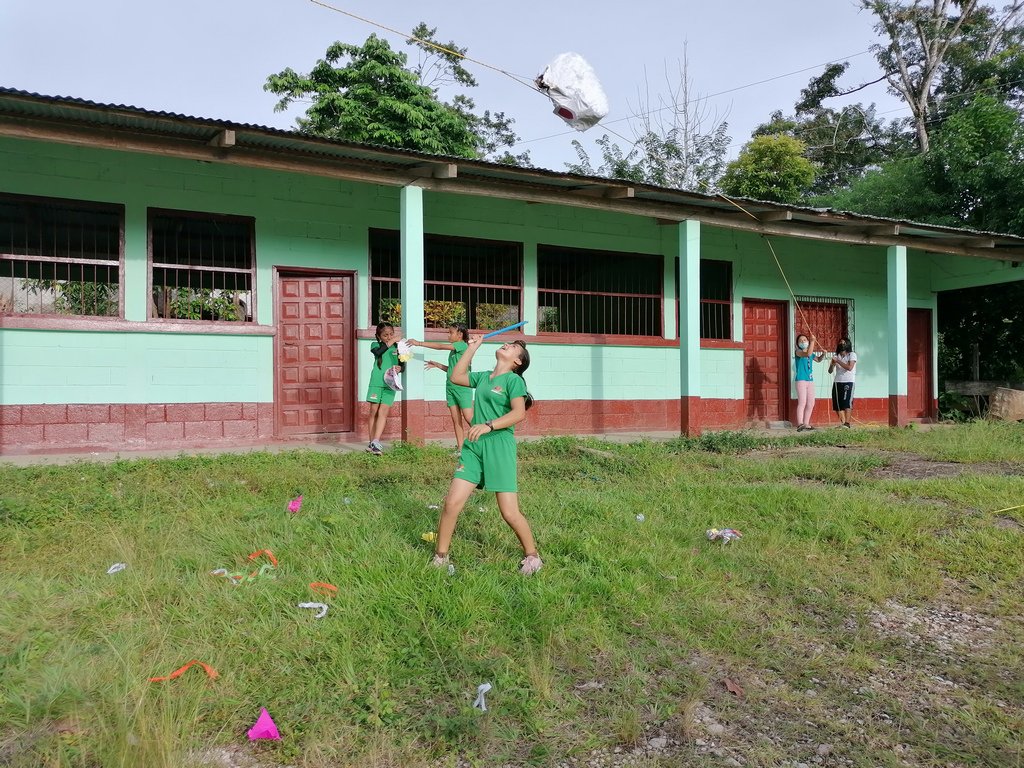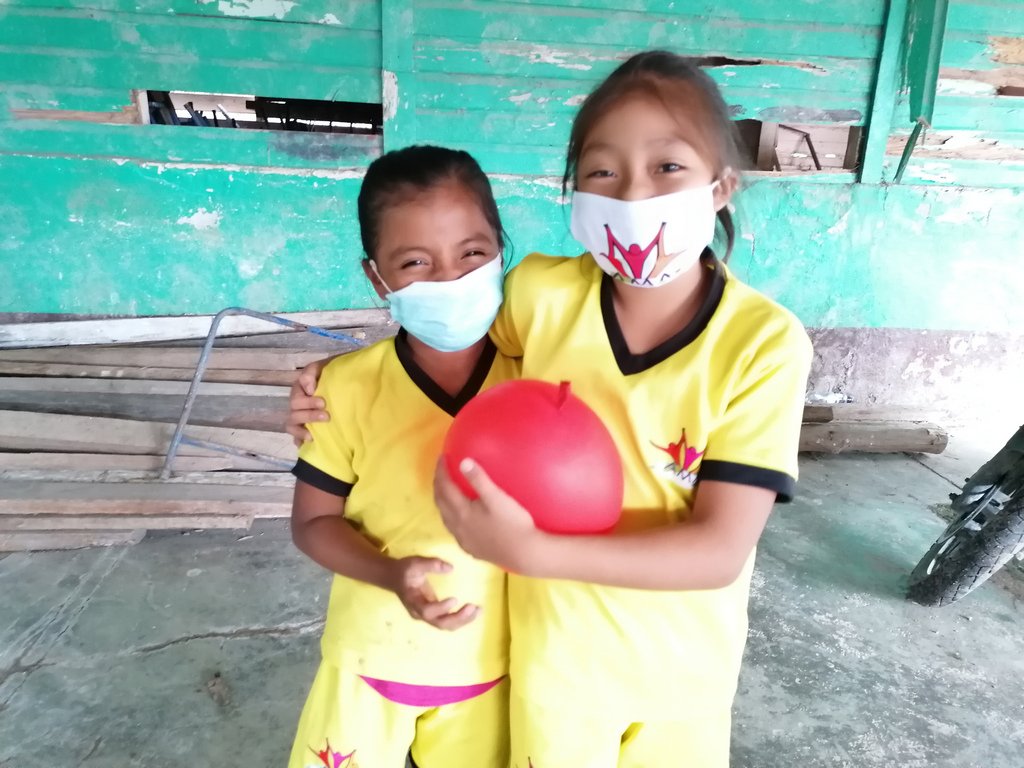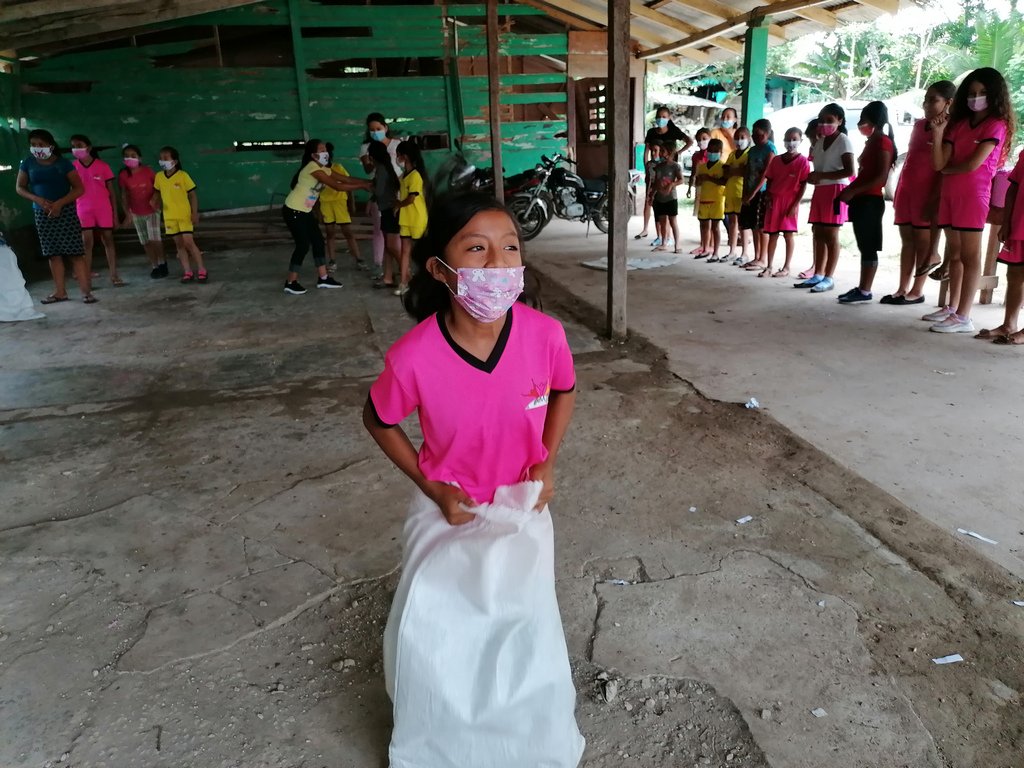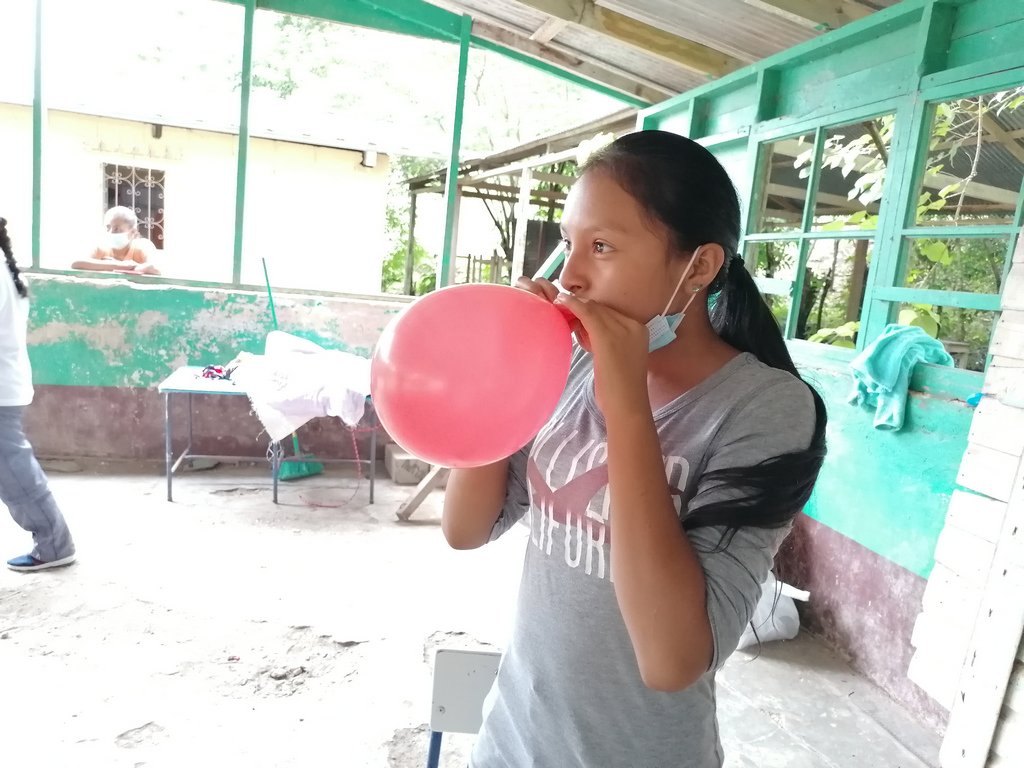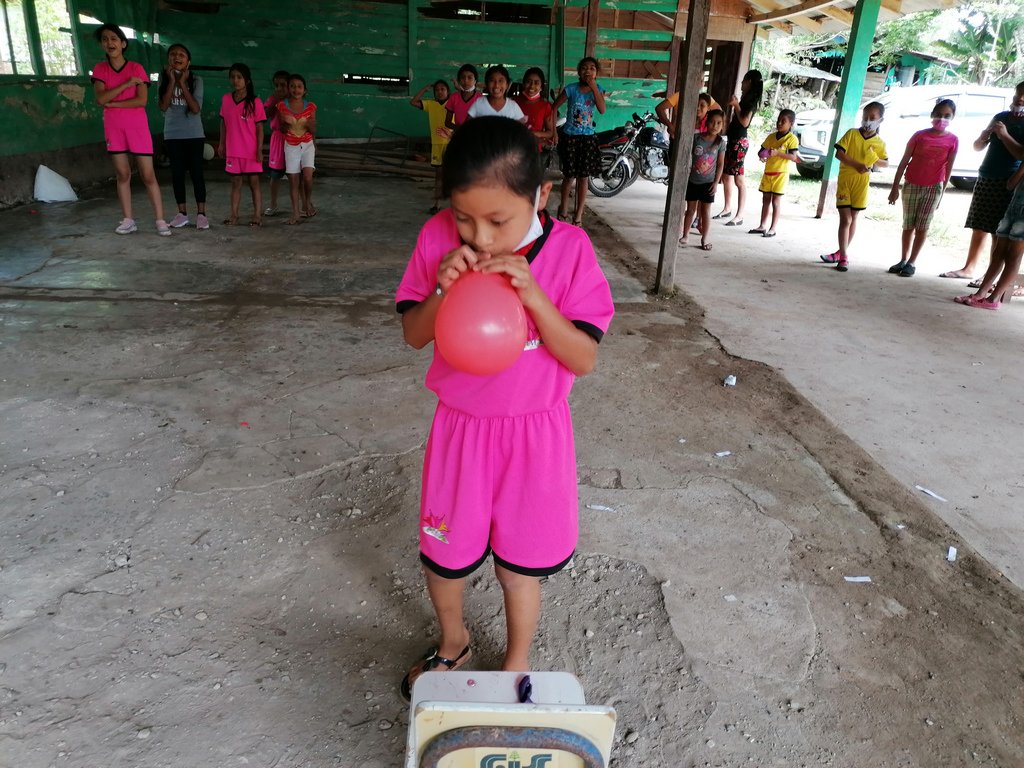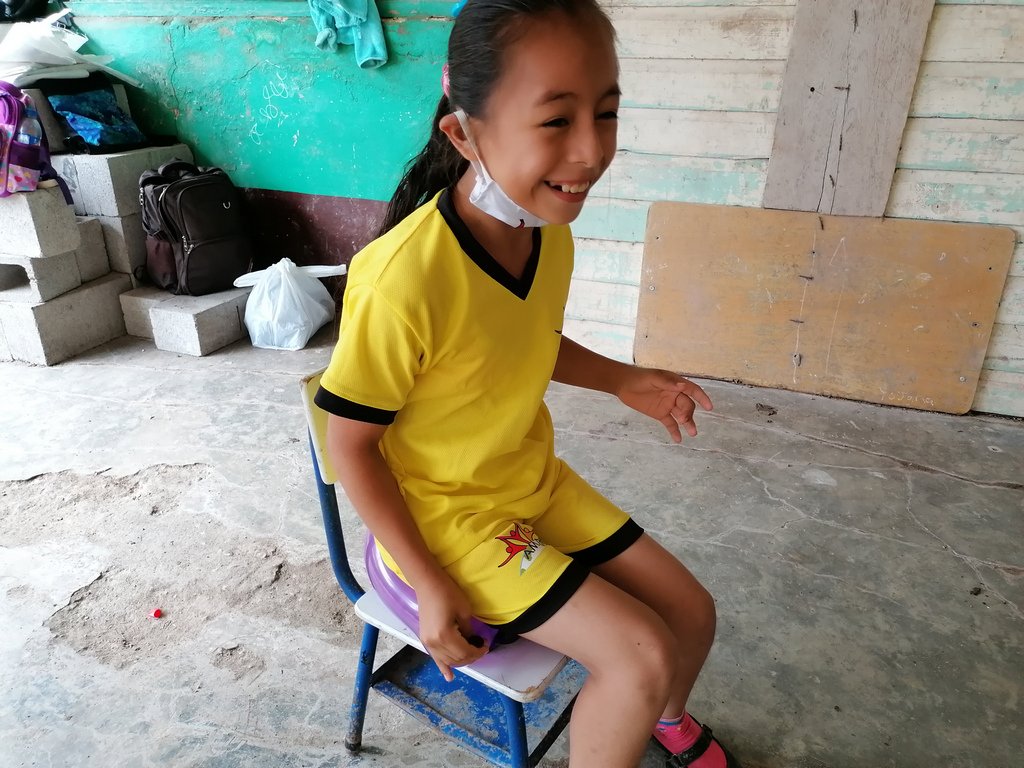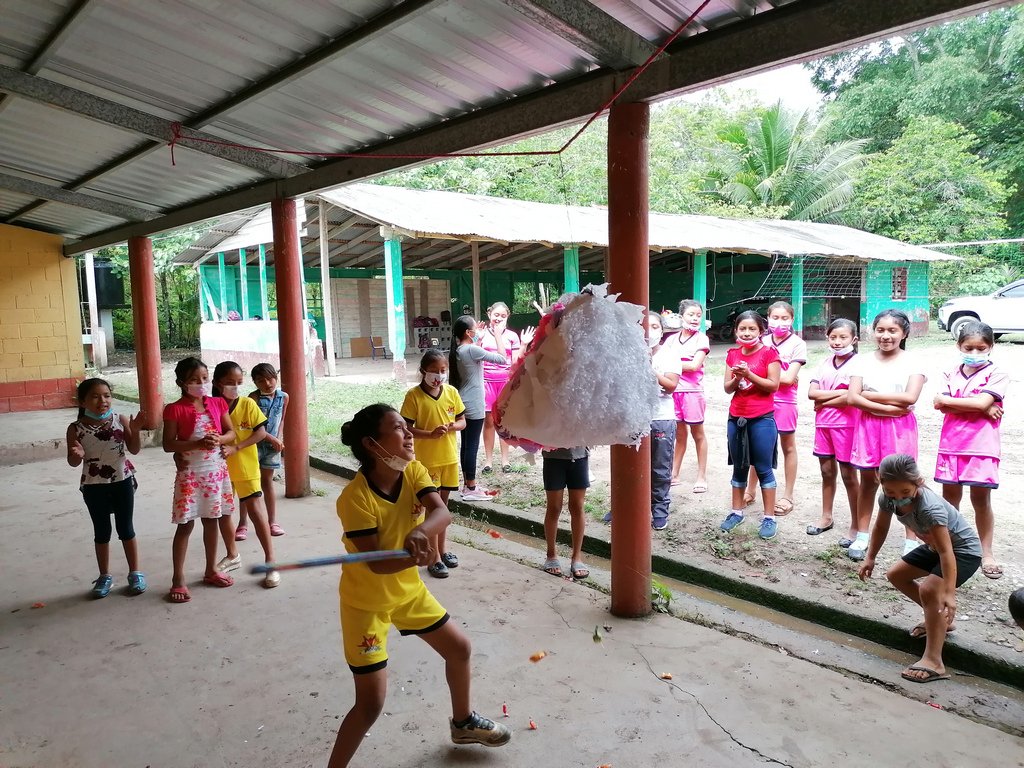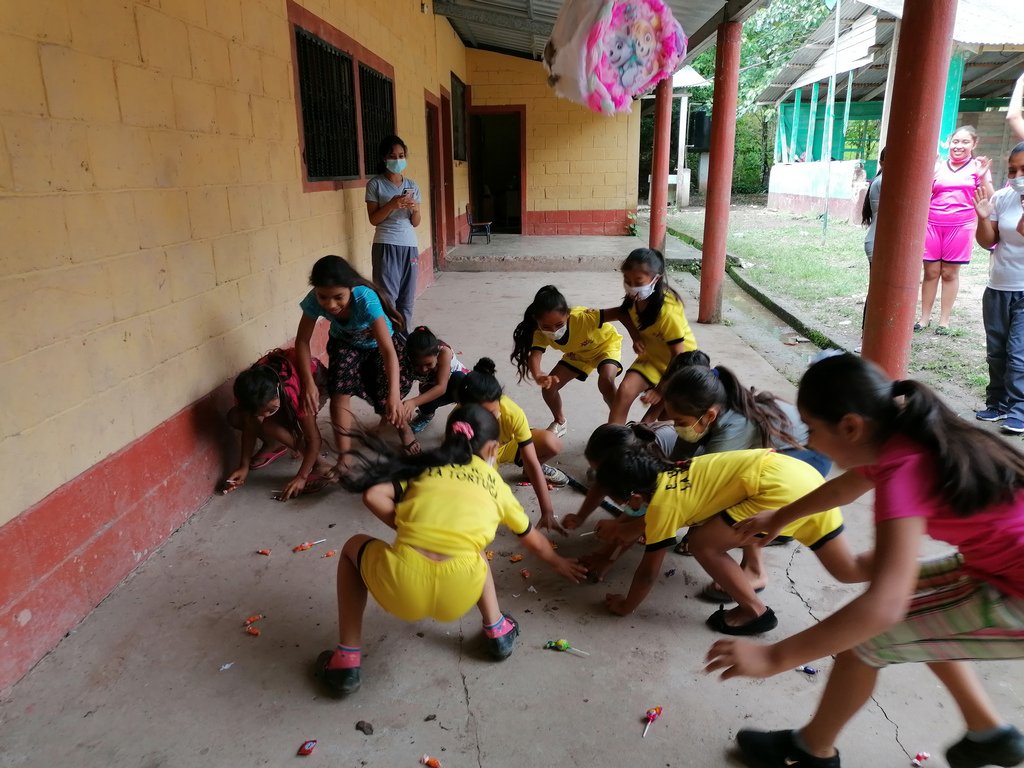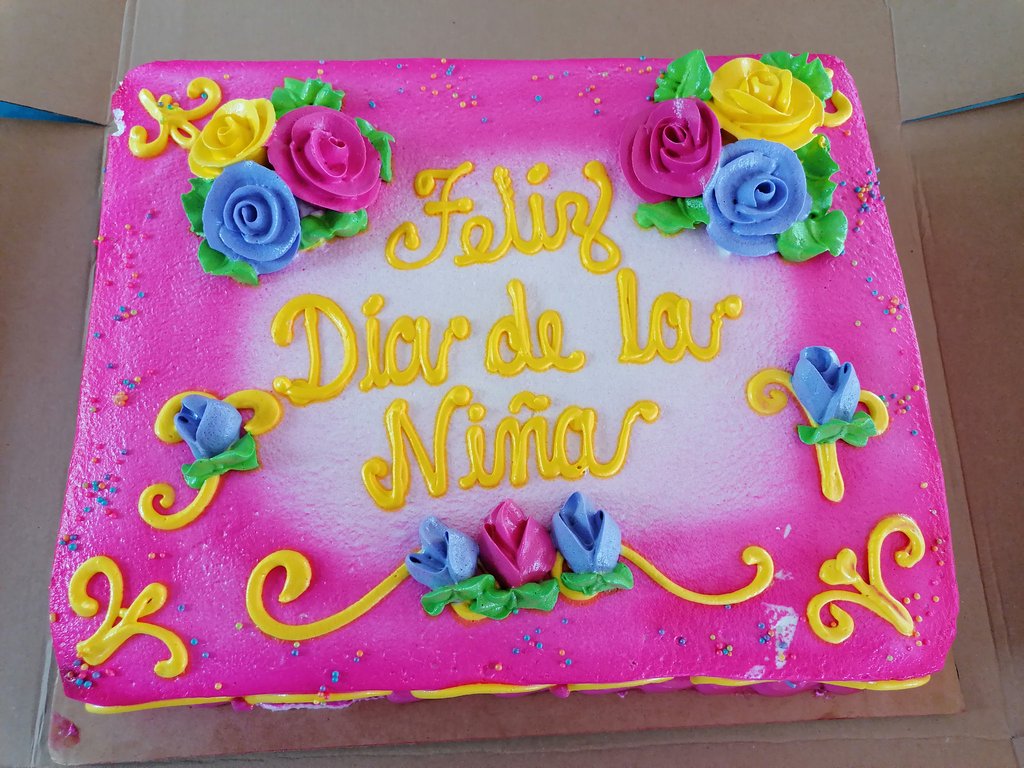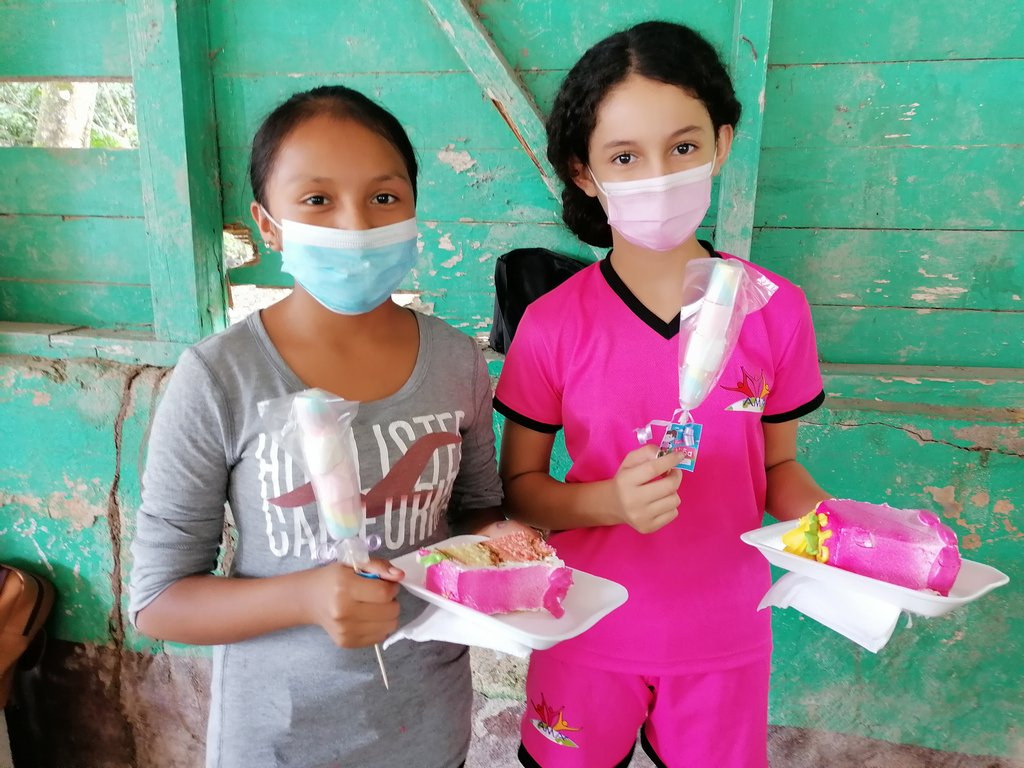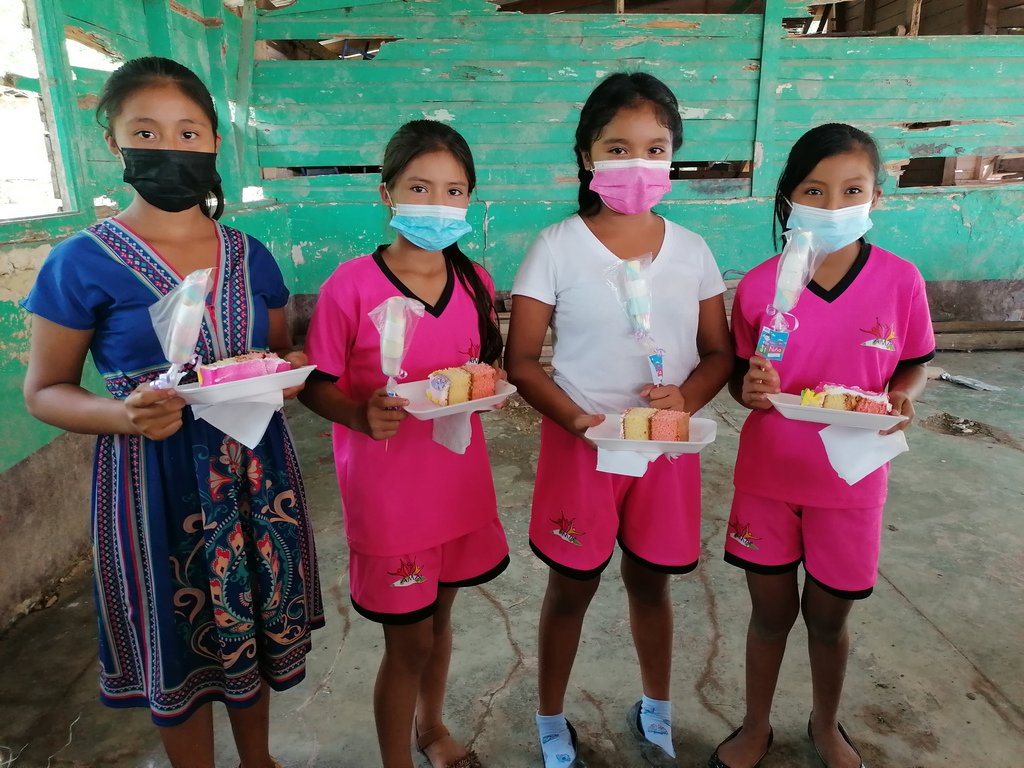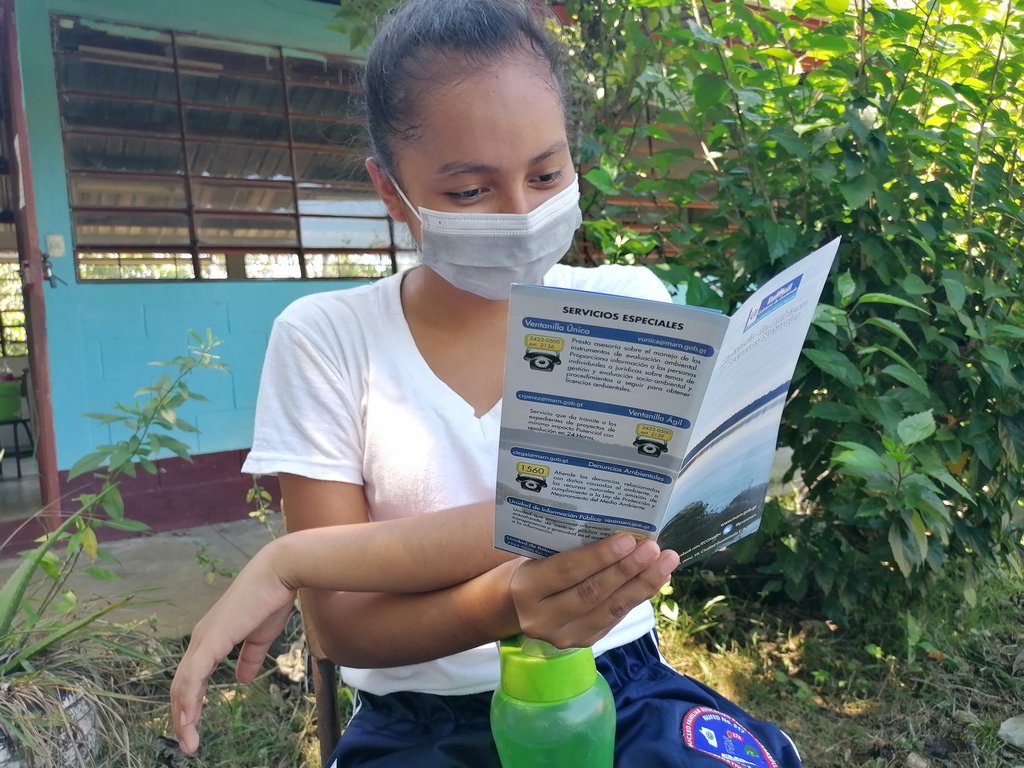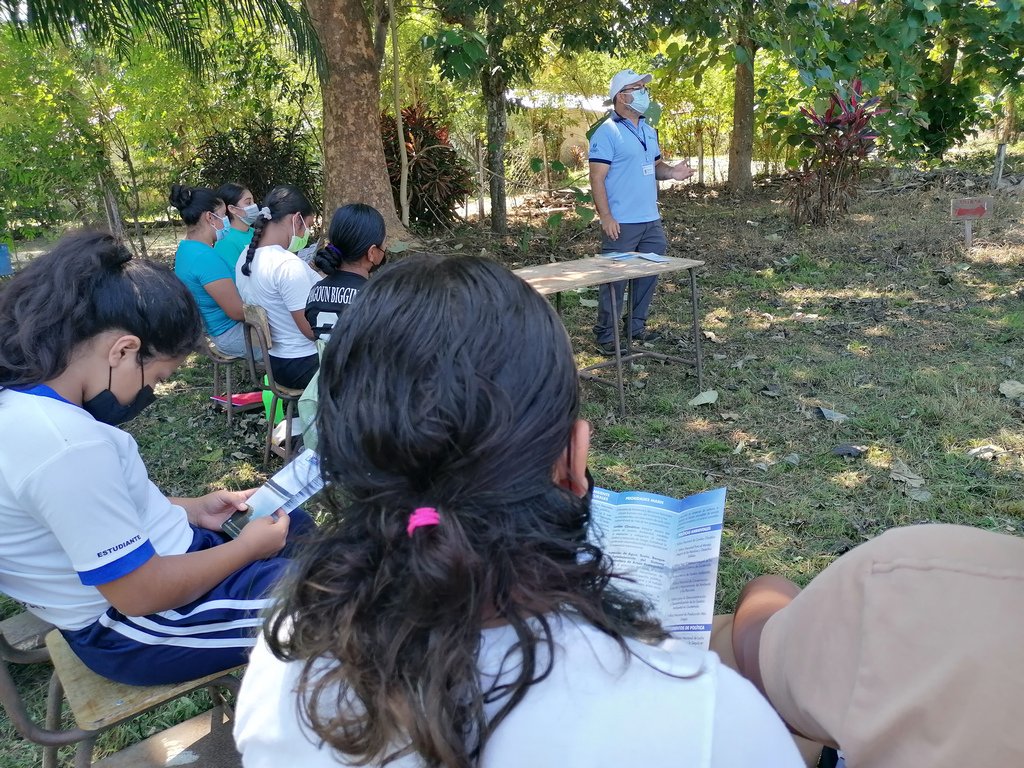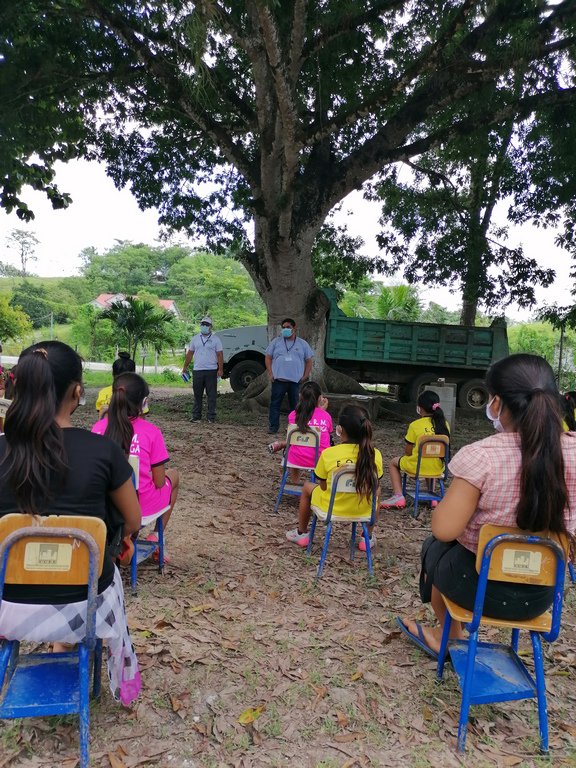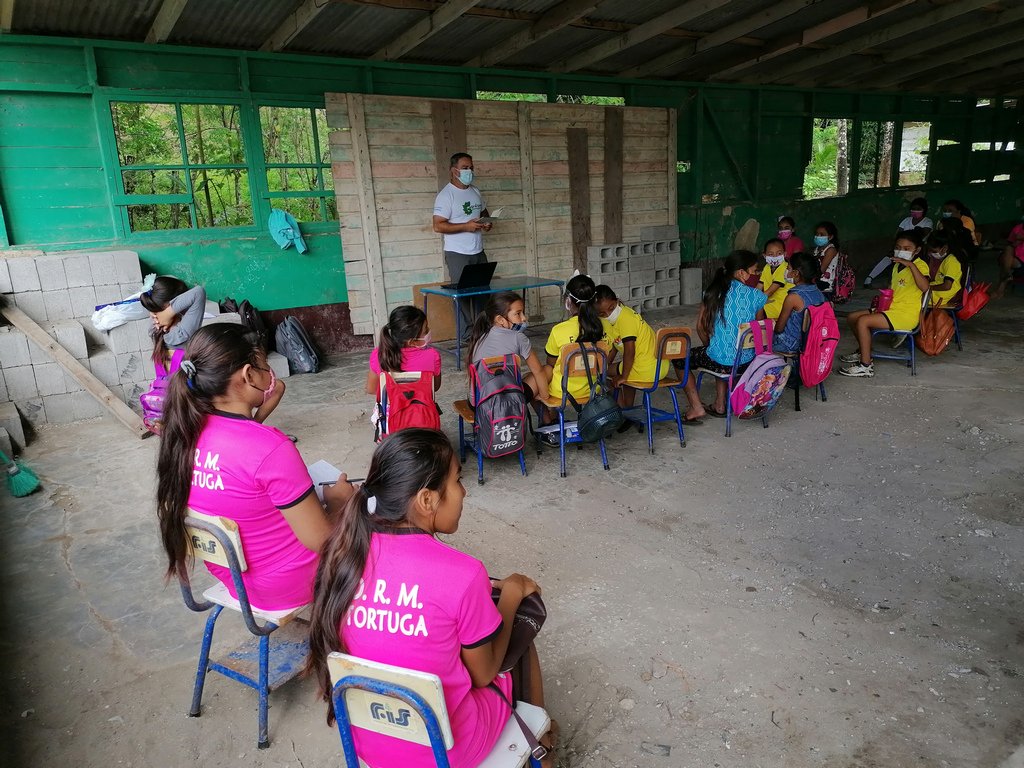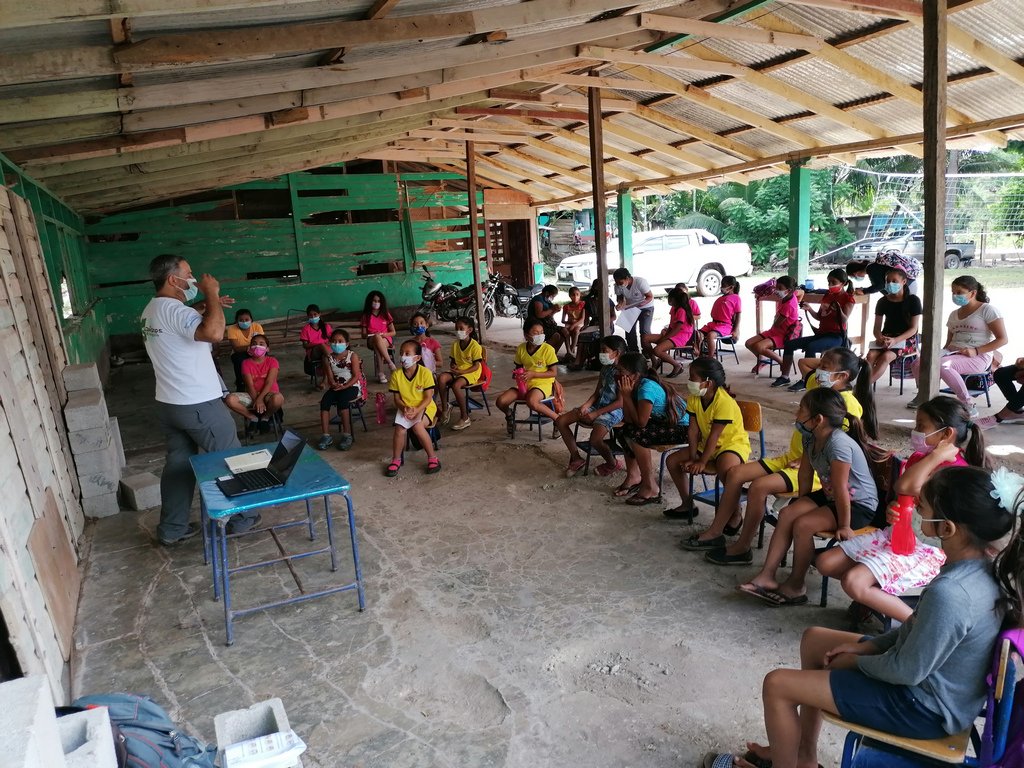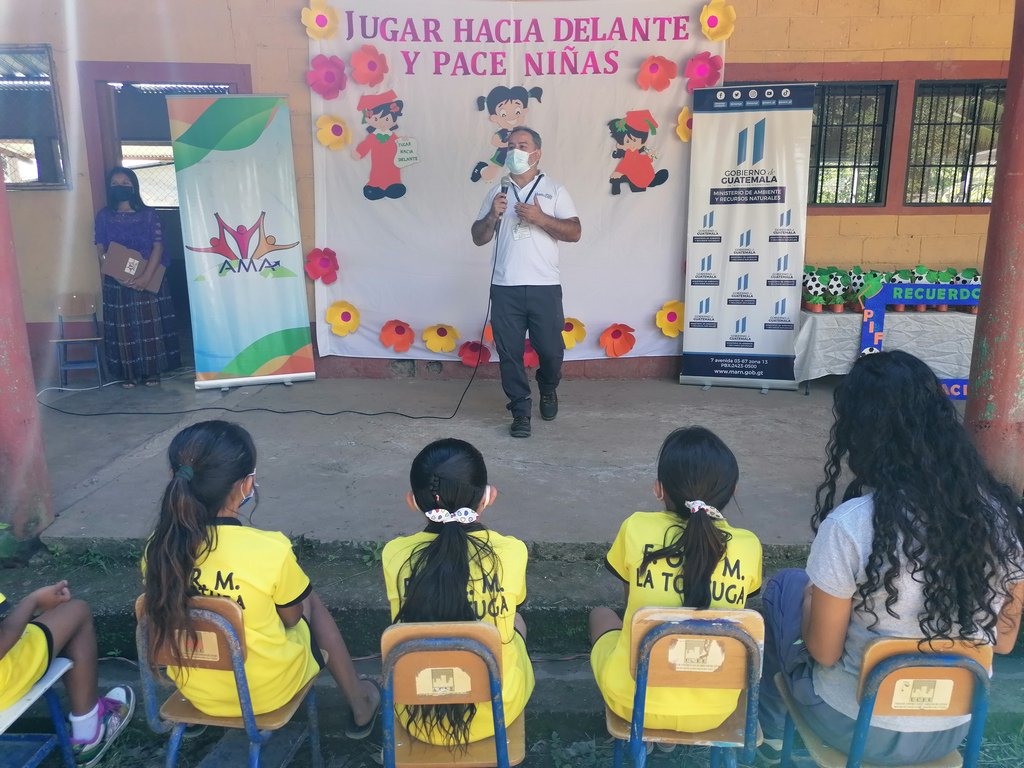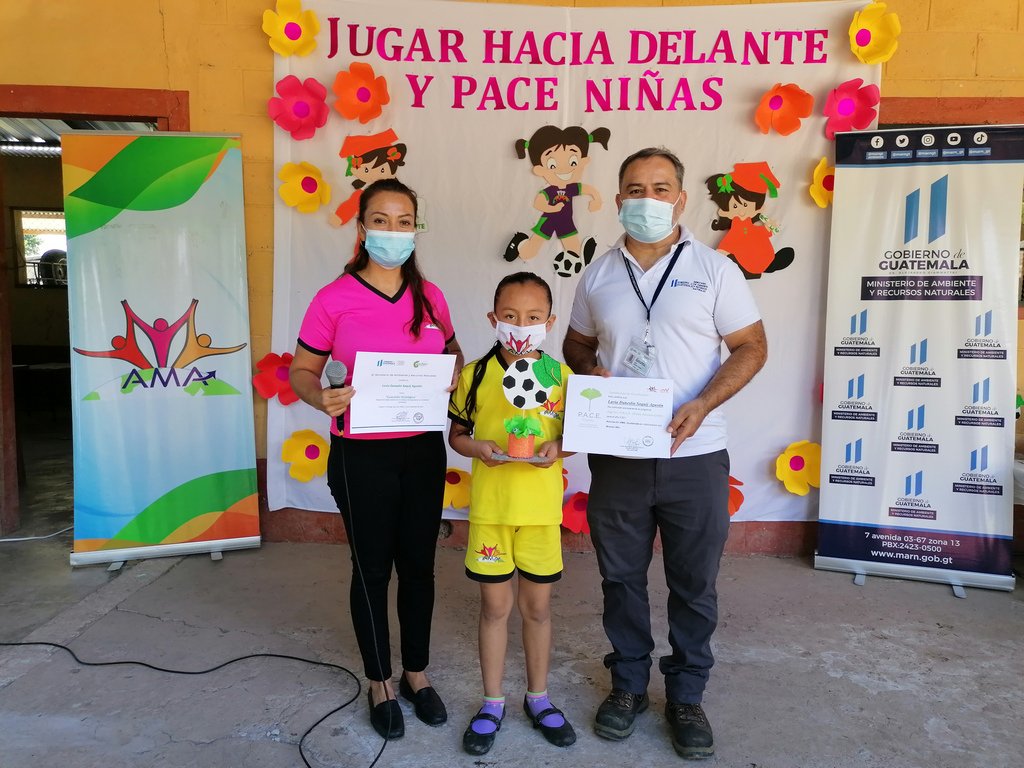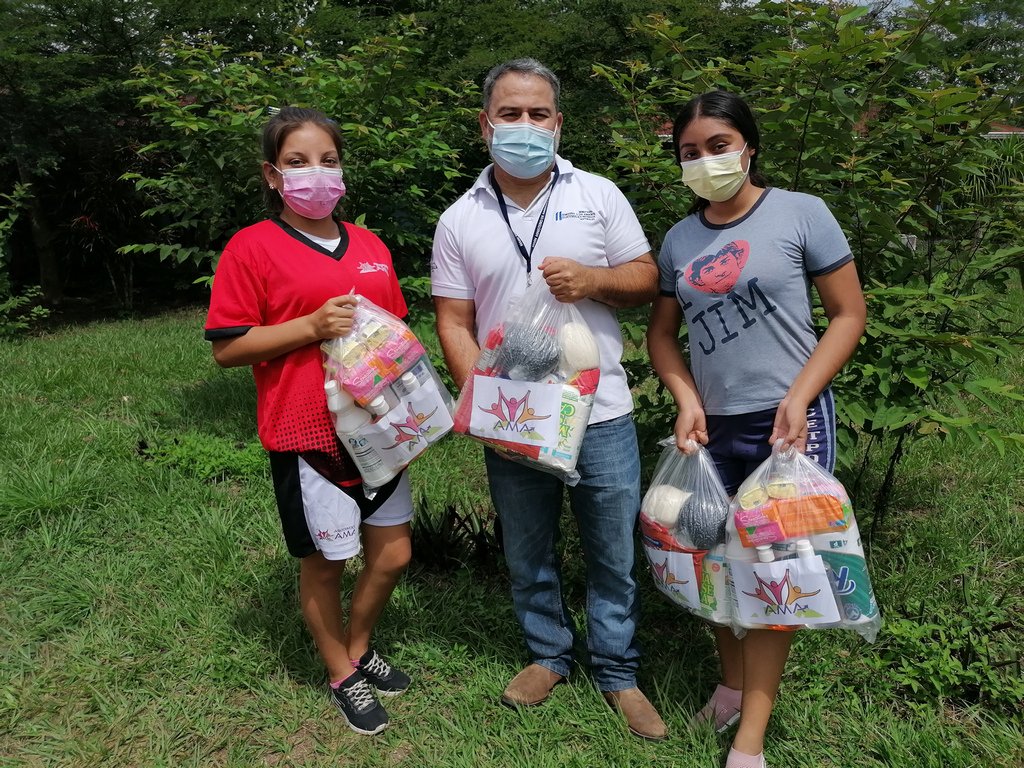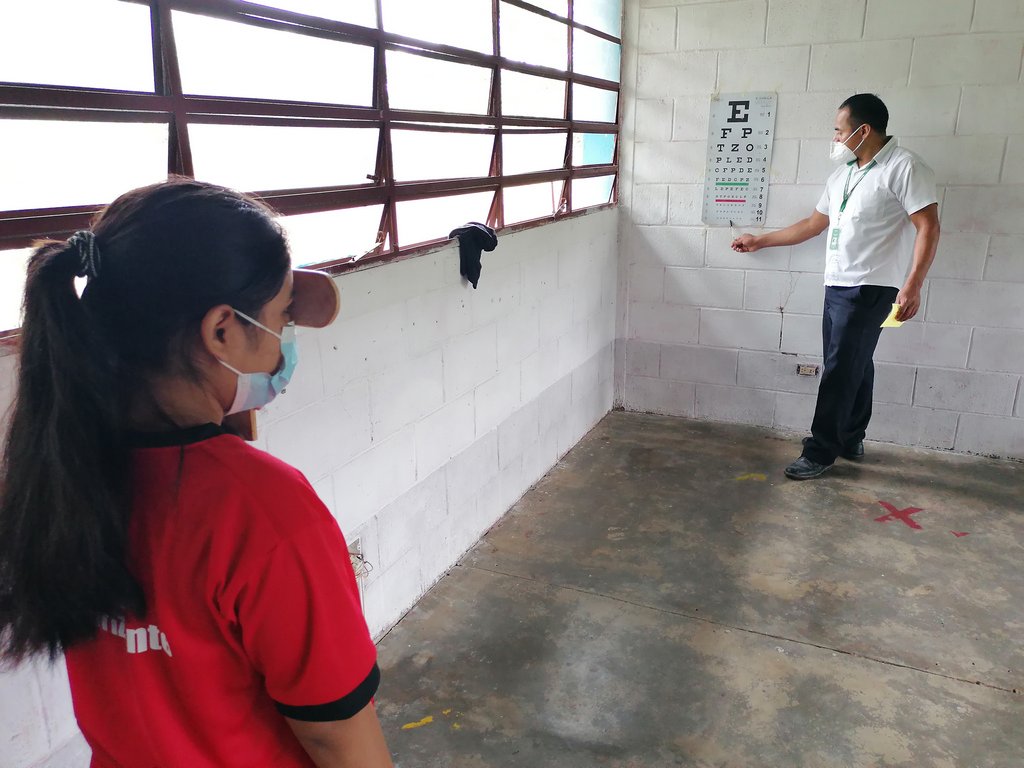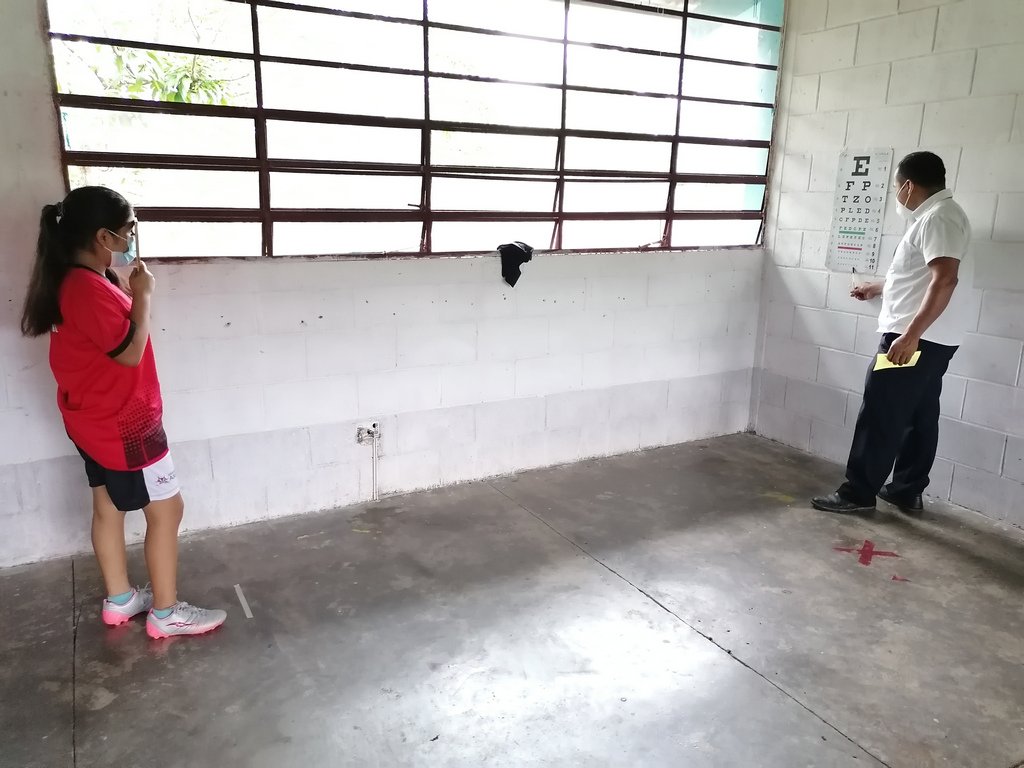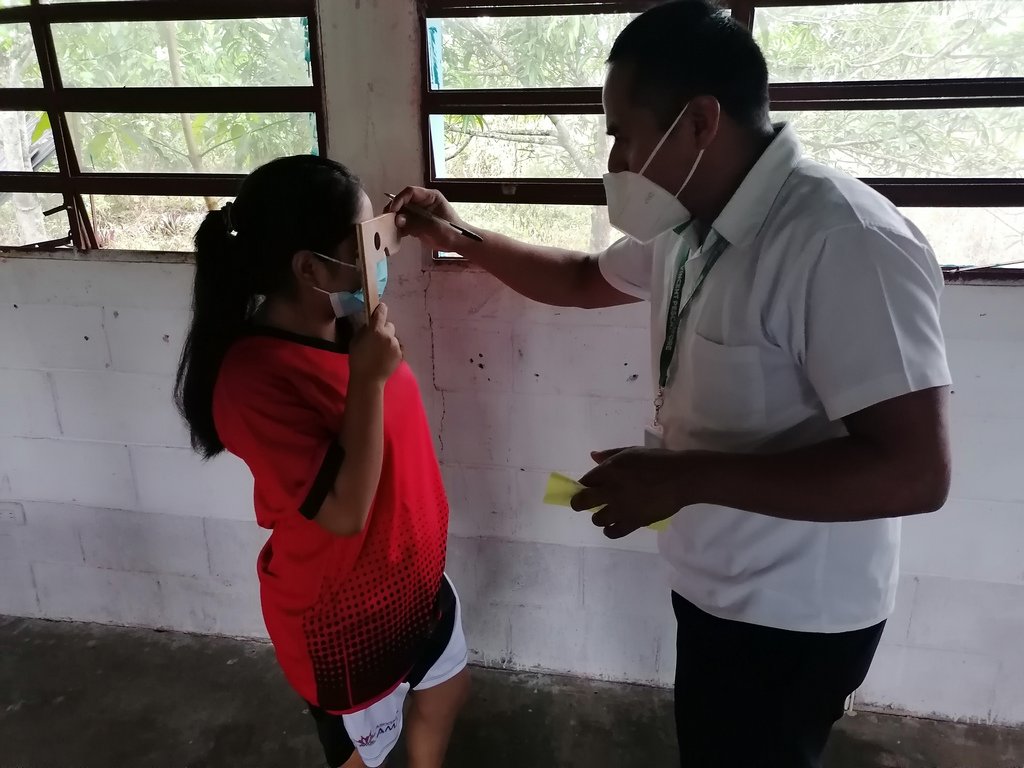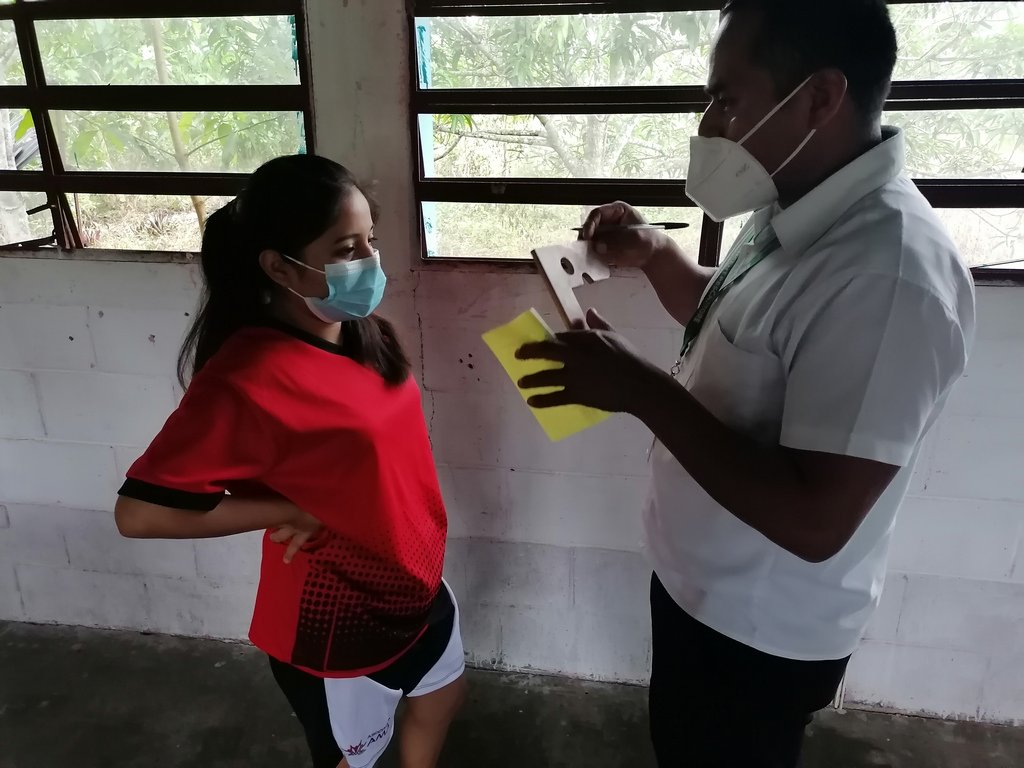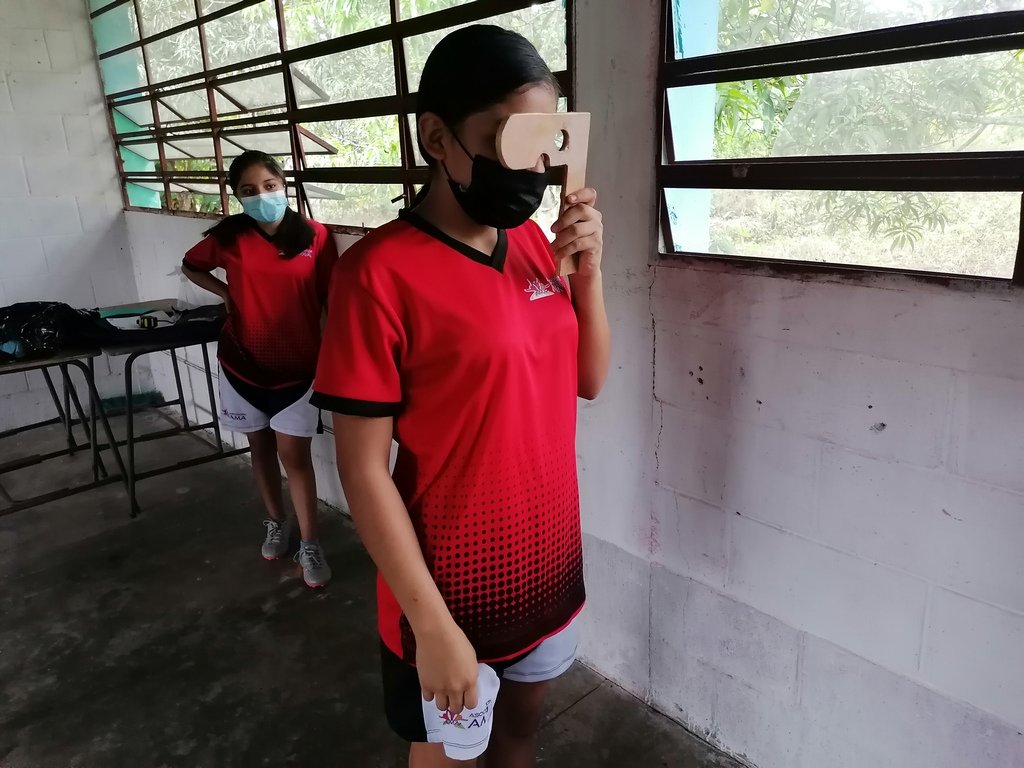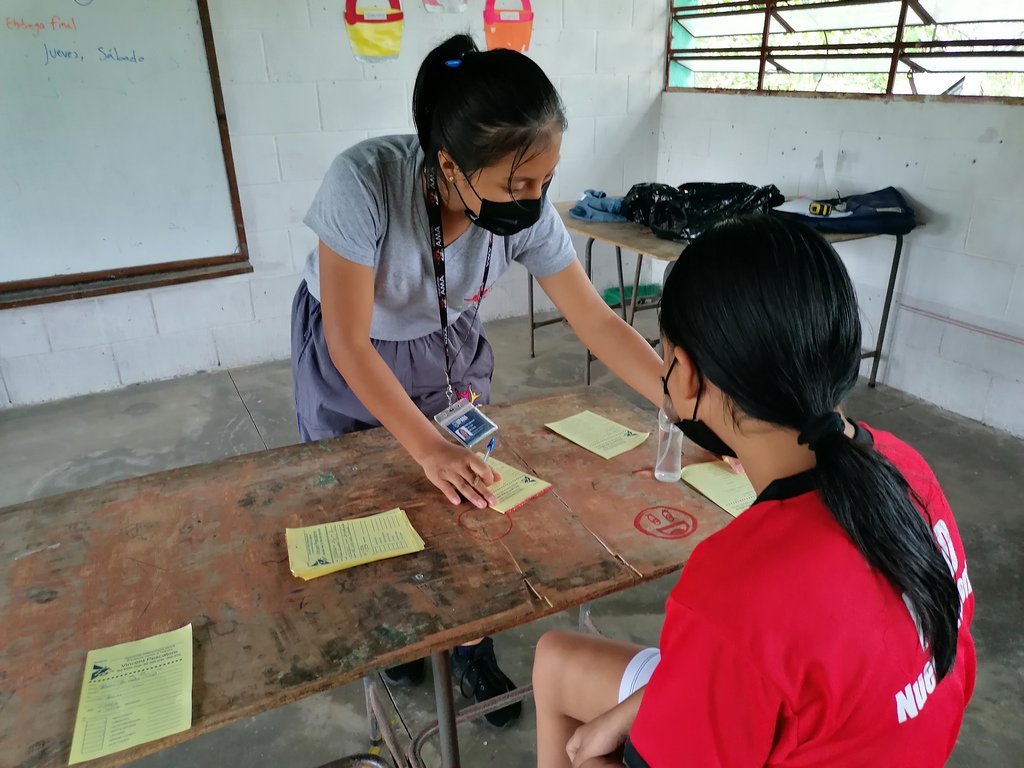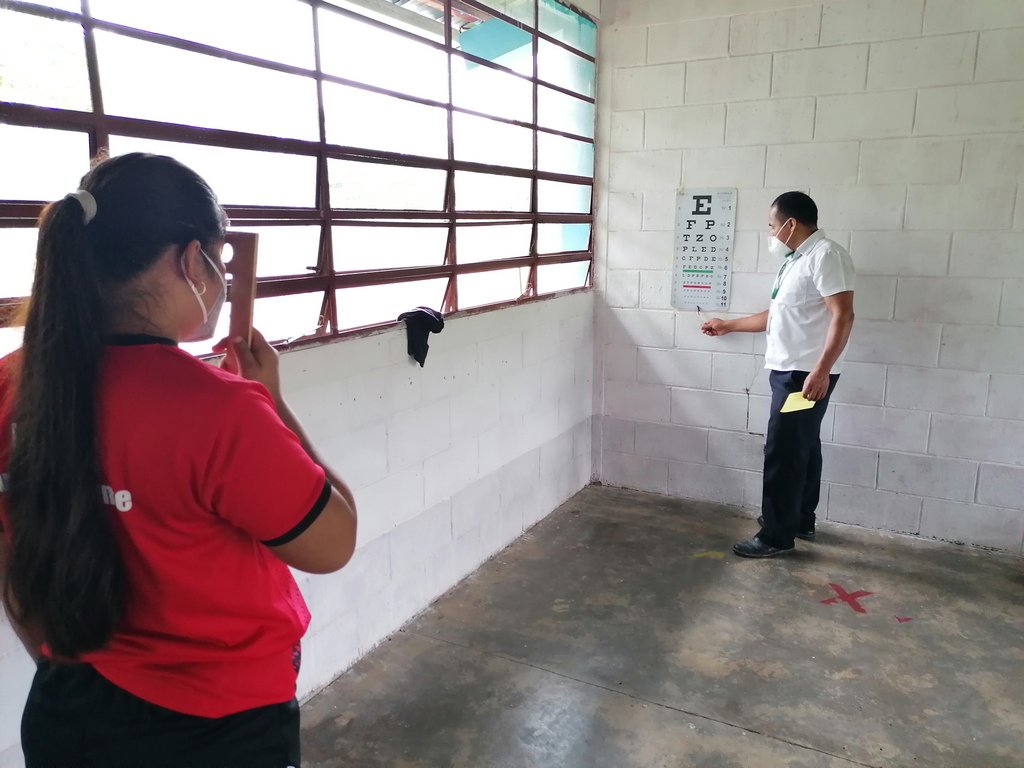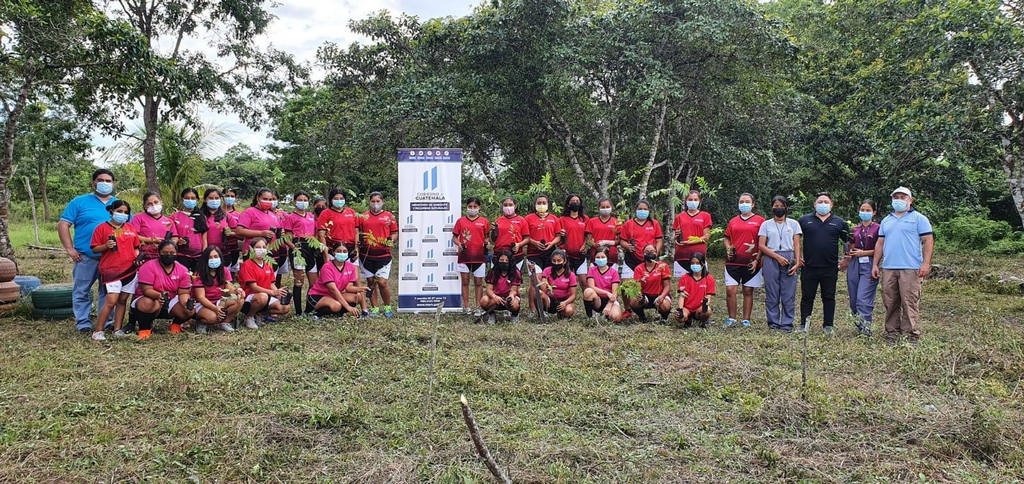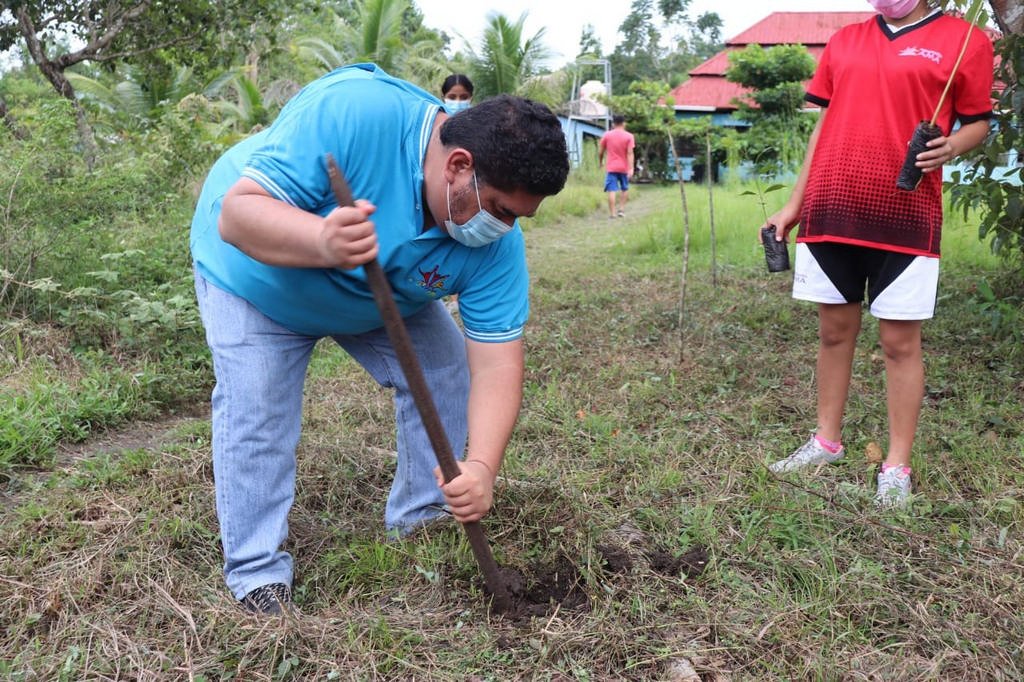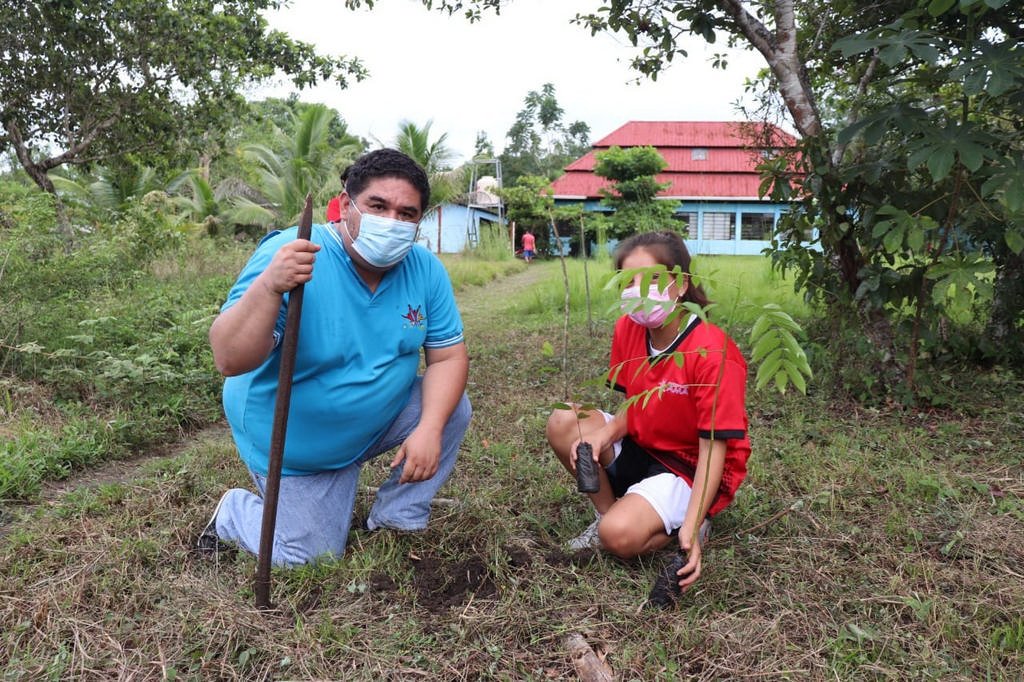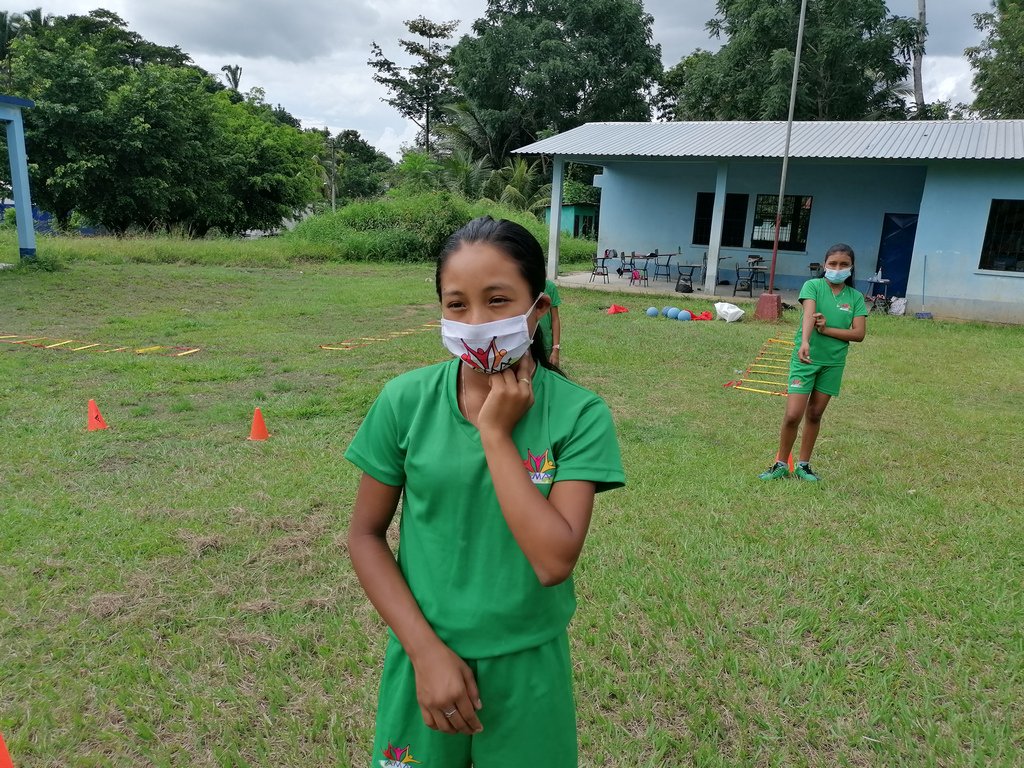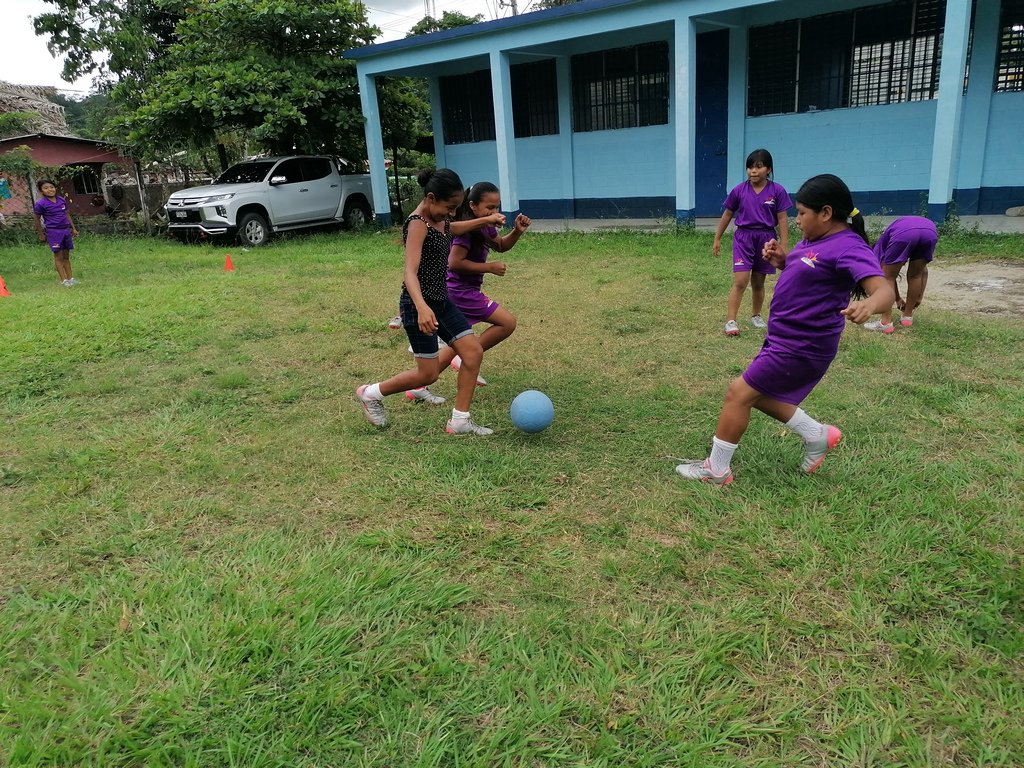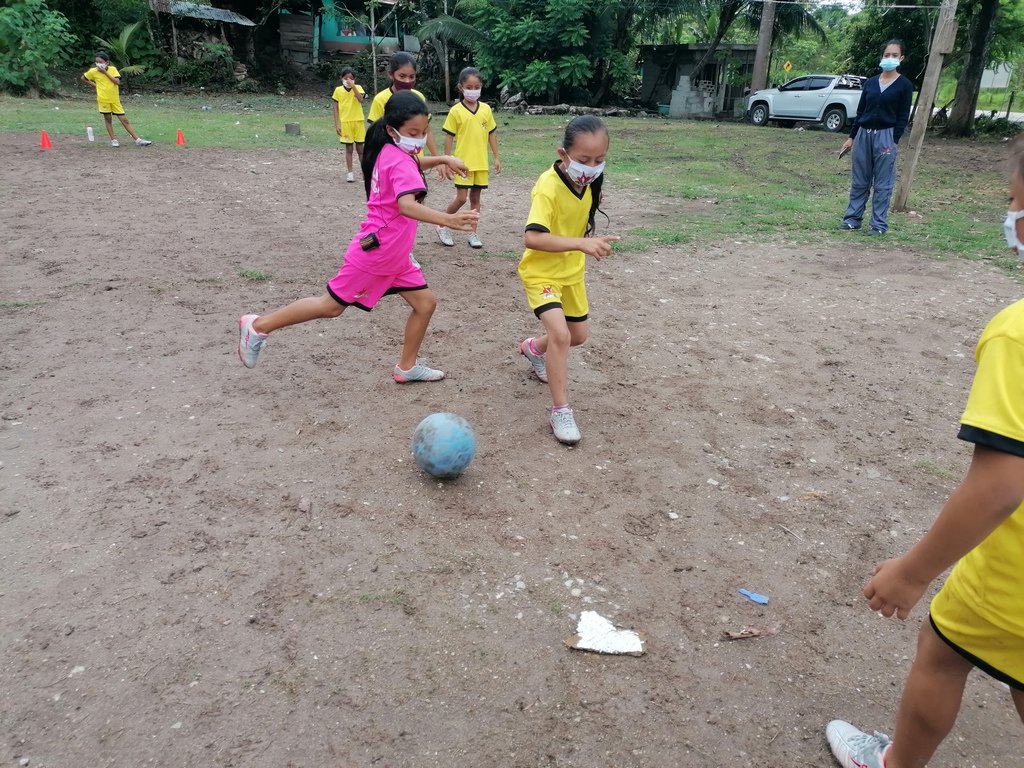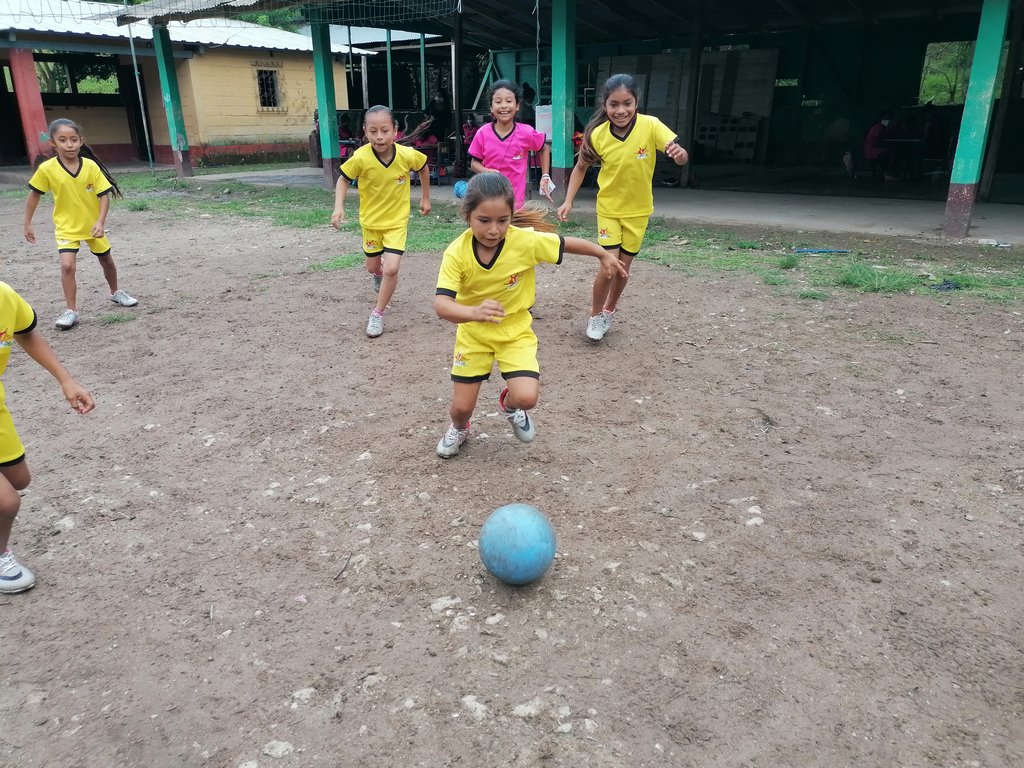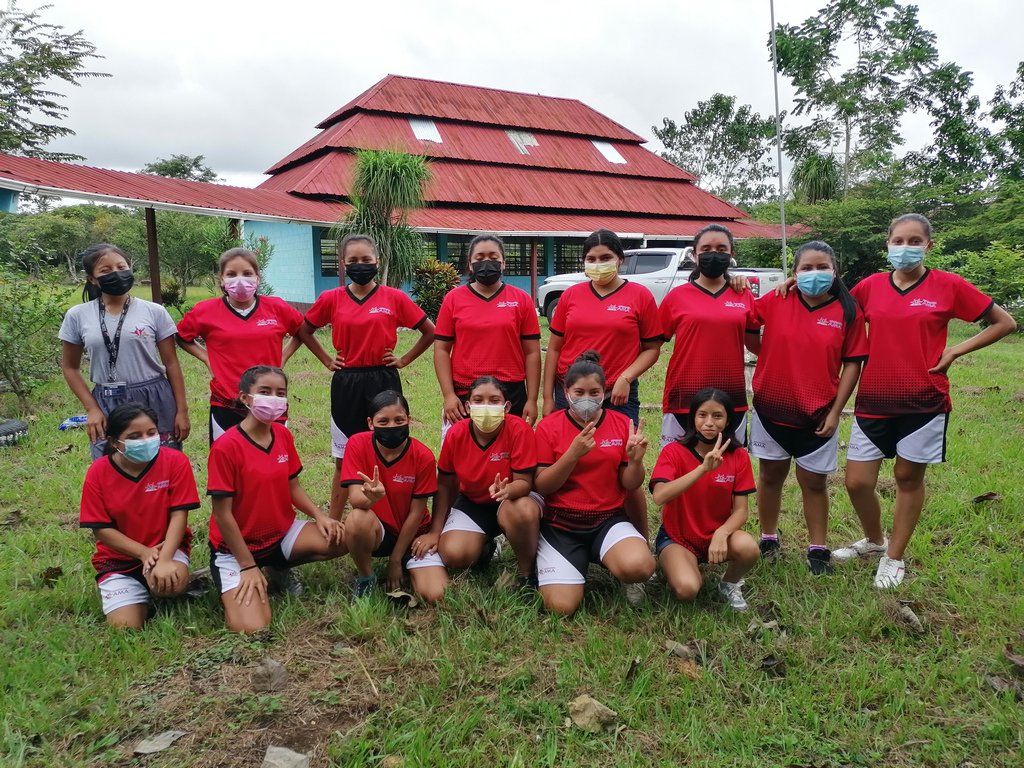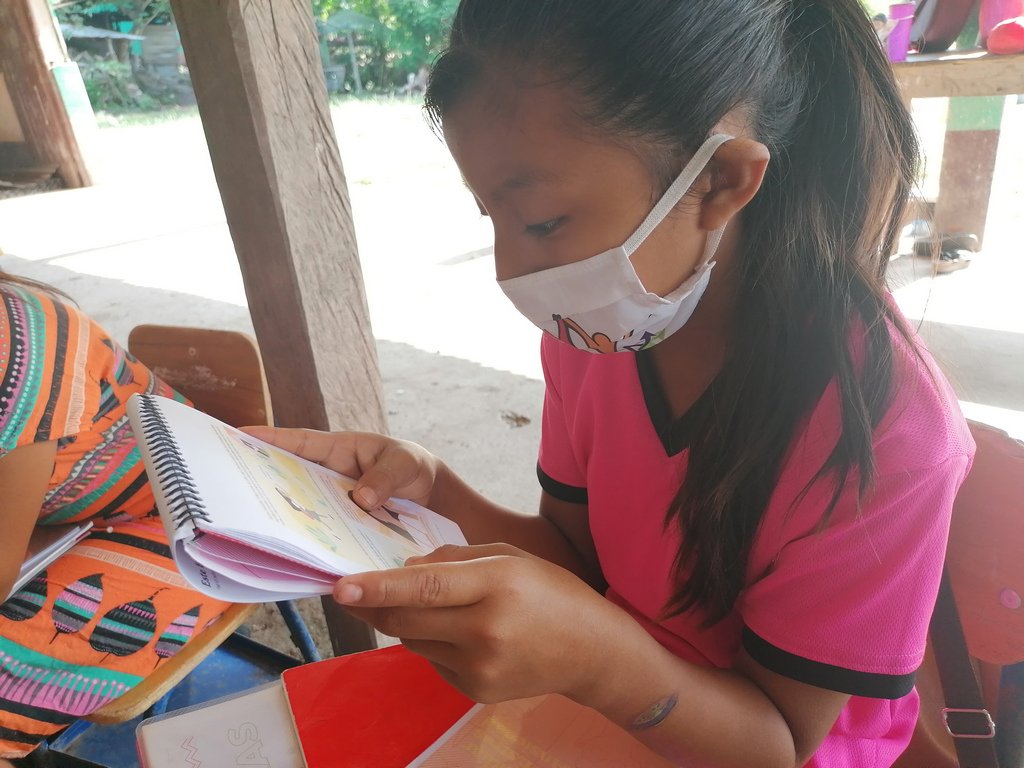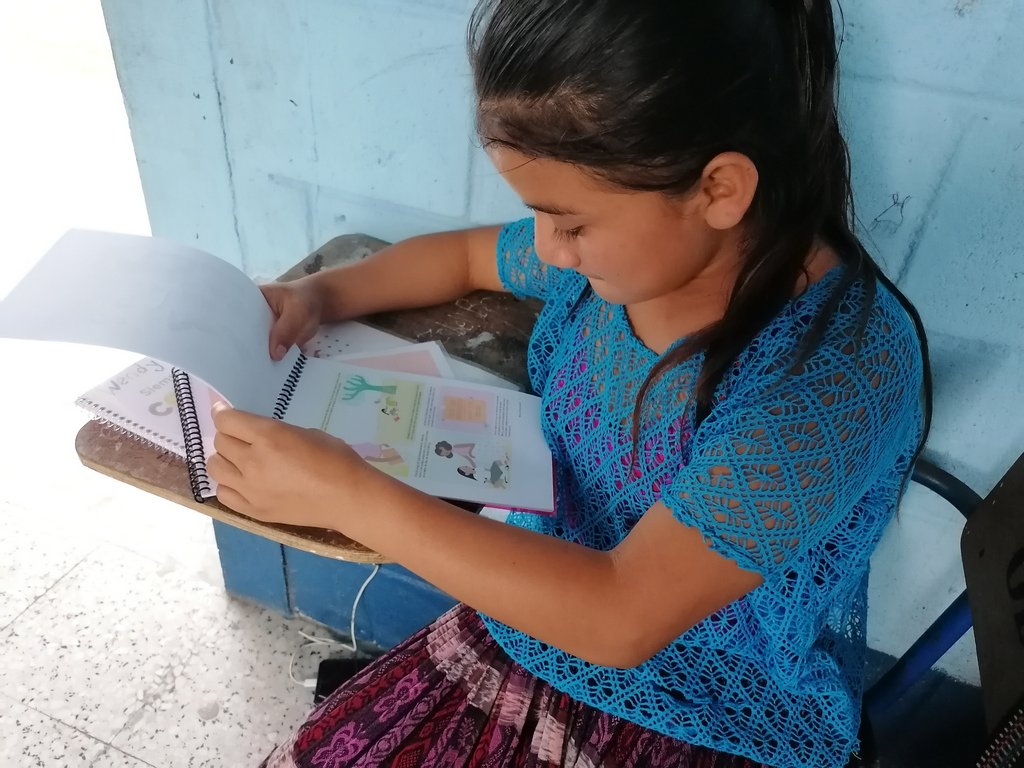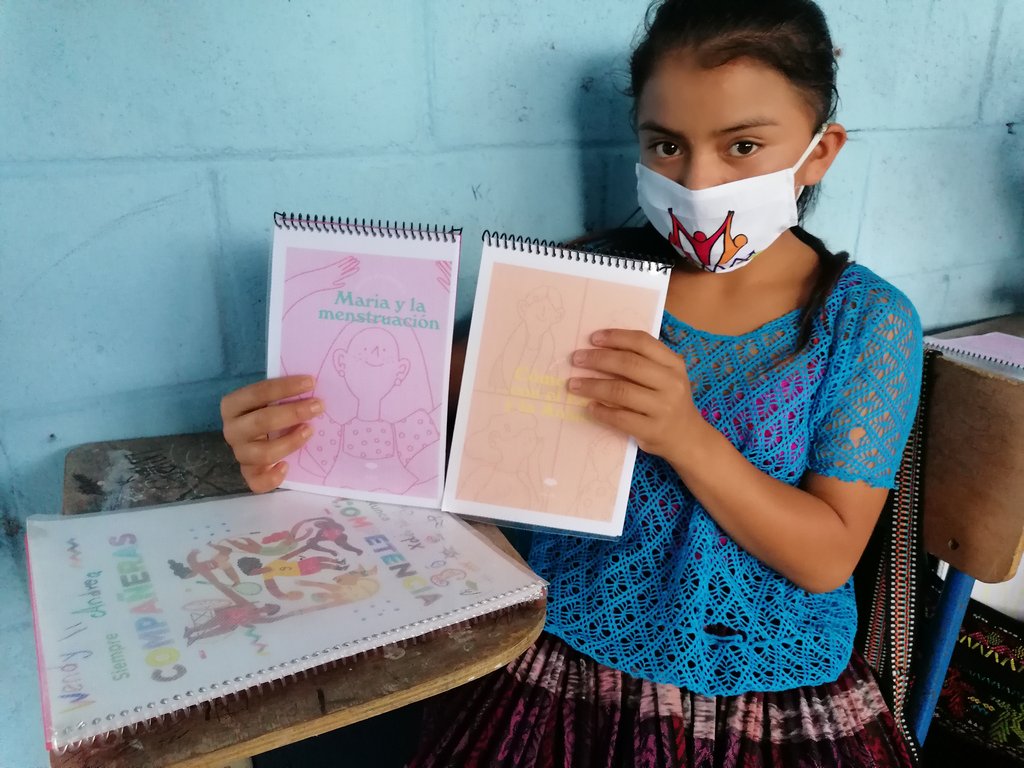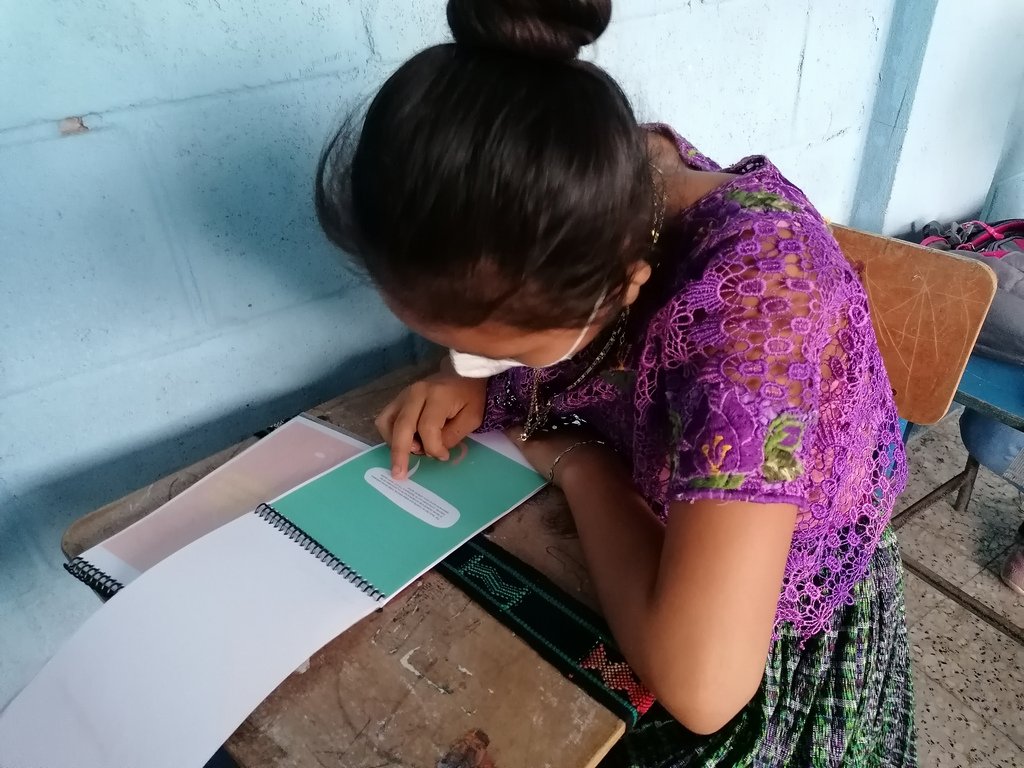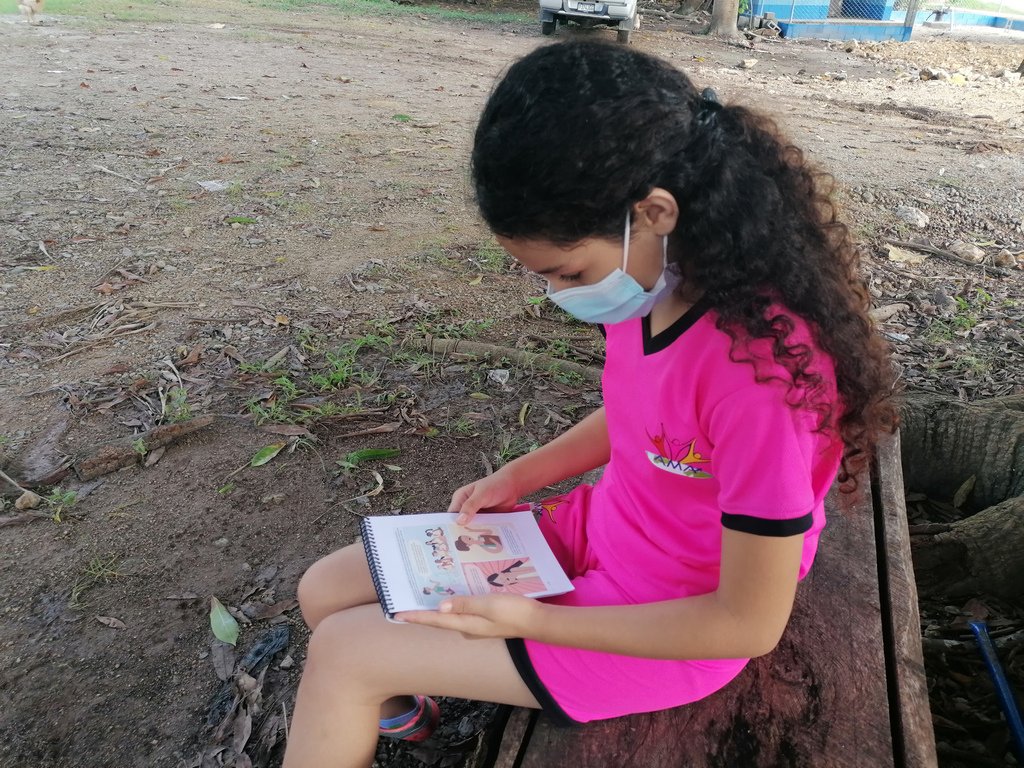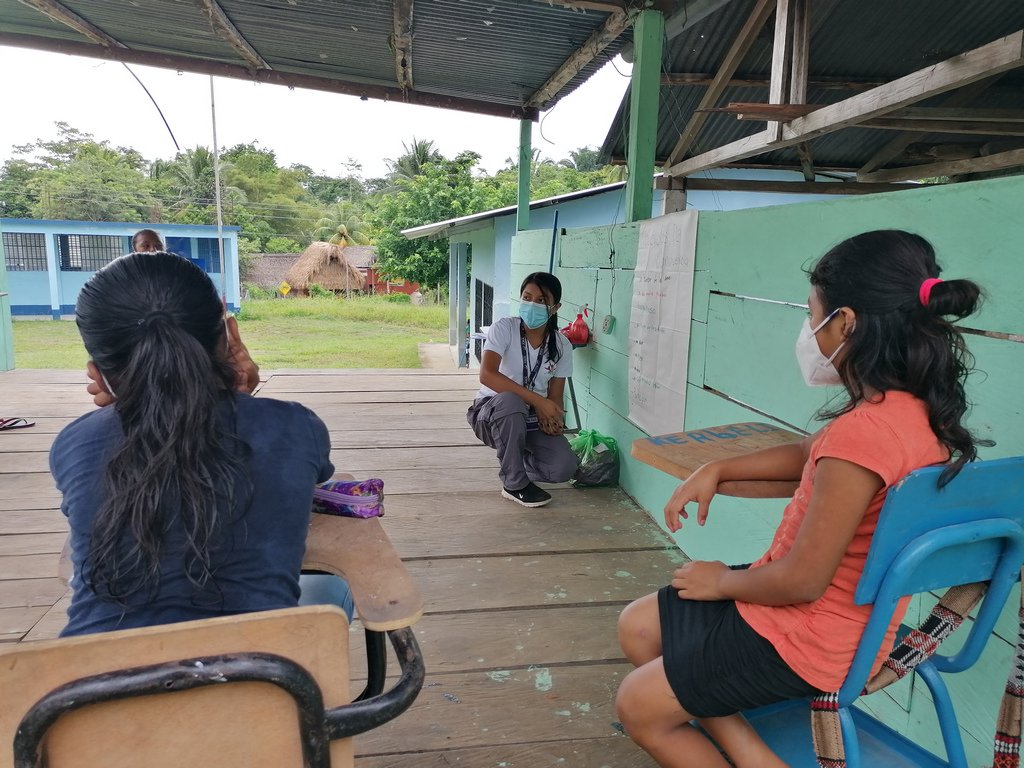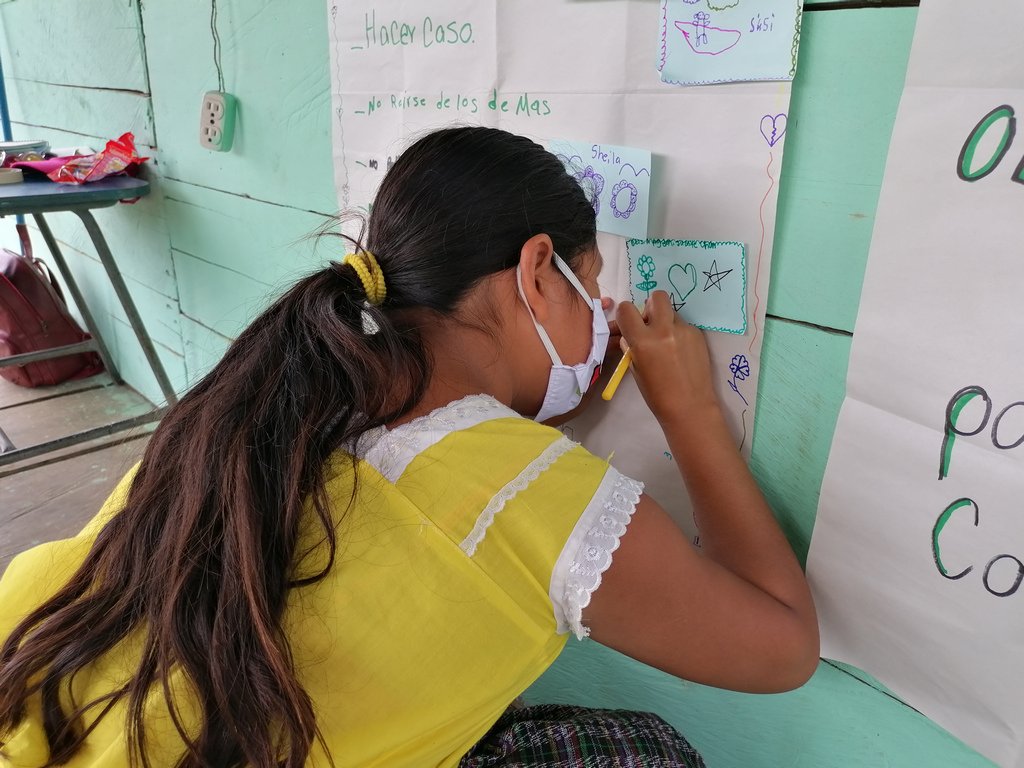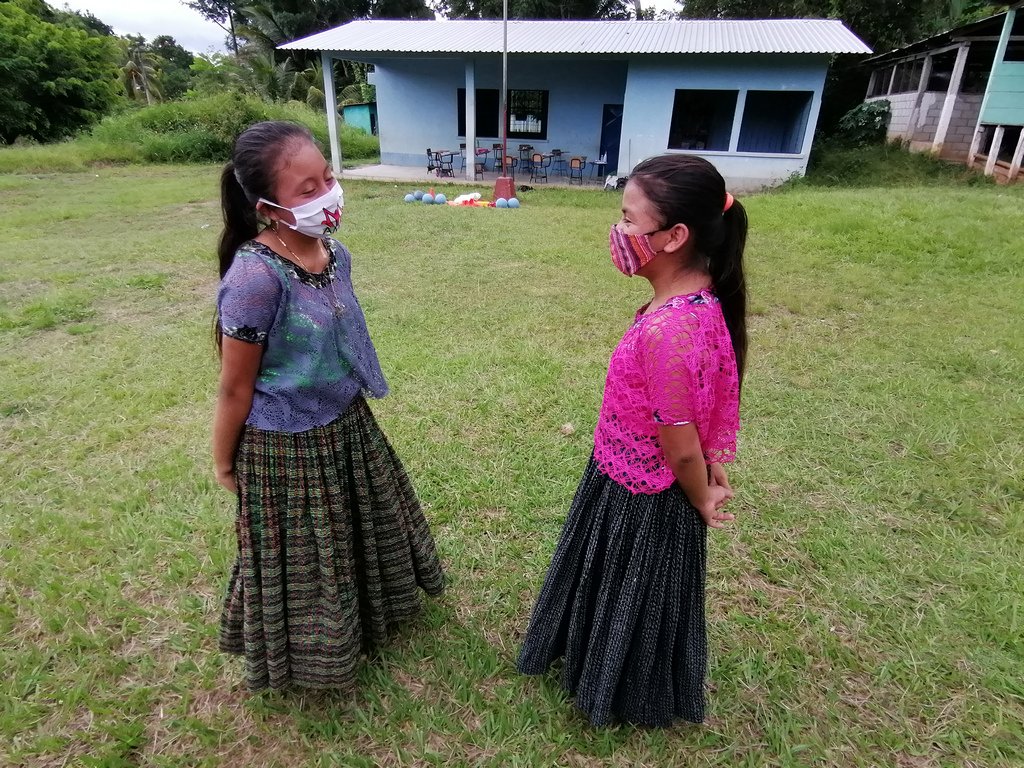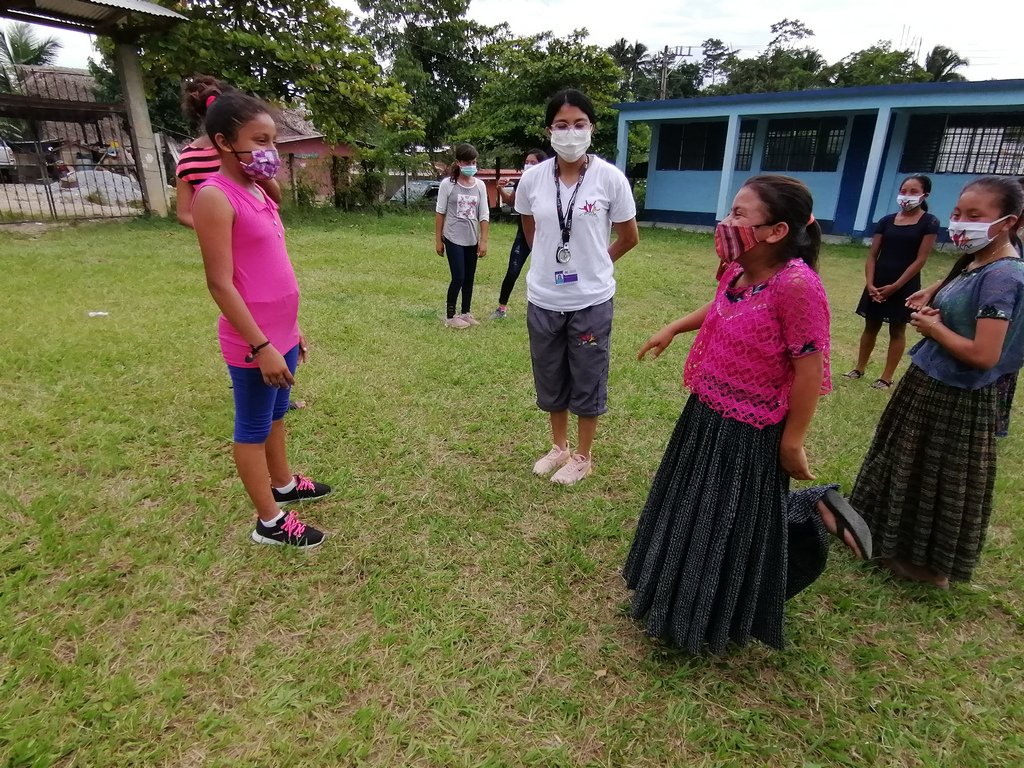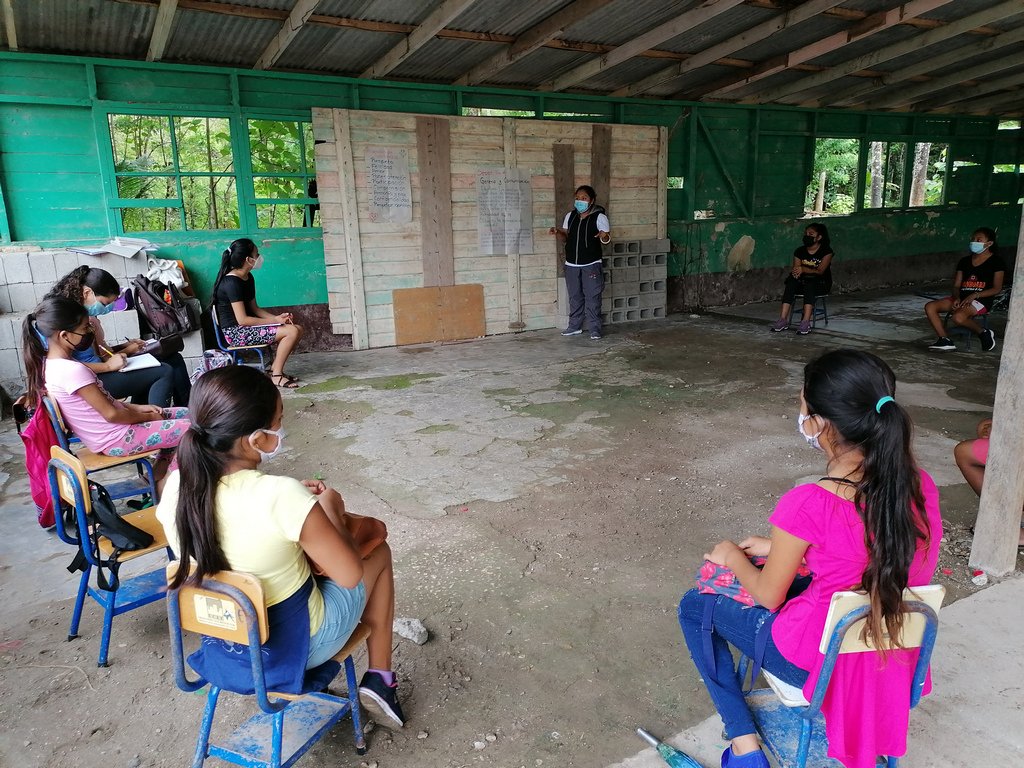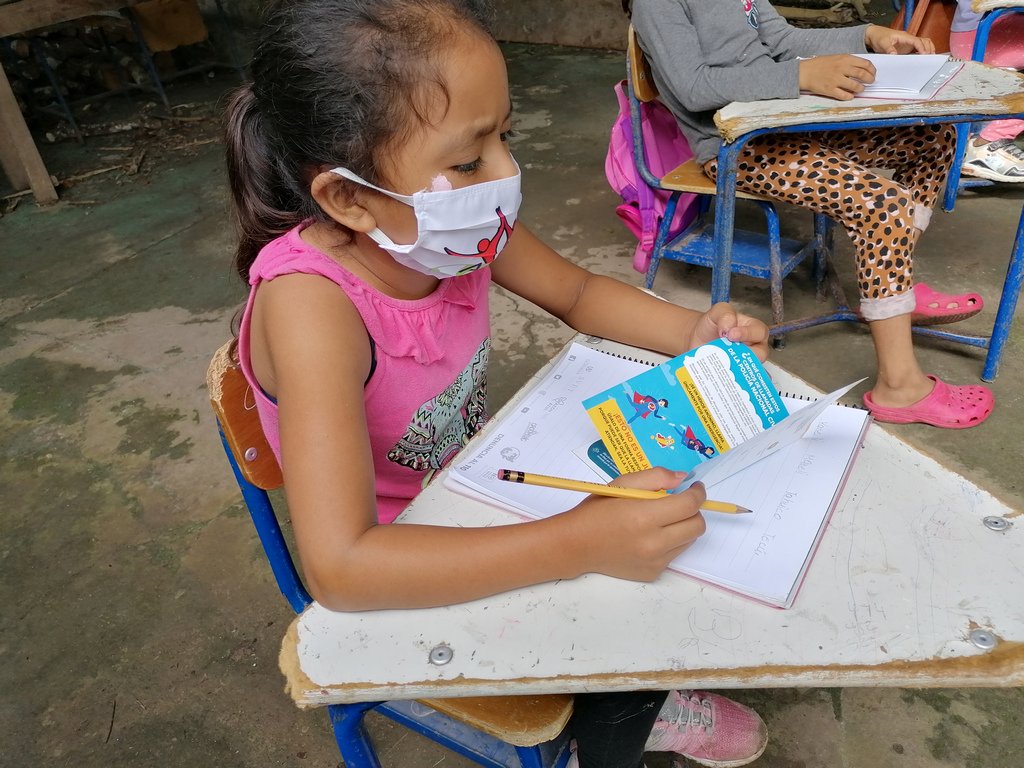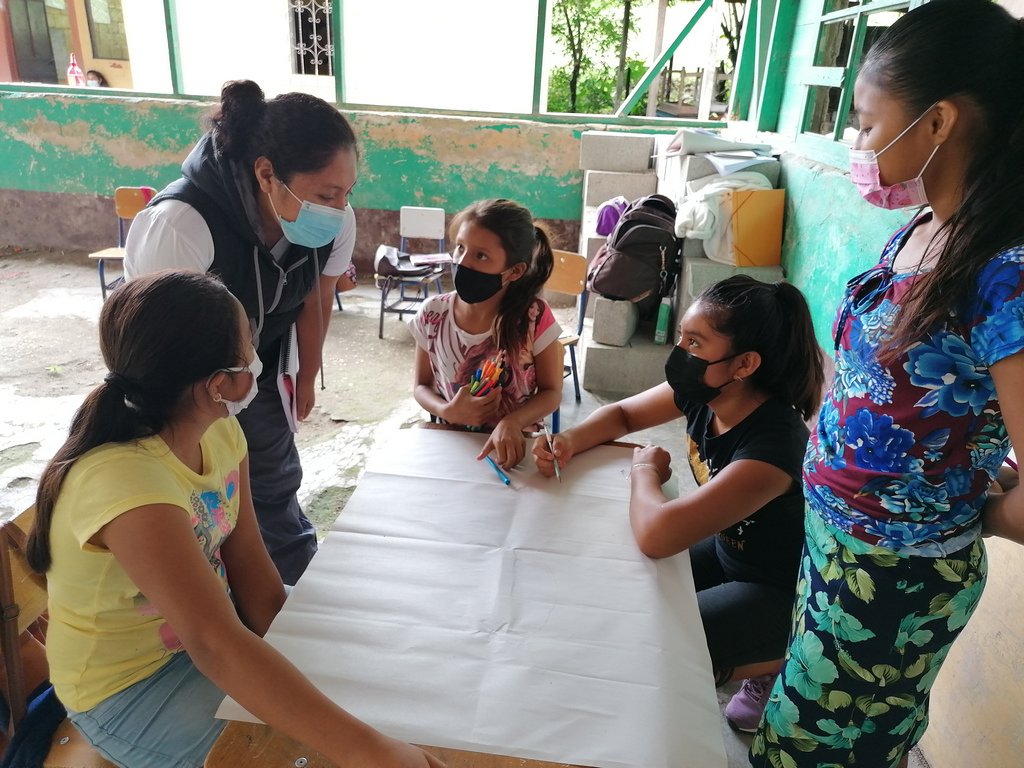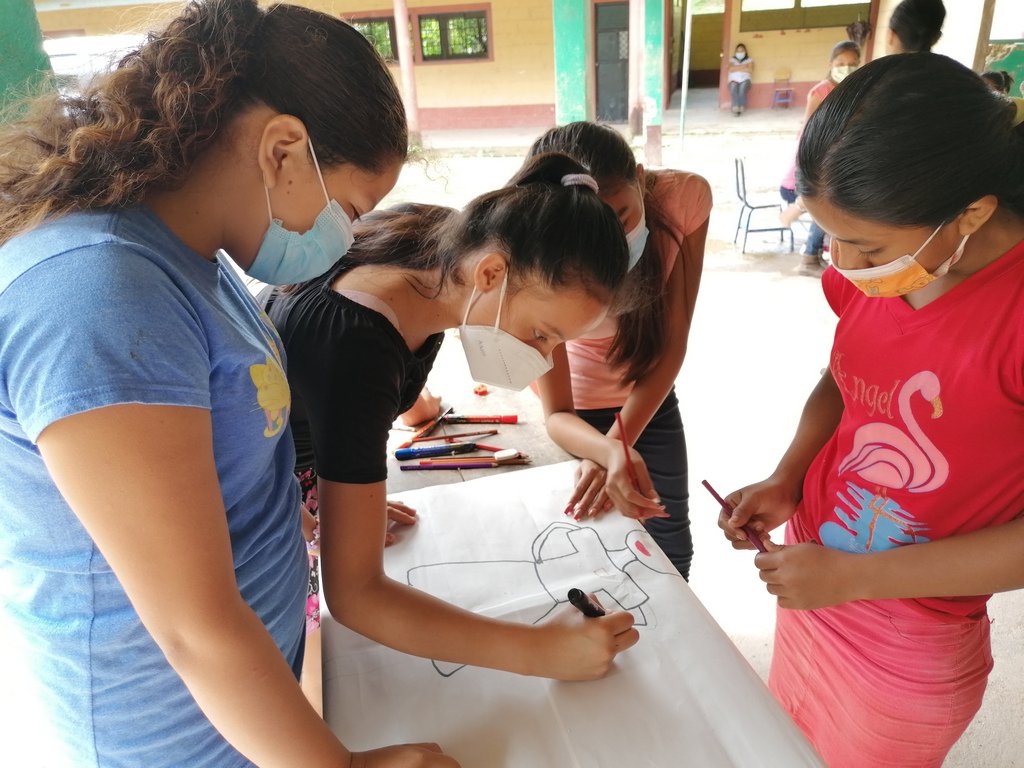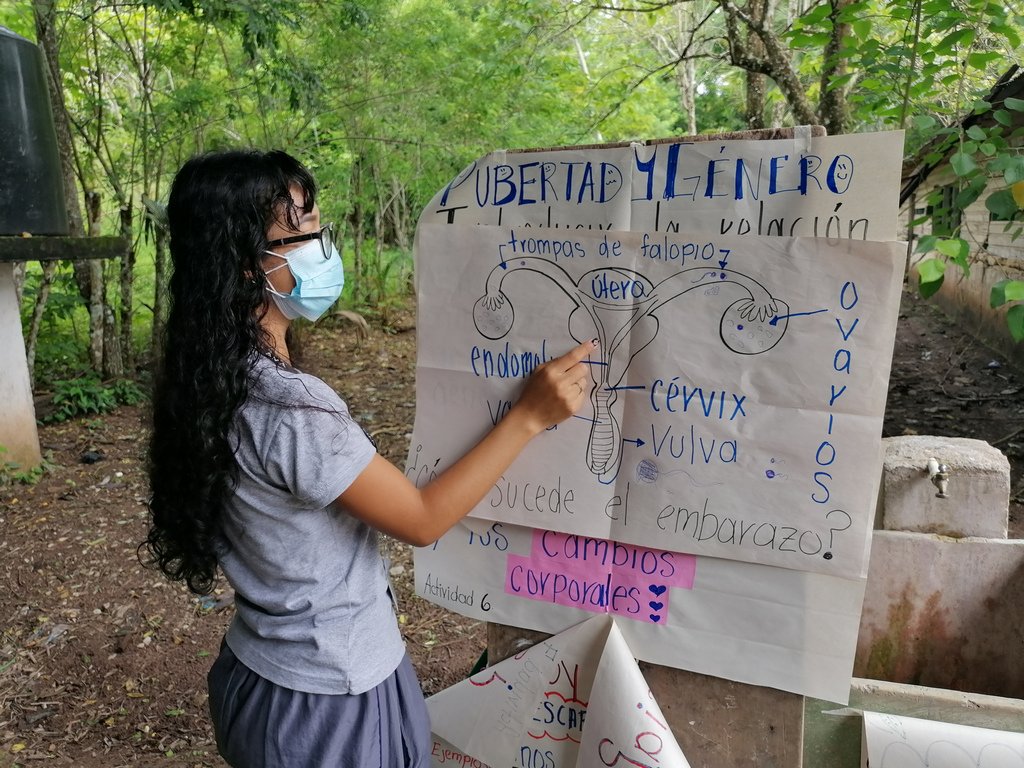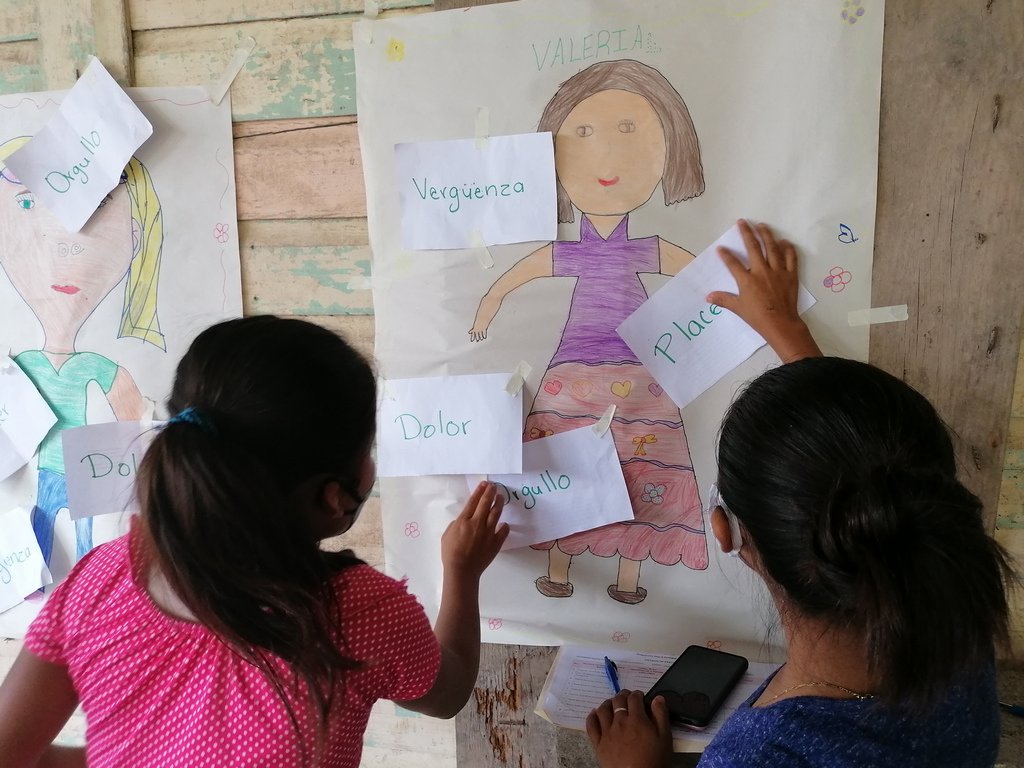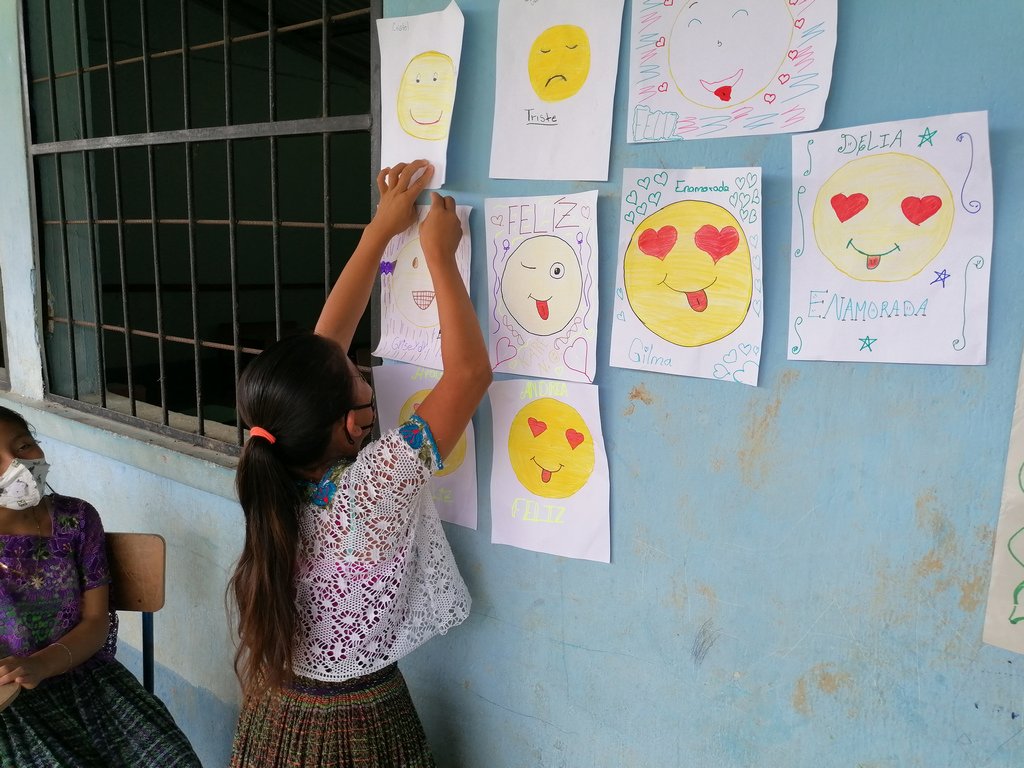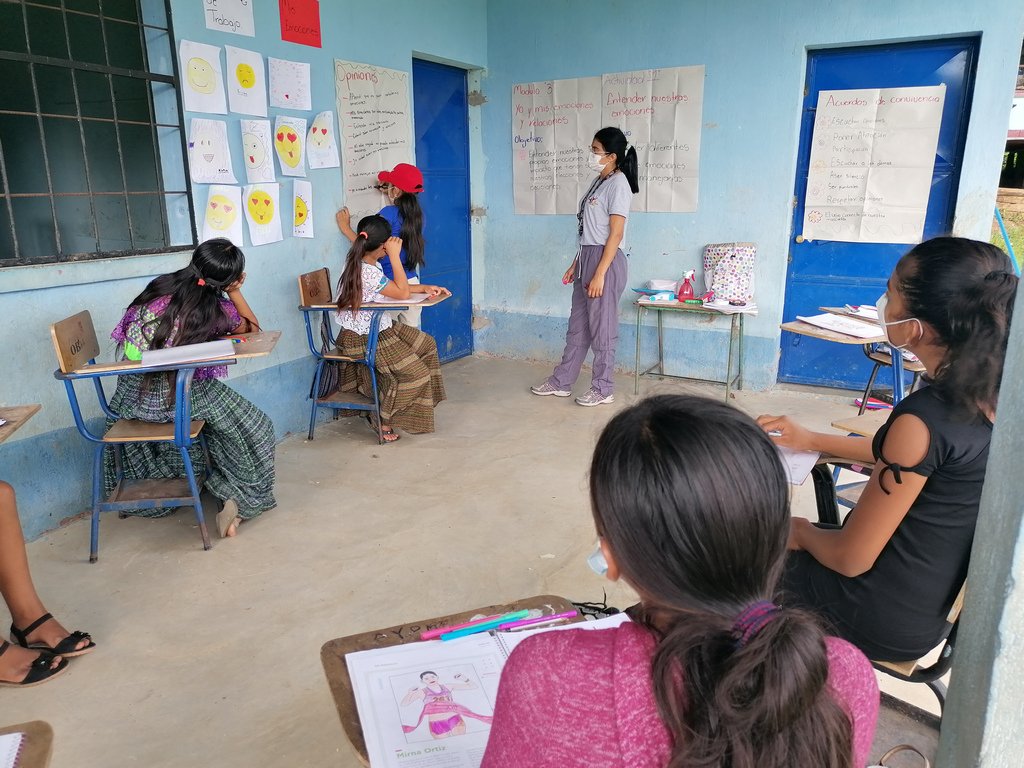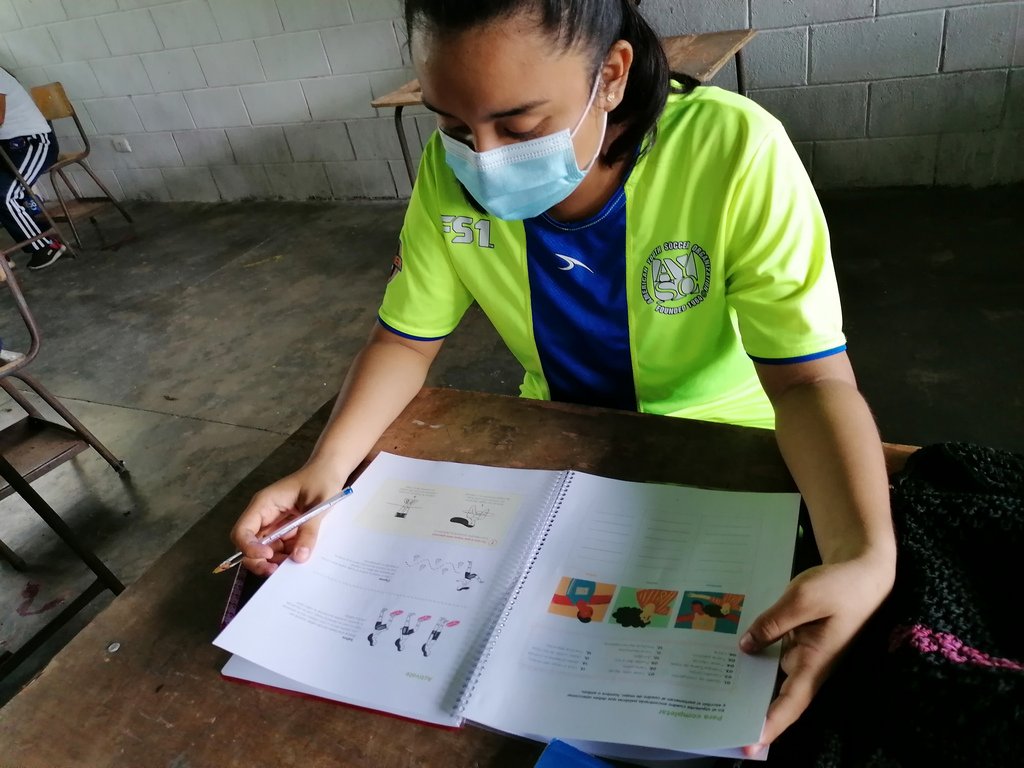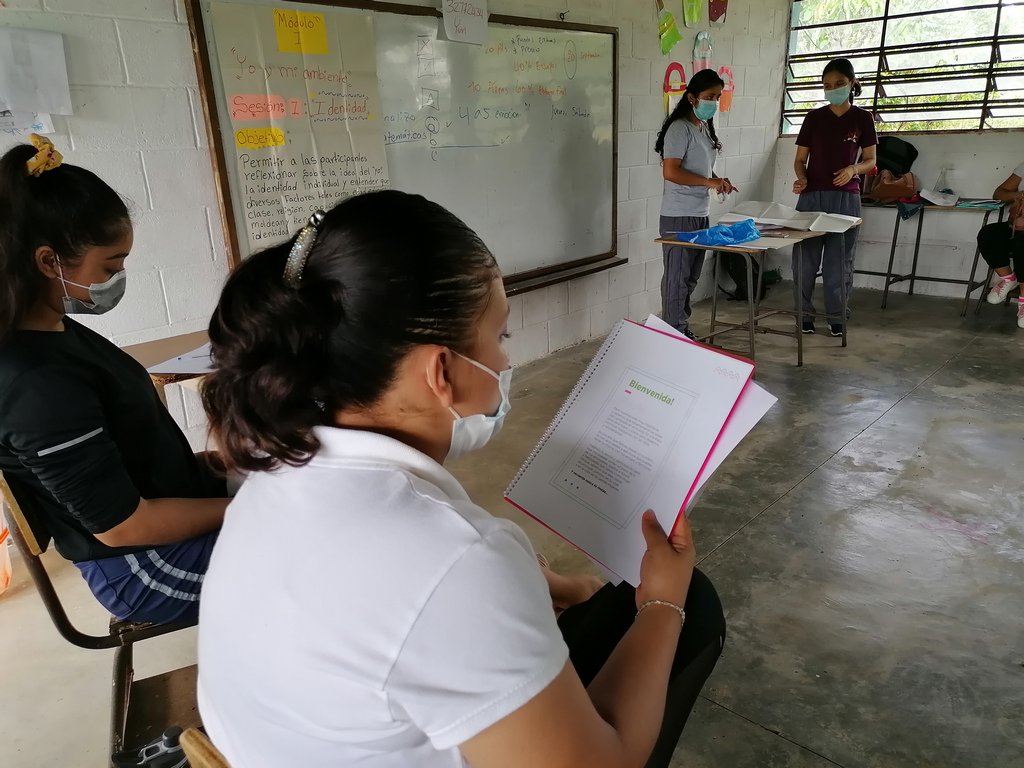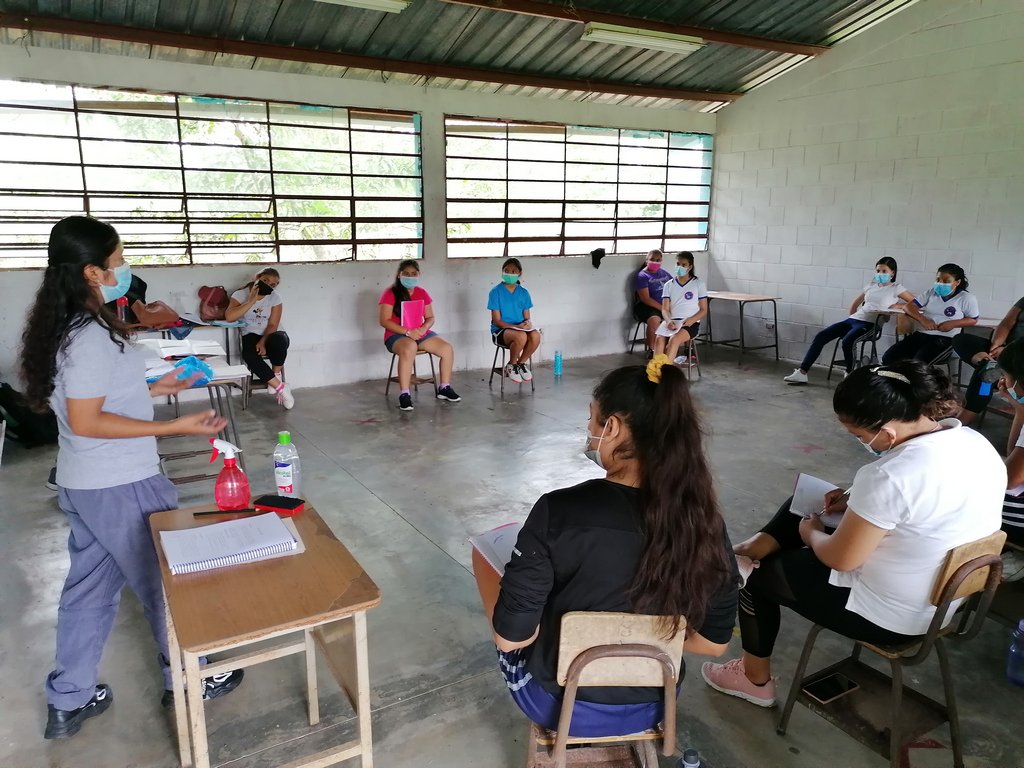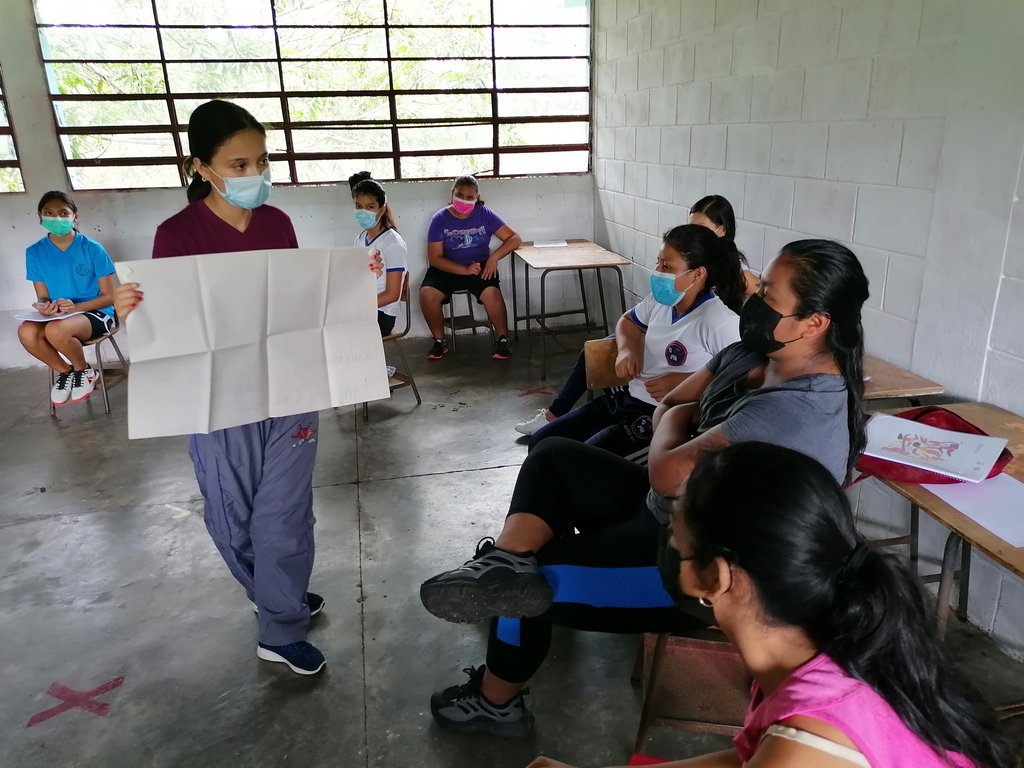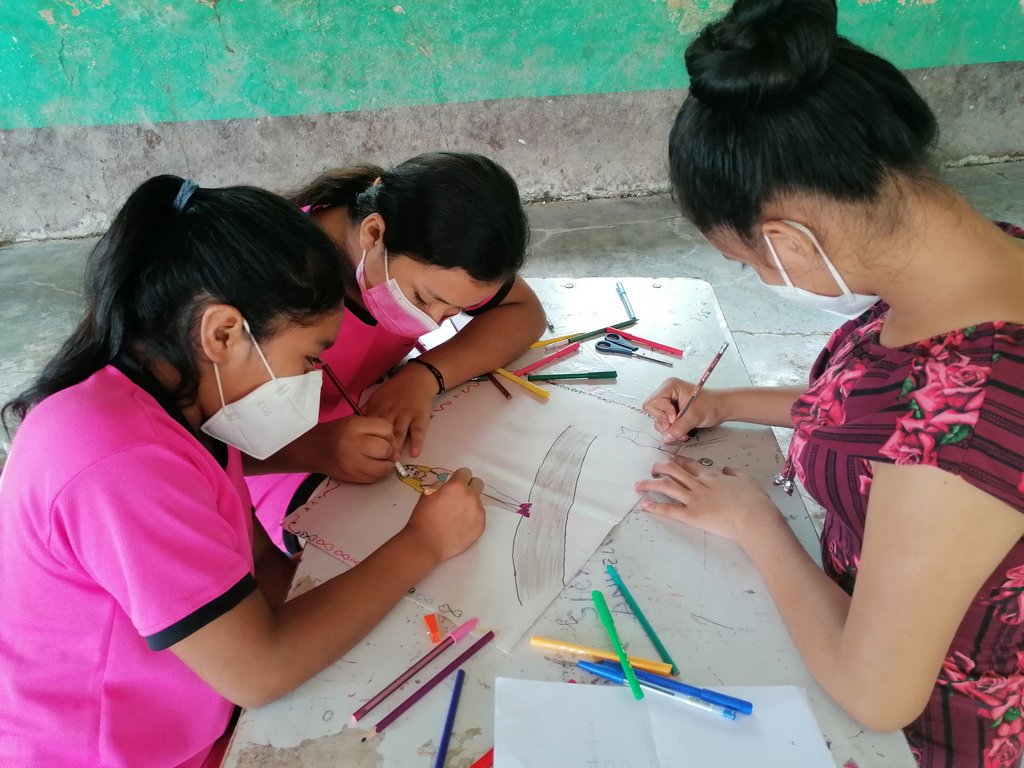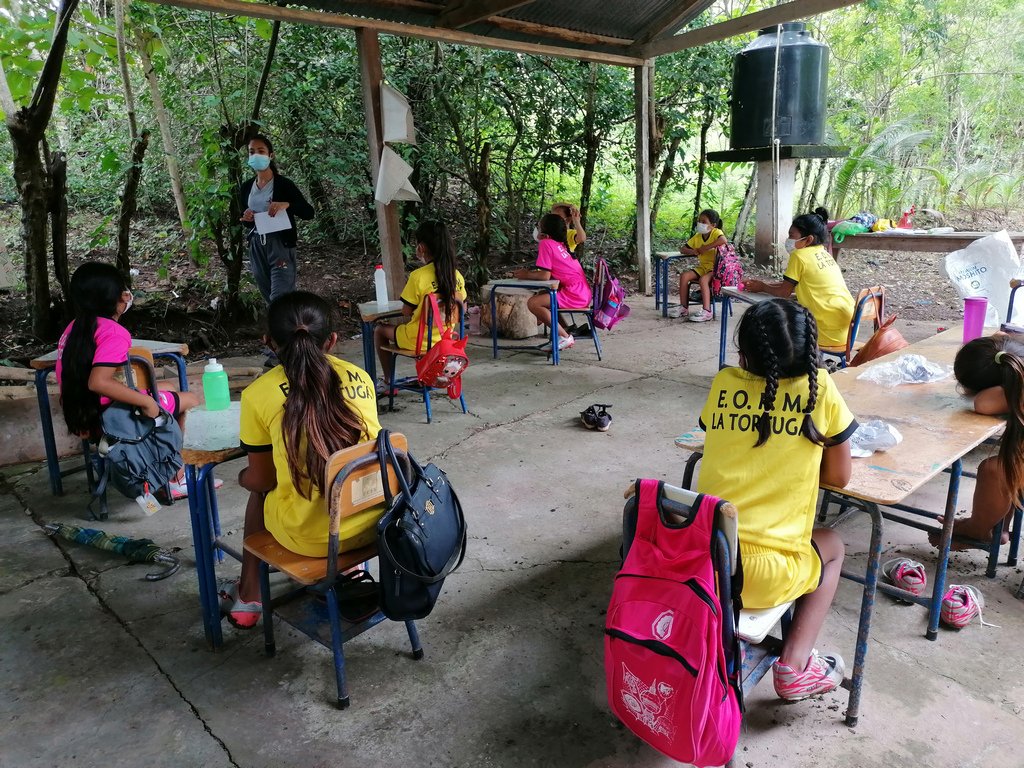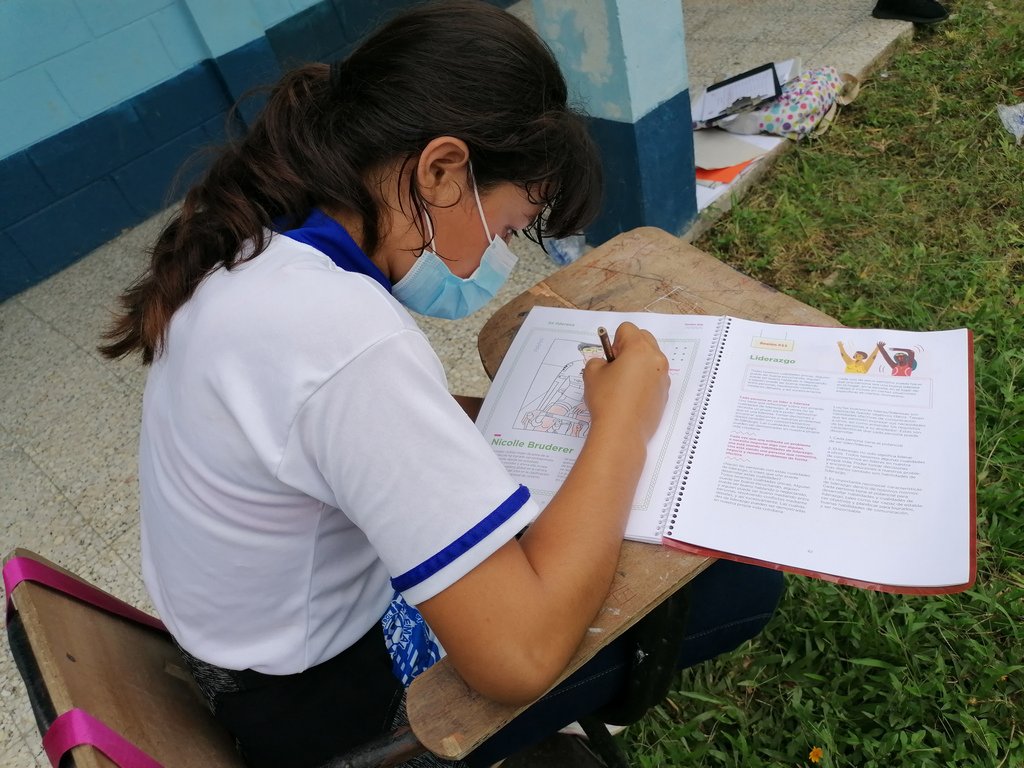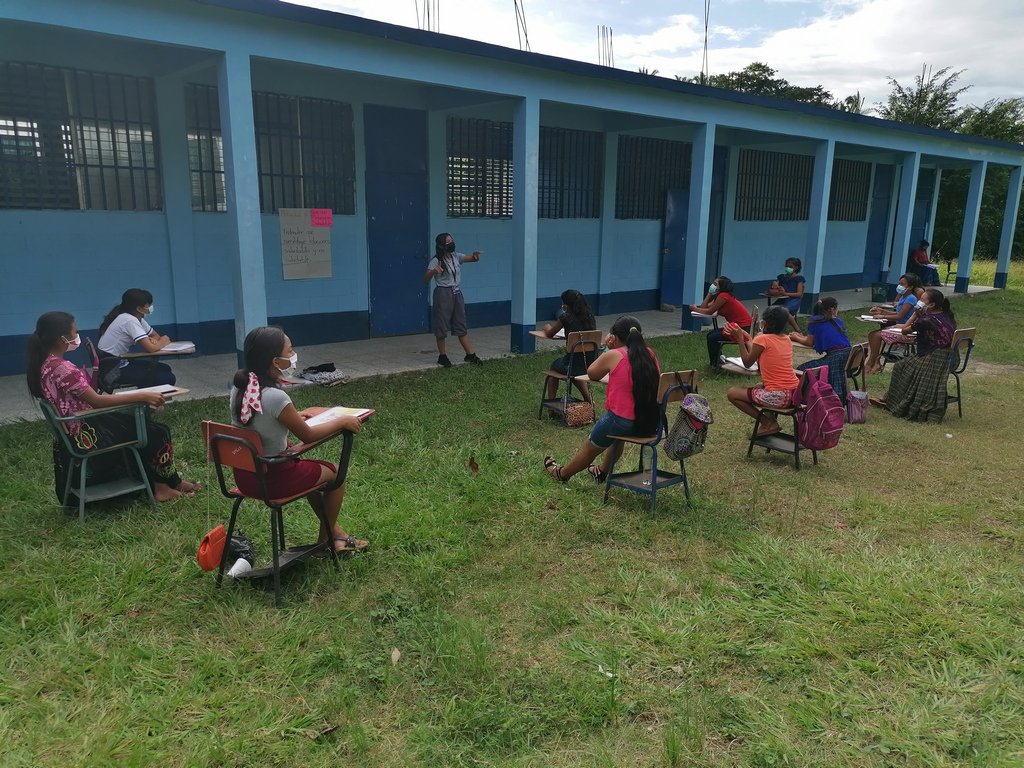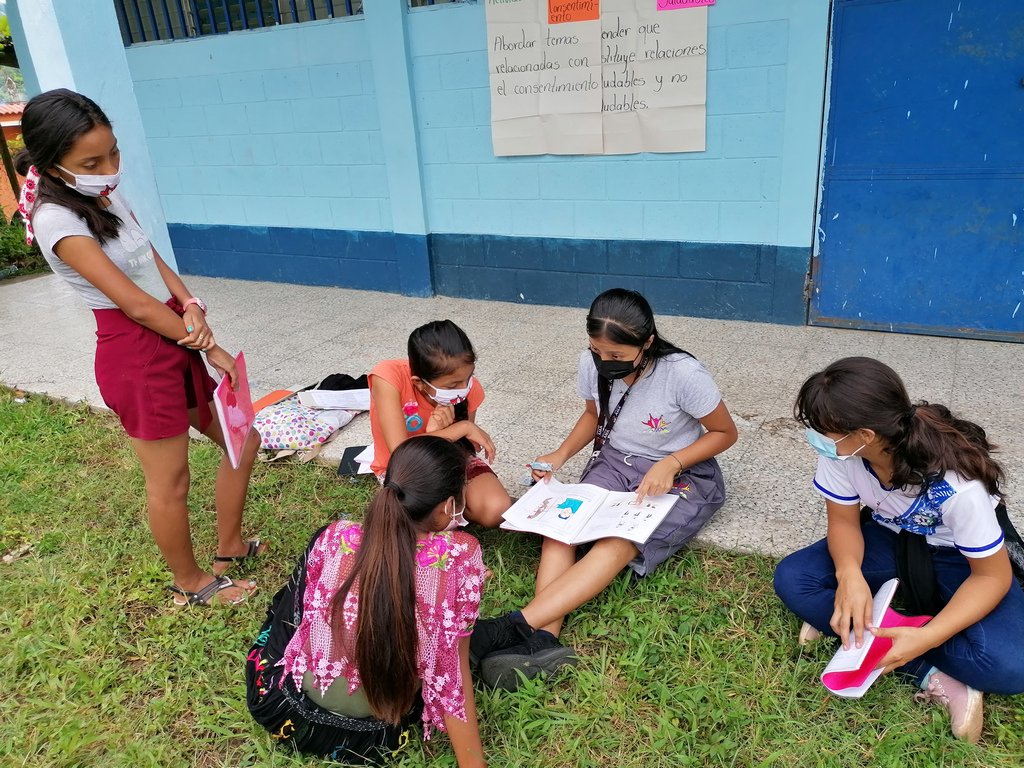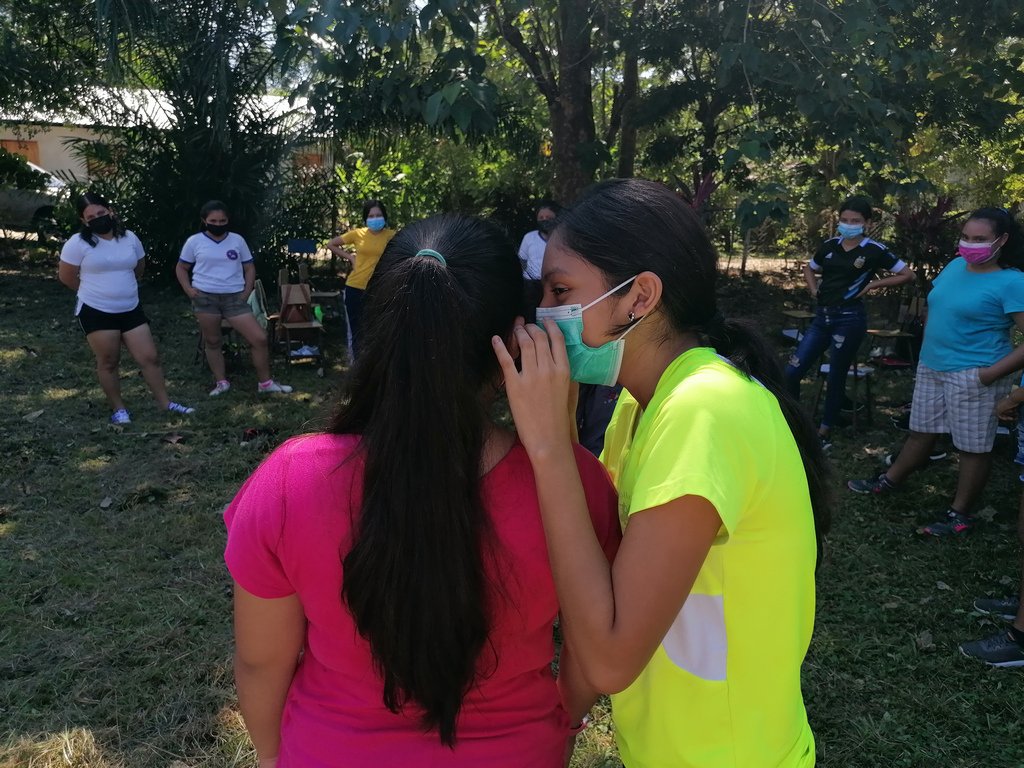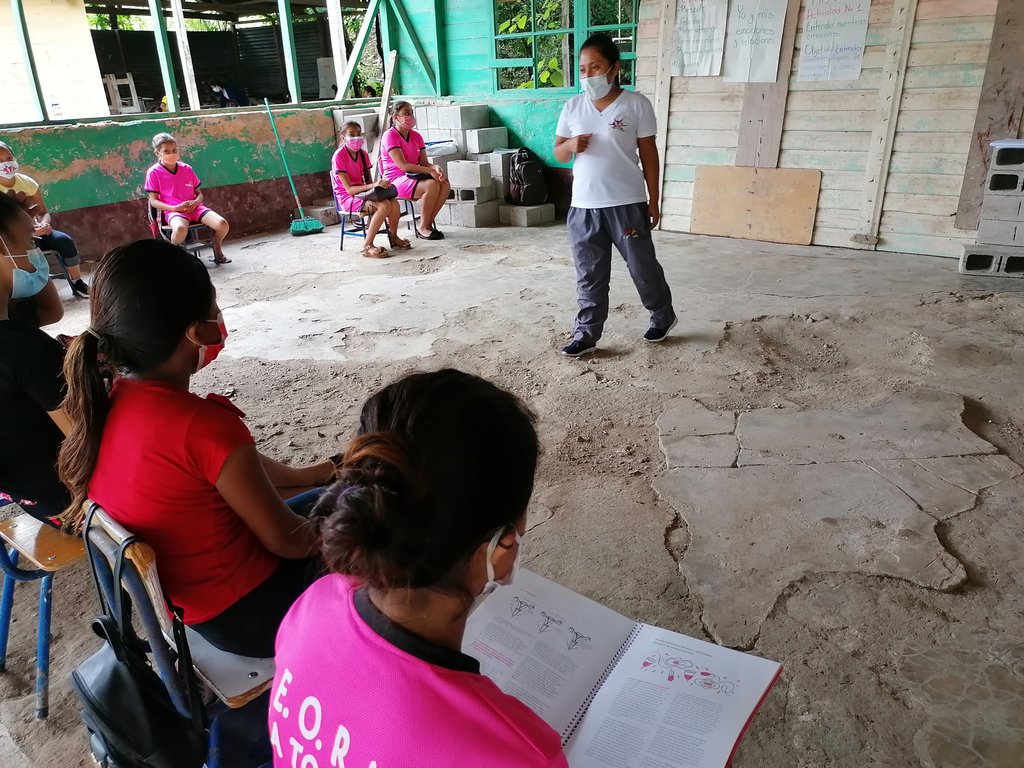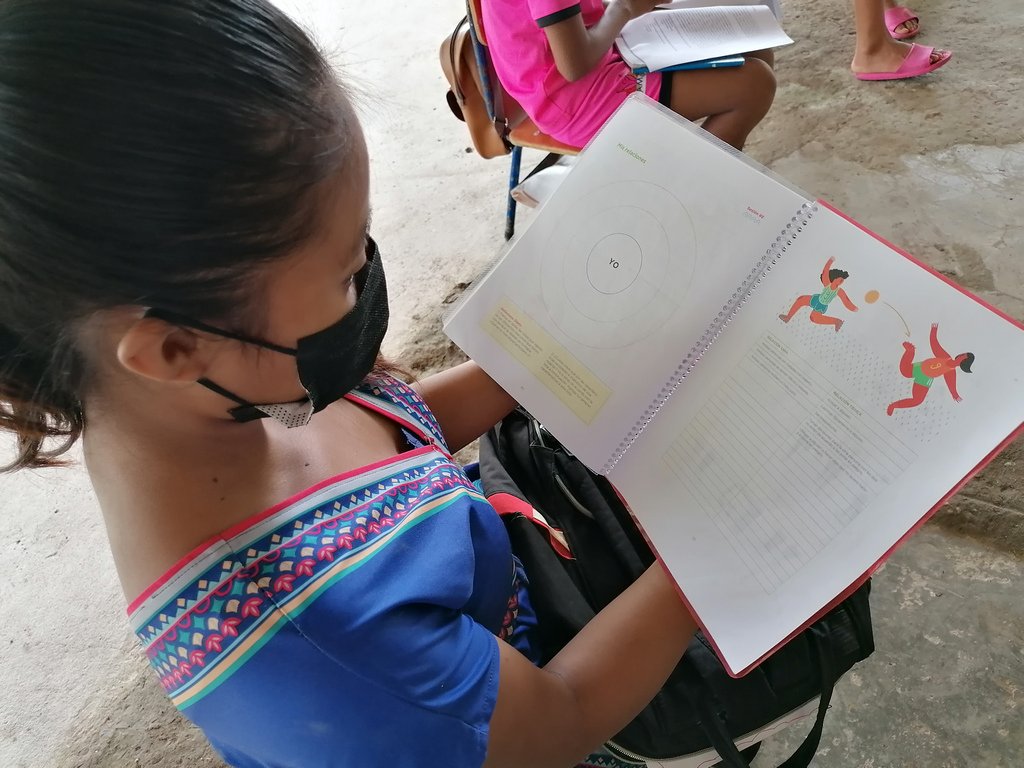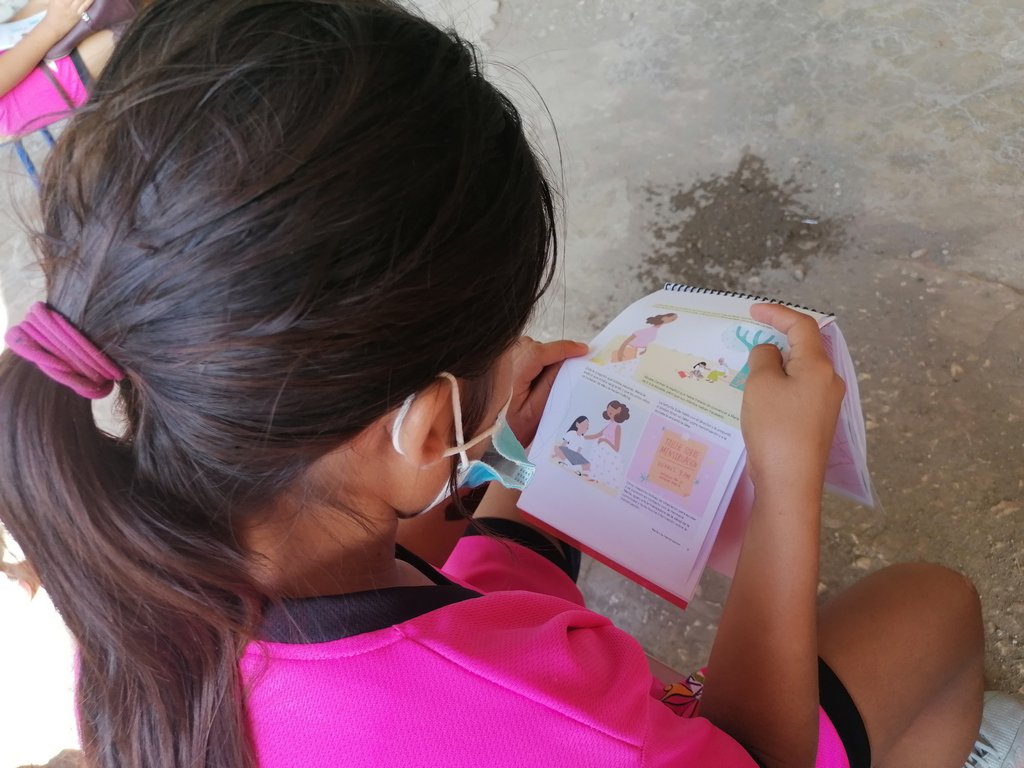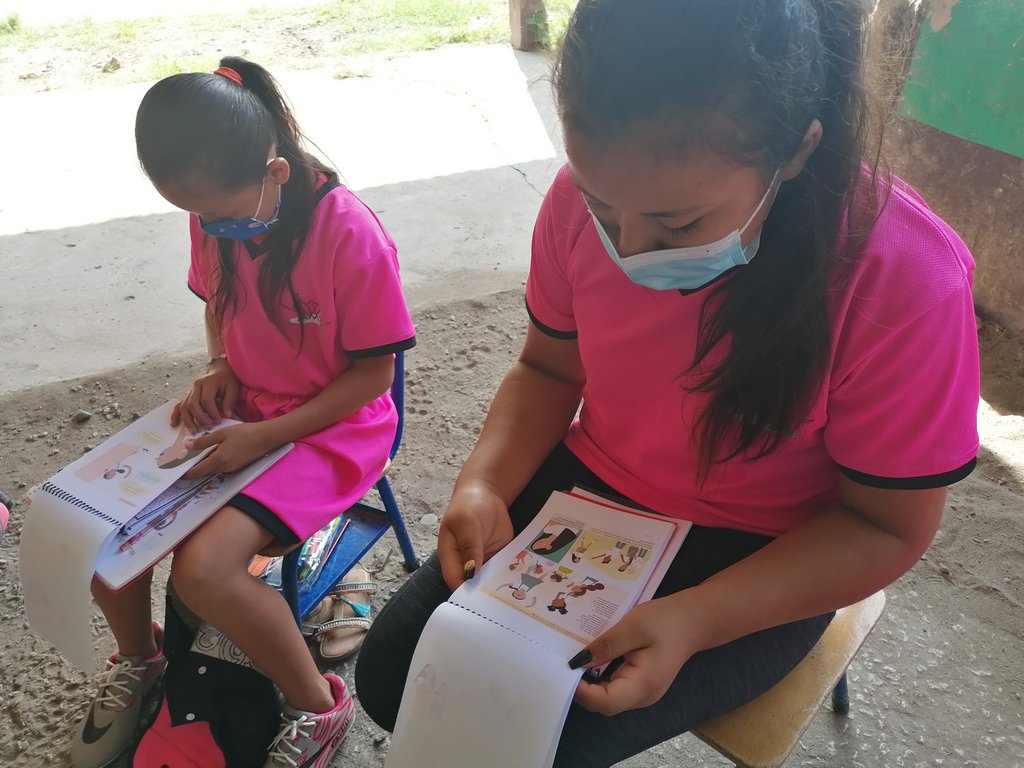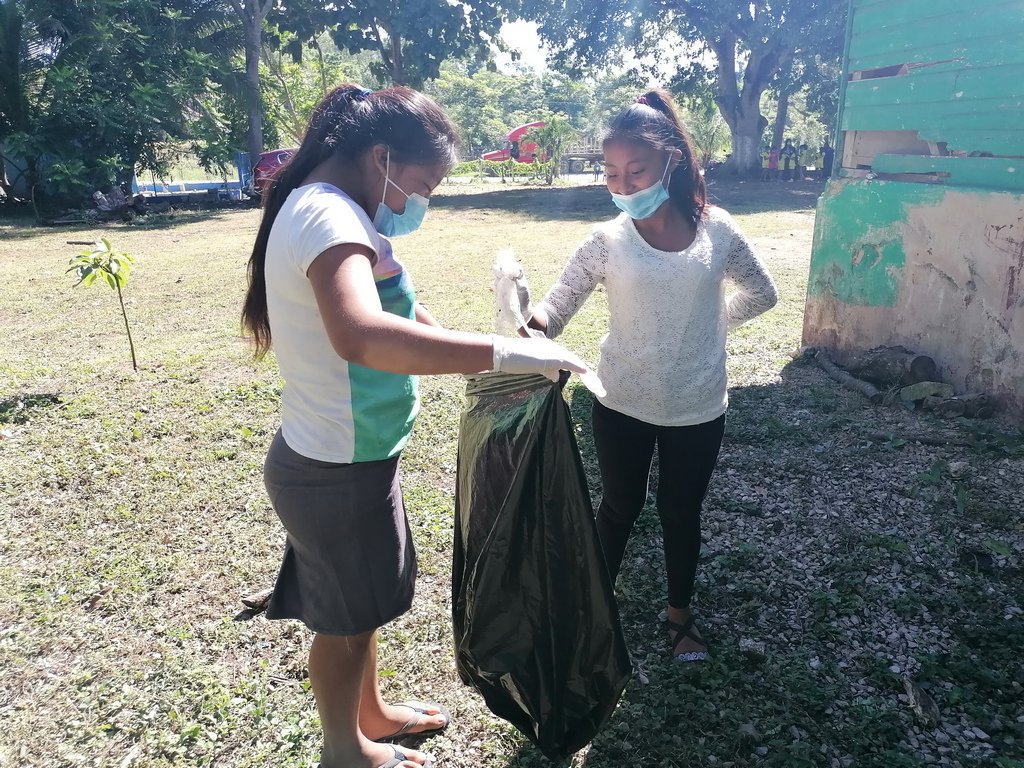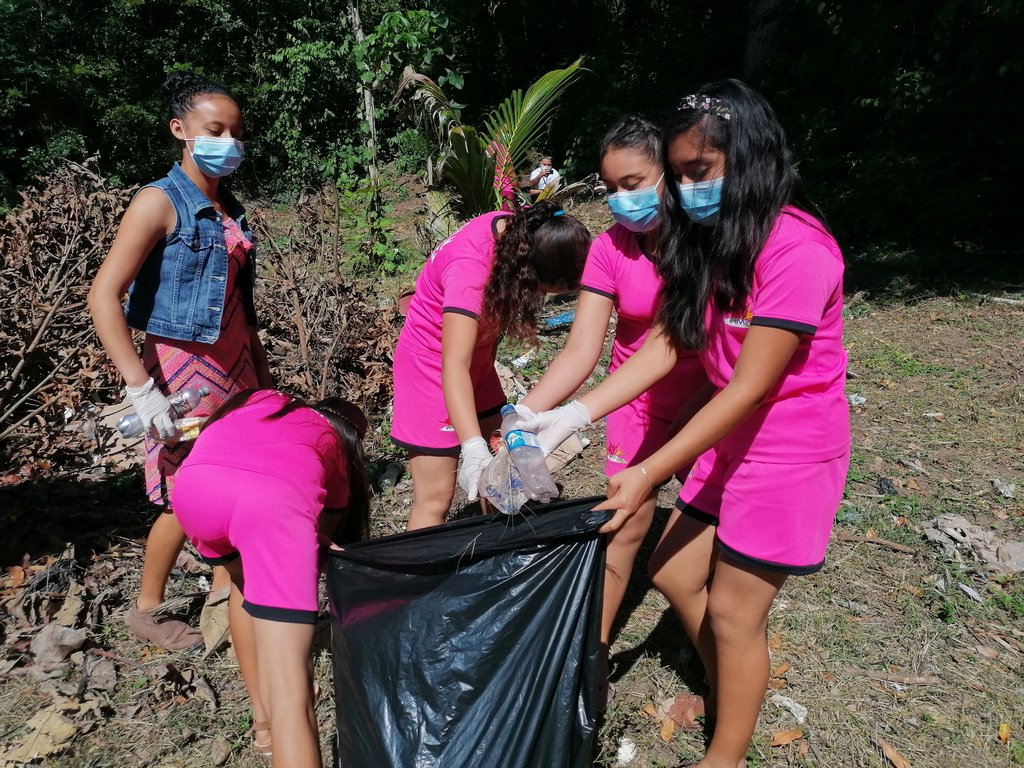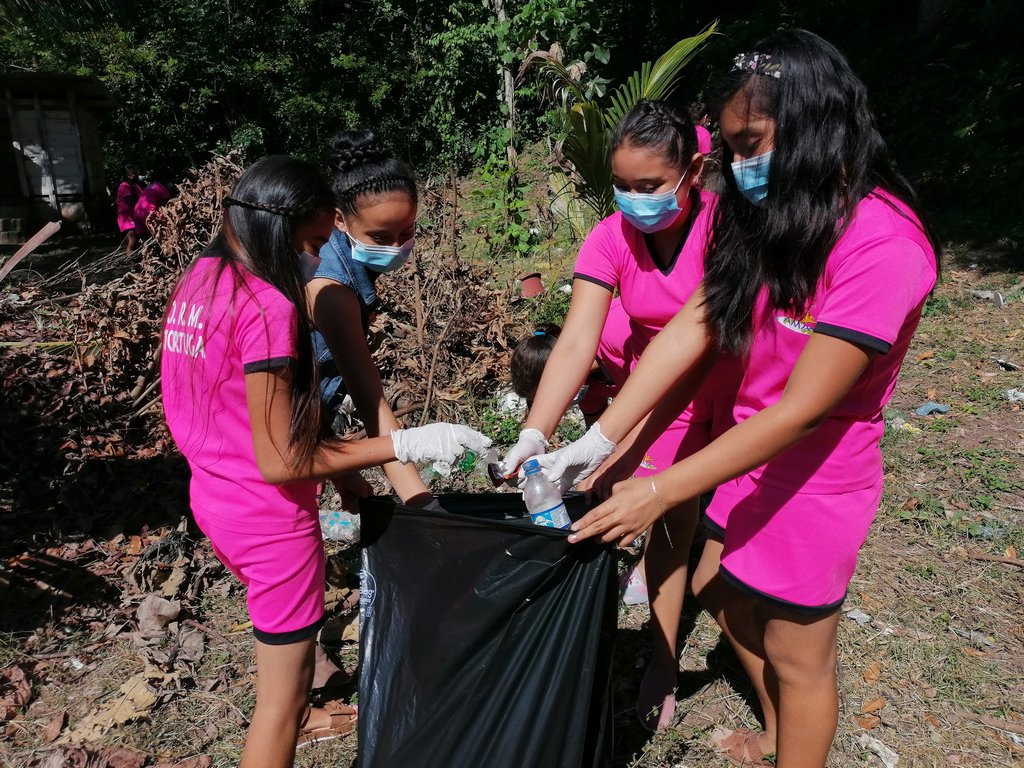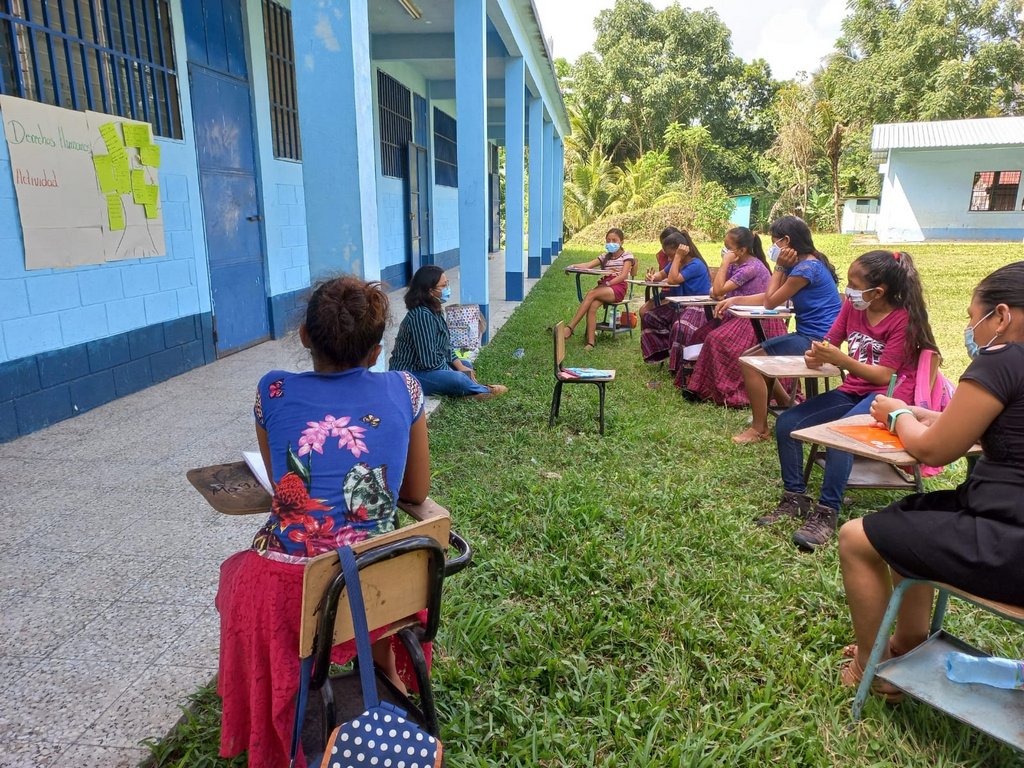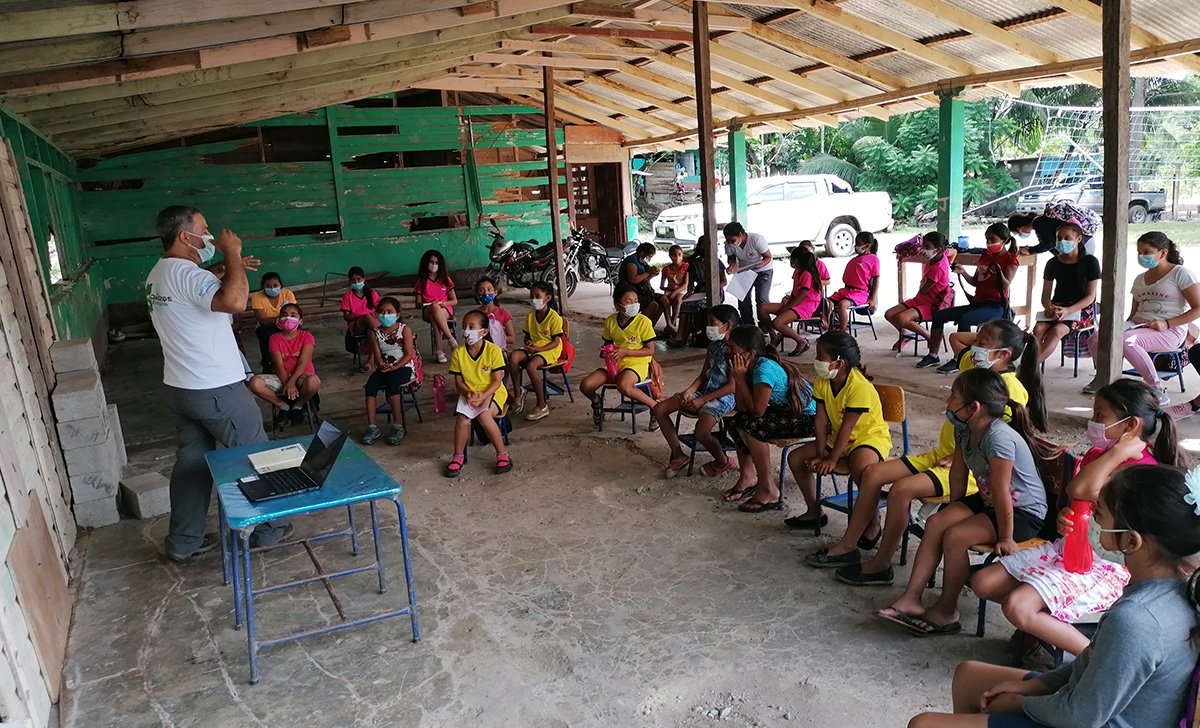
Project Name:
Play It Forward and PACE Girls (2021)
Start date: April/2021
End Date: November/2021
113 volunteer girls
The Play It Forward and PACE Girls project was developed during the pandemic, thus its original idea was adapted to the context of COVID-19 in Guatemala. In this sense, the project focused on strengthening life skills, leadership development, and sports practice (soccer) for 113 new girls aged 9 to 13 years, of Maya Q'eqchí and Ladino origin from three primary schools in Southern Petén, Guatemala.
Additionally, the project included activities to strengthen food security, nutrition, access to COVID-19 prevention supplies, menstrual hygiene, and health. It also supported AMA's organizational resilience during the economic crisis caused by the pandemic.
The project was carried out in partnership with the Departmental Directorate of Education (DIDEDUC) of Petén, Women Win, and the Summit Foundation. It was implemented using a hybrid methodology, combining face-to-face and remote work. The following activities were carried out:
Activities 2021
Four workshops were held to strengthen sports methodologies in youth football and refereeing, aimed at eight coaches. Through these workshops, knowledge about techniques and methodologies for working with girls was continued to be strengthened and updated. It is worth mentioning that eight coaches were trained, but only seven are implementing the program, and of these, two are bilingual in Spanish and Maya Q'eqchí.
The workshops were developed by coaches from the “Tigrillos” Football Club, who are certified by the Guatemalan Football Federation for the implementation of football programs in various youth categories. They currently have a football team in the second division of the national football league.
The four workshops on strengthening sports methodologies in youth football and refereeing were divided into two theoretical and two practical sessions, each lasting six hours. The practical workshops were held at the Los Pinos Neighborhood Football Field, Poptún, Petén.
The “Tigrillos” Football Club is a semi-private club based in the municipality of Poptún. It promotes the practice of football in different youth categories in the Petén department, and AMA Association has approached them for sports advice.
It is very important to mention that in the introductory meeting, it was agreed that the Club would facilitate the four strengthening workshops, for which they would cover 50% of the costs of the fees earned by the coaches of said Club.
Three coordination meetings were conducted with the educational community to discuss the back-to-school program and COVID-19 biosafety protocols. Participants included pedagogical advisors, principals, teachers, parents, and the AMA Association. One of these meetings, scheduled at El Reformador School in Poptún, was suspended due to a high COVID-19 infection rate.
The meetings served to socialize the project results and observe behavioral changes in adolescent girls. Improved relationships between parents, mothers, and daughters were noted, especially in the study and review of educational materials. The girls' self-esteem was enhanced through soccer practice and physical activities. Furthermore, topics such as menstruation and physical changes were addressed, areas where many girls had previously lacked knowledge.
Parents expressed economic concerns due to COVID-19 and the Eta and Iota storms, leading to the early distribution of food bags and hygiene kits. Teachers noticed increased participation and academic performance in girls who attended reinforcement classes in groups, four days a week.
In the third meeting, the program's achievements were communicated, and its closure was planned. Mothers thanked the AMA Association and Women Win for the positive impact on the girls, including increased confidence and awareness of their rights. Teachers also observed improvements in the girls' knowledge and participation, thanks to interactive sessions, workbooks, and sports.
With the reduced COVID-19 risk and the transition to a yellow traffic light in San Luis, MINEDUC allowed in-person classes with biosafety measures. It was agreed to hold a closing ceremony, with logistics handled by teachers and participation from mothers and educational authorities.
Sixteen interactive training sessions from the PACE Girls program and Soccer Sessions were conducted in each of the three participating schools, with the active and physical participation of 113 adolescent Maya Q'eqchí and mestizo girls, averaging 11 years of age, from three primary schools in the hamlets of La Tortuga, La Cumbre, and Actelá Nuevo Horizonte, San Luis, Petén. In the first session, each participant received the PACE-Girls program workbook and took the Pre-test for the program.
In the PACE Girls program Pre-tests, it is evident that the girls lean towards thoughts that women should stay at home for household chores and childbearing, due to a lack of knowledge about their rights and as a result of the patriarchal and machismo system in which they have lived. This also results in a lack of knowledge about their bodies and the physical changes they are experiencing or will experience, such as menstruation and its cycle, exposing them to a difficult transition from childhood to adolescence and, to a certain extent, early pregnancies and sexual violence.
Additionally, a physical assessment of the girls was conducted as part of the “Play Forward” program, including trunk extension and flexion tests, abdominal tests, vertical jump tests with momentum, slalom tests with and without a ball, and tests on with and without a ball. The purpose was to measure the girls' capabilities in sports, highlighting that they lack self-confidence in physical activities, showing insecurity in handling, kicking, and playing with the ball. This is considered to be due to the focus on household chores rather than sports practice, as sports are deemed a male activity.
This is particularly evident among girls from La Cumbre, who are mostly Maya Q'eqchí, compared to those from La Tortuga and Actela Nuevo Horizonte, who are primarily mestizo. This shows that indigenous girls have fewer educational and sports opportunities, and the program aims to strengthen their knowledge and enhance their leadership and sports skills.
The soccer sessions, parallel to the PACE-Girls sessions, lasted two hours each and were conducted on the soccer fields and green areas of each participating school. They focused on developing coordinative skills, basic knowledge of the sport, and fostering leadership, self-esteem, body appreciation, teamwork, among other things.
The sessions lasted five hours, of which three hours were used for addressing the thematic modules of the PACE-Girls program. They were conducted by seven Q'eqchí and mestizo trainers using an interactive-deductive “learning-by-doing” methodology. This made the teaching-learning process practical, enjoyable, and also fostered the development of thought.
Within the framework of the International Day Against Human Trafficking and as part of session #5 of the PACE-Girls program, a human trafficking prevention activity was conducted with the girls from the three schools. They joined the “Blue Heart” Campaign, which is part of a strategy to include information on some of the forms of human trafficking regulated in the Guatemalan penal code, such as:
- The sale of people
- Forced or servile marriage
- Extraction and trafficking of human organs and tissues
- Recruitment of minors for organized criminal groups
- Forced pregnancy
- Pornography
During the activity, the adolescent girls committed to fighting against human trafficking, early pregnancies, and gender equality.
In session #6, the “Blue Heart” campaign was strengthened by incorporating a delegate from the Secretariat Against Sexual Violence, Exploitation, and Trafficking of Persons (SVET) for Southern Petén. This delegate conducted a workshop on human trafficking crimes and distributed mini guides on internet safety to all the girls. This activity replaced the formation of the girls' advisory committee.
Three Vision Health Days (one per school) were organized for the girls, teachers, and mothers in partnership with the Vincent Pescatore Eye Clinic Association.
These days were free of charge and consisted of conducting eye exams to detect potential visual problems in the participants, such as myopia ("The child does not see objects in the distance clearly."), hyperopia ("The child has a blurry perception of close objects."), and astigmatism ("The child perceives a distorted vision of objects, both near and far.").
Vision Health Days Three Vision Health Days (one per school) were organized for the girls, teachers, and mothers in partnership with the Vincent Pescatore Eye Clinic Association. These days were free of charge and consisted of conducting eye exams to detect potential visual problems in the participants, such as myopia ("The child does not see objects in the distance clearly."), hyperopia ("The child has a blurry perception of close objects."), and astigmatism ("The child perceives a distorted vision of objects, both near and far."). In La Cumbre, three participants, and in Actela Nuevo Horizonte, five participants were identified with visual problems. They were referred to the Vincent Pescatore Clinic in Poptún for more comprehensive studies to determine their specific issues. According to the initial diagnosis, they need prescription glasses. If necessary, Vincent Pescatore will provide the exams for free, glasses at social prices, and with a 50% discount.
Addressing these visual issues is crucial for improving the girls' quality of life, as vision is fundamental to their learning. Approximately 80% of socio-educational development takes place through the eyes during the first 12 years of life. Changes in vision can occur without parents realizing it. Therefore, keeping up with classes requires constant visual demand, meaning daily attention to explanations on the blackboard, quick reading and comprehension, studying, doing homework, and possibly participating in extracurricular activities, playing, or doing sports. Consequently, the Vision Health Days have become an important activity of the program.
Three deliveries of groceries and hygiene kits were made to adolescent girls at primary schools in the hamlets of La Cumbre, La Tortuga, and Actela Nuevo Horizonte, San Luis, Petén (one delivery per school). This was aimed at strengthening food and nutritional security, as well as menstrual hygiene and COVID-19 prevention among the adolescent girls and their families participating in the program.
The arrival of Tropical Storms Eta and Iota added to the difficulties already faced by adolescent girls and women in Guatemala, which had been intensified by the COVID-19 pandemic, especially in rural, indigenous, hard-to-reach communities living in poverty, like those targeted by the “Play Forward and PACE Girls” program.
The cost of the basic food basket in Guatemala increases yearly and is higher than the minimum wage. Additionally, the arrival of the Eta and Iota storms and the Coronavirus had an impact on the finances of Guatemalans, increasing the cost of basic household products, as reported by the National Institute of Statistics (INE). The monthly cost is estimated at Q3,615.00 (USD 488.51), leading to many Guatemalan households not consuming all the necessary food products for proper human development and increasing poverty rates.
Incomes related to the informal market and sale of basic grains also decreased, affecting the families of the program participants. Most families living in poverty survive on their harvests, a part of which they sell in the informal market. This situation was further exacerbated by the arrival of the Eta and Iota storms in Guatemala, which affected the communities in the Petén department, resulting in many crops being lost, thus intensifying the lack of access to food and nutritional security for adolescent girls, women, and their families. This has led to an increase in malnutrition cases in Guatemala. UNICEF reports that 49.8% of children suffer from chronic malnutrition, meaning one in two children, placing Guatemala first in Latin America and sixth in the world in terms of child malnutrition. In essence, the arrival of Tropical Storms Eta and Iota, along with COVID-19, intensified the risks and inequalities faced by Guatemalan adolescent girls and women, with the poorest, indigenous, and rural ones being the most vulnerable, who are the focus of the AMA Association’s work.
Twelve educational videos about the PACE Girls program and sports were created to strengthen the teaching and learning process of adolescent girls and their families participating in the “Play Forward and PACE Girls” program.
The videos were produced by the program's trainers and sent to the directors and teachers of the three participating schools, who distributed them to the parents of the girls in the program. They were also published on the AMA Association's Facebook and Instagram Fanpage, significantly extending their reach. The videos empowered a larger number of adolescent girls and young women, showing an engagement of 5,000 to 10,000 people in a day (according to statistics from AMA's Facebook Fanpage).
Focused on the modules of the PACE Girls program and the methodological guides of the “Play Forward” program's sports sessions by the AMA Association, these videos helped strengthen and continue the program's process. They also kept the adolescent girls and their families active, as the videos were viewed in family settings.
Additionally, these videos were sent to adolescent girls and young women participating in the PACE Girls and PACE Women programs conducted by the AMA Association, involving 102 adolescent girls and 42 young women from Southern Petén.
This initiative helped foster sports practice at home, as the COVID-19 pandemic made it difficult for adolescent girls to go out to play in football fields or green areas. The sports videos motivated exercising at home, complementing the exercises in the workbooks, further encouraging them to stay active. The girls reported that this helped them stay active, feel healthy, and relieve anxiety and stress caused by the confinement during the pandemic.
A 4x4 Pickup truck was acquired using a portion of the funds allocated for the program. This partial funding covered the cost of the vehicle, which was essential for AMA to carry out field activities.
Due to the pandemic, the AMA Association changed much of its work methodologies and transfer of capabilities to adolescent girls and young women. Before the pandemic, AMA conducted its activities in the municipality of Poptún, where participants would travel from their communities to the urban case of the municipality. With the arrival of the pandemic in Guatemala, this methodology was changed, as it is now necessary for the AMA team and supplies to be transported to the participants' communities of origin, to avoid exposing them to COVID-19 infections.
In this regard, the acquisition of the vehicle has been of great importance and has strengthened AMA's response during the pandemic. It is worth mentioning that the communities where AMA focuses its work are distant and difficult to access, making it necessary to have the vehicle, especially one with double traction, to enter communities where roads are in poor condition.
The vehicle was purchased thanks to the support of the program and the contributions from the organizations Global Fund For Women and Global Fund For Children.
To continue promoting gender equality and to ensure that adolescent girls are aware of a day dedicated to highlighting and addressing the challenges they face, as well as to promote their empowerment and the fulfillment of their human rights, the International Day of the Girl was commemorated with participants of the “Play Forward and PACE Girls” program.
During the sports sessions of the program, a series of games and activities were conducted to strengthen their leadership, teamwork, build trust among them and self-confidence, develop creativity, learn to interact with others, learn to respect rules, and of course, to have a moment of great joy and fun.
The following activities were included:
- Sack Races
- Caterpillar Races
- Balloon Popping
- Piñata Breaking
A mobile unit from the Human Rights Ombudsman's Office in Poptún, Petén, visited adolescent girls from the hamlet of La Cumbre, San Luis, who participated in the "Play Forward and PACE Girls" program.
During the visit, the participants received information about their Human Rights, how to file complaints in case of violations of their human rights, and the Rights of Migrant People, as these are the functions performed by the Procumóvil.
The girls of La Cumbre were visited due to efforts made by the AMA Directorate and because this community is located on the route leading from Petén to Guatemala City and other departments. This route is used by migrants heading towards Belize, Mexico, or the United States. It is crucial for adolescent girls and their families to be empowered about their rights and those of migrants, as well as to understand the reasons for migration.
This is of great importance as there has been an increase in the flow of migrants, including adolescent girls, especially from El Salvador and Honduras, heading towards the United States. These migrants have been criminalized due to a strong campaign of disrepute that has arisen.
Migrants have faced confrontations with the Guatemalan army and police, who do not let them pass and trivialize their situation. It is necessary to make the Guatemalan population aware that migrants are rights-bearing individuals and are merely passing through, so they are not necessarily a danger.
Furthermore, due to changes in U.S. immigration policies, the adolescent girls participating in the program are also exposed to the possibility of migration. Therefore, it is essential for them to be aware of their rights. This activity significantly strengthened the teaching and learning process they received through the program. At the end of the visit, the participants were empowered with knowledge about their Human Rights and those of Migrant People, enhancing their understanding.
As part of the "Play Forward and PACE Girls" program, two diploma courses on environmental conservation and natural resources were developed in partnership with the Ministry of Environment and Natural Resources (MARN) of Petén. This program is called “Guardianes Ecológicos” (Ecological Guardians).
The workshops for the diploma were held in four sessions, each lasting thirty minutes, conducted after the interactive training and football sessions with the adolescent girls from La Tortuga and Actela Nuevo Horizonte, San Luis, Petén. The course was facilitated by the MARN Educator in Petén.
The “Guardianes Ecológicos” diploma is a MARN initiative aimed at strengthening and disseminating the principles of environmental education, focused on adapting to climate change, promoting mechanisms for the mitigation of greenhouse gases, and managing the risk of socio-environmental disasters.
The diploma targets young people between 13 and 18 years of age, strengthening personal and collective capacities for integral environmental management through training workshops that develop social, cultural, and environmental content.
- The Diploma is divided into four training modules:
- Self and Environmental Awareness
- Ecology, Environment, and Climate Change
- Supporting a Green Surrounding
- Social Participation
Given that the Petén department is rich in natural resources yet already experiencing the effects of climate change, particularly impacting water access due to environmental pollution caused by humans, it was deemed appropriate to develop this process with the adolescent girls participating in the "Play Forward and PACE Girls" program.
Water access affects the entire family, but girls and women bear the brunt of securing this resource for their homes, often walking long distances as water sources become more distant. It is essential for adolescent girls and their families to value and take actions to mitigate the effects of climate change.
In line with this, the diploma included a reforestation initiative and a cleanliness train to teach participants the importance of forests and not littering, as trash ends up in rivers, the main water source in their communities.
These two actions, reforestation and waste collection, were proposed by the adolescent girls who, through consensus, identified these activities as beneficial for their communities. MARN provided seedlings, bags, and gloves for trash collection, which was later transported to the municipal landfill of San Luis, Petén.
The comics titled "Anxiety and Stress" and "María and Menstruation" were bound by the team of the AMA Association. These comics were then distributed to the 113 adolescent girls participating in the PACE Girls program across three schools, significantly enhancing the teaching and learning process.
The comics were well received by the participants, who were observed reading them before the sessions and in their free time, discussing the contents among themselves, and consulting with the trainers about the content and whether they could share it with their siblings and friends at home and in the neighborhoods. The comics were undoubtedly of interest, pleasure, and liked very much by the adolescent girls.
Results Achieved 2021
- Workshops for Strengthening Sports Methodologies
Workshops were held for eight indigenous and mestizo coaches from the AMA Association, who benefited from training on sports methodologies, enhancing their skills in this area. - Interactive Training and Soccer Sessions
Training sessions were organized for 113 adolescent Maya Q'eqchí and mestizo girls, averaging 11 years of age, from three primary schools in the hamlets of La Tortuga, La Cumbre, and Actelá Nuevo Horizonte, San Luis, Petén. - Educational Videos
Educational videos on life skills and sports were distributed to 450 adolescent boys and girls from the three participating primary schools, further enriching their learning experience.
Food Supplies and Hygiene Kit Delivery
The indirect beneficiaries include the 113 families of the young indigenous and mestizo women who participated in the project, and they benefited from the delivery of basic food baskets and personal hygiene supplies that were provided to the participants.
Volunteering:
113 adolescent Maya Q'eqchí and mestizo girls, averaging 11 years of age, from three primary schools in the hamlets of La Tortuga, La Cumbre, and Actelá Nuevo Horizonte, San Luis, Petén, Guatemala.
Participated in the Play It Forward and PACE Girls program and Resilience AMA Association. The development of activities, worksheets in the modules and workbook, clearly demonstrated the evolution the girls experienced during the thematic and sports sessions.
After systematizing the pre and post-test questionnaires, significant improvements in the girls' knowledge were observed. At the start of the program, pre-test results showed a 53.5% understanding of life skills and girls' rights.
After completing the program, the results of the post-test show a 97.83% knowledge level regarding life skills and girls' rights. Additionally, there is a 97.7% recognition of the importance of sports as a tool for developing life skills.
Here are the average results for the Pre-Test and Post-Test in physical fitness: Pre-Test for Trunk Flexion had an average of -5.49, and the Post-Test had 5. Pre-Test for Trunk Extension had an average of 21.31, and the Post-Test had 30.09. Pre-Test for Abdominals had an average of 5.74, and the Post-Test had 13. Post-Test for Push-ups had 2.63, and the Post-Test had 7.79. Post-Test for Vertical Jump with Impulse had 9.86, and the Post-Test had 15.91. Post-Test for Slalom with and without a ball had 1.54, and the Post-Test had 3.01. Pre-Test for Dribbling with and without a ball had 1.22, and the Post-Test had 4.39.
The previous results yield an average of 5.28 in the Pre-Tests and 11.31 in the Post-Tests, indicating significant growth in sports skill development throughout the process.
During the PACE program, significant changes were observed in the behaviors and mindsets of the participating girls. Initially, many of them had the perception that their future was limited to traditional domestic roles, but as the sessions progressed, they began to recognize their right to have dreams and career goals beyond marriage and motherhood.
There were significant improvements in communication and relationships among girls from different grades and sections. They learned to work as a team and include each other in group activities. Additionally, they developed leadership skills, increased their self-confidence, and actively participated in the proposed activities.
The girls acquired knowledge about identity, violence in its various forms, and the importance of recognizing healthy and unhealthy relationships. They began to apply this knowledge in their personal and family relationships. There was also an increase in their self-esteem and body acceptance, which was reflected in their participation in sports, particularly in soccer.
The post-questionnaire results showed a significant increase in learning, especially in the girls from the La Cumbre community, where the use of the mother tongue and cultural relevance strengthened the educational process. The younger girls exhibited a higher degree of learning than the older ones.
Regarding sports, the girls improved their sports skills and knowledge, including football techniques and game understanding. They increased their participation and leadership in sports activities, and mothers were attentive and proud of their daughters' progress in sports.
Teachers recognized the importance of sports in the girls' development, noting improvements in their behavior and organization. Teacher support was crucial, as they attended all sessions despite it not being mandatory.
The project coaches improved their management of sports methodologies, including adapting the methodology to the pandemic restrictions. Methodological guides were adjusted to avoid physical contact and maintain distancing, leading to innovation in both thematic and sports methodologies.
The donor who funded this project



